The 15 Best Star Trek Books Ever Written
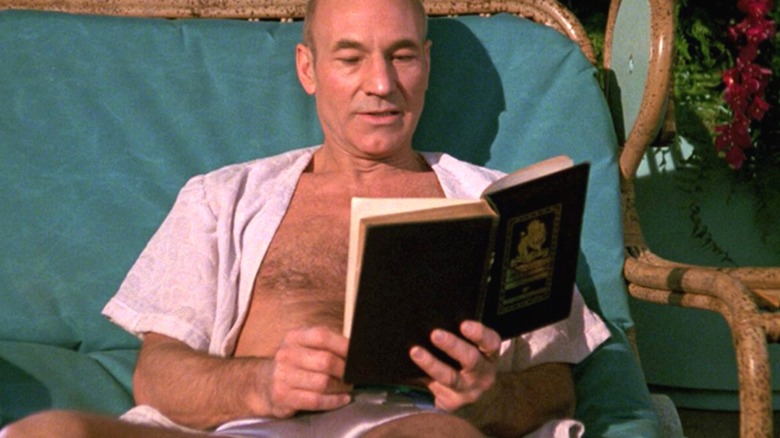
Like all our favorite franchises, "Star Trek" is a multimedia phenomenon. Today's kids grow up in a world full of TV series, movies, comics, games, and, of course, tie-in novels. "Star Trek" novels are notable because they're non-canon by default, and that's allowed their writers to go ham while exploring strange new worlds. Some of these earliest tie-in writers went on to become science fiction titans, and sometimes those titans like to return for more Trekkie fun.
"Trek" books are also a unique part of the fandom experience. "Star Trek: The New Voyages" was a licensed, two-book anthology, printed in the late '70s and curated from fanfiction. Wilder still, in 1985, writer Della Van Hise saw her "Star Trek" novel "Killing Time" published and recalled for an edited reprint as longtime fans realized their beloved slash fiction pairing of Kirk and Spock was no longer hiding in the shadows. It's a goofy testament to how fans helped "Star Trek" thrive in the first place, and today, these tie-in novels are still great comfort food. These are 15 of the best that I've found, read, and loved over the years.

A Stitch in Time by Andrew Robinson
Elim Garak isn't special to "Star Trek" fans alone. He's also part of actor Andrew Robinson in a unique way. The charming-yet-wily Cardassian tailor (and spy) called Deep Space Nine his home, but Garak's too big a personality to be contained by its steel corridors (or with a word from Dr. Bashir, his unlikely best friend.) Robinson grew him that way from the start, creating an in-character diary to guide him through Garak's behavior. Garak's diary, however, took on a life of its own as Robinson made readings from it part of his convention appearances. Eventually, Robinson was coaxed into turning it into a novel.
"A Stitch in Time" is epistolary, presented as a series of letters sent by Garak to Dr. Bashir in the wake of the Dominion War. Contained within are fragments of Garak's childhood, memories of a long-ago love, and preparations for the future. The greatest compliment I can offer is that every word drips with Robinson's genteel drawl. No one else could have written this novel, and it's the perfect love letter from an actor to the character he brought to life.
Imzadi by Peter David
"Imzadi" was rereleased in 2003, packaged with its sequel and listed as "Imzadi Forever." By all accounts, the follow-up is a fine tale, but I haven't read it. My recommendation is for the original 1992 release, which I eagerly bought in hardcover. Like another upcoming Peter David selection, "Imzadi" has a complicated timeline, but the emotional thread and David's clean prose make the plot easy to follow.
The word "imzadi" is first used in "Encounter at Farpoint," telepathically sent to Riker by Troi. However, it's author Peter David who expands on the power of the Betazed term for "beloved." The word refers not to a teen's first love but to something richer and deeper. The novel explores Riker's and Troi's early relationship through the lens of a distant, alternate future in which Troi is dead, and Riker is a bitter old cuss. Obviously, nobody wants a future like this one, but the Guardian of Forever, that magical archway from classic "Star Trek," has our backs. The return of this sentient space rock is always a selling point, but the story also has all the political twists and turns a Trekkie could want.
How Much for Just the Planet? by John M. Ford
John M. Ford was one of the best, most underrated writers of the modern era. Until recently, almost all of his work had fallen out of print with his death in 2006. Most of his catalog is still pretty hard to find and requires trawling used bookstores with an eye for treasure. Unfortunately, that includes 1987's "How Much for Just the Planet?" It's Ford's second "Star Trek" novel, and it's a "Dr. Strangelove" -style artifact of perfect absurdity.
"How Much for Just the Planet?" is a surreal sci-fi mélange: Take the crew of the Enterprise, pit them against opportunistic Klingons, and add a previously undiscovered planet full of untouched dilithium. Then, mix in a troupe of truly incomprehensible, goofball aliens, slap everybody in a hotel (with a golf course — it's a plot point), and make them play in a "Squid Game"-style competition that focuses on heists and ballroom dancing instead of murder. The goal is friendship and having some good laughs along the way.
Spock Must Die! by James Blish
The first original "Star Trek" novel is still a good read and a great place to get some context for the ways "Trek" fiction has evolved. "Spock Must Die!" feels fresher than its 1970 print date in many places, but bear in mind, it plays with some "exotic sexuality" tropes regarding Spock. Yeah, he was definitely the unlikely sex symbol of original "Star Trek," but Blish's prose occasionally takes that to a funky place.
Otherwise, this book does introduce some neat concepts way before later "Star Trek" wore them out. The evil clone plot line is a groaner staple now, but Blish's novel twists it up with some unsettling fridge logic questions about how the transporter room could work with some mad science drive. From there, the science is pretty pulpy, but the high-stakes thrills leading up to the title drop — a Spock does have to die — make for a nice, cozy ride through an earlier science fiction era.
Q-Squared by Peter David
Like most "Star Trek” tie-ins, "Q-Squared" isn't canon, but it's close enough to an assumed truth that fans have kind of adopted it anyway. It's a three-lane timeline pileup, and this time, it is a little confusing. It makes sense for there to be some confusion over what the hell is going on because this book brings in John de Lancie's omnipotent trickster, Q . And it's not a Q story unless everyone (including Picard) asks, "What the hell is going on?" at least once.
In this case, what the hell is going on is a tantrum thrown by a young Q whom "Trek" fans know as Trelane, the Squire of Gothos. A longtime "Star Trek" favorite, Trelane was a quirky, omnipotent brat that futzed around with Kirk and his buddies until his family pulled him in line at the end of the episode . David's novel draws on the fan-inspired retcon that this classic character is actually a Q ( a speculation John de Lancie also shares ) and ties it all together in a messy bow. It doesn't always make sense, especially the semi-metaphorical sword fight finale. Still, it's a great trip through the fringes of the Continuum.
Spock's World by Diane Duane
Author Diane Duane is a modern treasure. Her "Young Wizards" fantasy series remains one of the best ways to hook a kid on the dreams hidden inside books. Still writing and still a part of fandom today, she also wrote 1988's "Spock's World," one of the first and best books to dig into the social intricacies and history of Vulcan.
The framing narrative deals with a fledgling separatist movement working to pull Vulcan out of the Federation, and it provides a chance for Spock and his family to take the spotlight. It's a great political yarn, and it pulls on some threads from classic "Trek" episodes, most notably "Amok Time." However, the real meat here is the intricate world building with lingering glimpses of major moments in Vulcan history. It's a great reminder that what makes "Star Trek" so special are the worlds it explores. Although "Spock's World" is not canon, Duane's graceful creation continues to influence other "Star Trek" creators .
The Last Best Hope by Una McCormack
With the debut of every new "Star Trek" TV series, you can rest assured that a swath of new tie-in novels are in the works. Obviously, the tie-in tradition continued with "Picard." The first novel based on Jean-Luc's solo outing was published within a month of the show's premiere. "The Last Best Hope" is a prequel to " Picard ," and it does a solid job of fleshing out a number of connections that the first season didn't get a chance to work on.
Though a lot of the novel is devoted to Raffi , the troubled intelligence officer we grow to love on the show, it's the glimpses of Romulan culture that stand out. The religious order introduced in the show, the Qowat Milat , are in sharp focus here and help round out the childhood of Elnor , our orphaned Romulan Legolas. "The Last Best Hope" has another trait that may make it attractive to fans of the show: Until "Picard" contradicts it, this book is currently as close to actual canon as a "Star Trek" novel can be.
Star Trek: The Eugenics War by Greg Cox
It's easier to refer to this bulk recommendation as "The Khan Trilogy." The first two novels are formally titled "The Eugenics War: The Rise and Fall of Khan Noonien Singh" ( volumes one and two , respectively), and the third is "To Reign in Hell: The Exile of Khan Noonien Singh." The trilogy is two parts covert war thriller and one part survivalist nightmare. All together, it pieces together the complete life of one of the mightiest (and bare-chestiest) foes in "Star Trek" history .
"The Eugenics War" is a look inside the doomed effort to prevent that legendary conflict from ever happening. As mentioned in the classic episode "Space Seed," eugenicist science created a social schism the likes of which Marvel's Magneto barely dreamed of. The effort to stop Khan from dominating Earth fails, but infighting eventually drives the tyrant into exile. The events of "Space Seed" happen after the first two books, and the final novel sees Khan struggle to survive on Ceti Alpha V , the sandy death-world we discover in "The Wrath of Khan," surrounded by loyalists and scarce resources. Great stuff.
The Final Reflection by John M. Ford
My prior John M. Ford recommendation may have the spotlight, but don't pass up "The Final Reflection" if you can find it. While not as richly built as Diane Duane's "Spock's World," Ford's book treats Klingons with such detail and complexity that it went on to affect later portrayals of the proud warrior race. It's a book that's occasionally lauded as a "Star Trek" novel that stands on its own as a great work of science fiction, which is a backhanded compliment that ignores the love and passion of "Trek" writers. Nevertheless, that is an accurate assessment here.
The focus of the book is on Klingon Captain Krenn, whose decades-long effort to prevent his own people from destroying the Federation remains a secret until he pens his own chronicle of events. During his career, Krenn flickers in and out of the lives of the characters we know, with special emphasis placed on his encounter with Spock as a child. There's some hefty focus on Klingon stratagems in the early part of the novel, which can be daunting for the reader, but the journey is worth it.
Fallen Heroes by Dafydd ab Hugh
"Fallen Heroes" is a sentimental choice. It's one of my gruesome comfort food books. Pairing the horrific invasion of DS9 with a time-shifted mystery, the novel puts Quark and Odo together as ad hoc detectives trying to stop the massacre of their friends from happening. It's not a perfect tale, and, coming back to it later, it misses some character tone due to how early in the show's airing it was published. Still, it's a good yarn from a time when we were starved for stories that put our best frenemies together.
Author Dafydd ab Hugh has a gift for crunchy, visceral action sequences, and that got him a pretty decent gig writing "Doom" tie-ins in the '90s. It's best to go in with the reminder that, according to the classic "Star Trek” fiction trope, our heroes will be alright by the end, but there's some gnarly road before this book gets there. "Fallen Heroes," like many older tie-in novels, is easily found used.
Q-In-Law by Peter David
Peter David gets on this list three times because, along with his clean prose and keen understanding of the franchise, he also understands what a fan would kill to see. "Star Trek: The Next Generation" has an embarrassment of riches when it comes to great recurring characters, and two fan favorites take the spotlight in "Q-In Law." The omnipotent Q is a guaranteed good time, but adding Deanna Troi's dramatic mother Lwaxana to the mix makes for a salty popcorn festival.
The premise is simple: Noticing that the Enterprise is ready to host a wedding, Q shows up with mischief on his mind. Lwaxana arrives for the diplomatic event, and Q picks up on the Betazed noble's talent for chaos. However, for once in his life, Q gets more than he bargained for when he flirts with Lwaxana. Somewhere in the mayhem, Worf notes the crew might as well sell tickets to watch it all fall apart. I recommend tracking down the audiobook . It's narrated by John de Lancie and Majel Barrett-Roddenberry (Q and Lwaxana themselves), and they happily go all in on the verbal sparring.
Prime Directive by Judith and Garfield Reeves-Stevens
The Prime Directive is one of the few immutable tenets of the "Star Trek” universe. However, Starfleet General Order 1 is not without its flaws. To wit, no Starfleet command or crew is to interfere with the development of an alien society. It's a Cold War product that was designed by minds worried about escalation and accidental destruction. Judith and Garfield Reeves-Stevens' "Prime Directive," published in 1990, digs into what happens when that order is disobeyed.
In both the original series and the movies, Kirk and his crew rarely receive lasting consequences for their actions. This novel sets about dismantling that trope. Kirk, in charge of observing Talin IV, a world on the cusp of first contact, seems to accidentally violate the Prime Directive. Worse, his mistake devastates the developing Talin society. From Kirk to Uhura, the command crew of the Enterprise see their careers ended for their failure. The bulk of the novel is the long process of the crew (who have either resigned, been demoted to ensign, or court-martialed) seeking out what actually went wrong on Talin IV. The answers are complex, and the ethical questions are thought-provoking.
Sarek by A.C. Crispin
Author A.C. Crispin was a key figure in not only helping readers understand that tie-in novels shouldn't be dismissed as "amateur" content but also in protecting other writers from being scammed. Her talents as a writer provided light but intricate stories. "Sarek" (not to be confused with the phenomenal "Next Generation" episode of the same name ) is a rich look at one of "Star Trek's" most complicated figures .
"Sarek" is a political thriller tempered by Sarek's sometimes cold Vulcan discipline. A veiled threat from an unknown alien race aims to unbalance the core of the Federation. Balanced against these high stakes is the famed Vulcan ambassador's wife's illness. Amanda Grayson 's humanity helped both Sarek and Spock bridge their two worlds. However, her impending loss threatens to undo the peace father and son forged years ago. In the book, Amanda's journal provides empathetic glimpses inside Sarek's life. "Sarek" is a novel as crucial as "Spock's World" for fans of the iconic Vulcans.
Uhura's Song by Janet Kagan
Uhura 's popularity was a big deal for television back when "Star Trek" first came on the air. Unfortunately, moments in which she took the lead were all too rare. By 1985, Uhura was still a supporting character on screen, but now, she had a couple of novels that gave her some more in-depth attention. "Uhura's Song" is the best and, frankly, the weirdest slice of fanfic-style glory to make it to the printed page.
Long ago, Uhura made friends with a woman named Sunfall of Ennien, a diplomat from the planet Eaiaou, whose love of dance and song outlived her when a deadly pandemic decimated her world. However, there's a clue in the songs Sunfall taught Uhura that might help end the pandemic before it wipes out the whole planet. This is where I have to warn you that this strange and lovely novel is basically "Warrior Cats” in space. Yes, the people of Eaiaou are cat people — with emphasis on the cat side of that equation. Shut up! It's awesome!
Metamorphosis by Jean Lorrah
This last pick is going to be a divisive one. Jean Lorrah 's "Metamorphosis" is a chunky book that lags in a few places, but it does two things well enough to get a sentimental recommendation: First, though non-canon, the book picks up after "Measure of a Man," the "Next Generation" episode that gave Data legal protection as a sentient lifeform and explores the ethical aftermath in a way that's catnip to me. Second, the novel makes the acerbic Dr. Pulaski somewhat likable and empathetic. Now, that's an achievement!
Although there's a handful of plot threads going on in this large, lumpy novel, the biggest one is Data's temporary tenure as what he's wanted to become all along — a fleshy human (with all that entails). As anyone who rolls out of bed to the symphony of their bones cracking could tell the android, it's not all it's cracked up to be. Still, he persists in a weird kind of hero's journey, and although everything is set back to baseline by the end, the trip is one of a kind.
The Best Sci Fi Books
Find a great science fiction book, 25 best star trek books.

As one of the most popular franchises in movie and TV history, Star Trek is not lacking for extensive and thoughtful source material.
As of November 2019, approximately 850 novels, short story anthologies, novelizations, and omnibus editions have been published.
Star Trek books are often ignored (sometimes rightly so) by review sites like Kirkus Reviews and Publishers Weekly , so you’ll have to decide for yourself if a certain book sounds like your cup of Earl Grey tea (hot).

Section 31, the covert organization which has operated without accountability in the shadows for more than two centuries, has been exposed. Throughout the Federation, the rogue group’s agents and leaders are being taken into custody as the sheer scope of its misdeeds comes to light. Now Starfleet Command must decide the consequences for numerous officers caught up in the scandal—including Admirals William Ross, Edward Jellico, Alynna Nechayev, and Captain Jean-Luc Picard who, along with many others, are implicated in the forced removal of a Federation president.
Meanwhile, deep in the distant, unexplored region of space known as the Odyssean Pass, Picard and the crew of the starship Enterprise must put aside personal feelings and political concerns as they investigate a massive mysterious spacecraft. Adrift for centuries in the void, the ship is vital to the survival of an endangered civilization which has spent generations searching for a world to sustain what remains of its people. Complicating matters is a band of marauders who have their own designs on the ancient ship, with only the Enterprise standing in their way….

The ancient Thallonian Empire has collapsed, throwing an entire sector of the galaxy into chaos and unrest. Billions of sentient beings are faced with starvation, warfare, and worse. Faced with a tragedy of interstellar proportions, Starfleet assembles a new, handpicked crew to help where it can and report what it finds.
Captain Mackenzie Calhoun, recommended by Jean-Luc Picard himself, takes command of the USS Excalibur , which is manned by Starfleet’s best and brightest (including some familiar faces from the Next Generation series).

They are a race of warriors, a noble people to whom honor is all. They are cousin to the Vulcan, ally to the Klingon, and Starfleet’s most feared and cunning adversary. They are the Romulans—and for eight years, Federation Agent Terise LoBrutto has hidden in their midst.
Now the presence of a captured Starfleet officer forces her to make a fateful choice—between exposure, escape, maintaining her cover, or saving the life of Dr. Leonard McCoy.

Spock’s mother, Amanda Grayson, is dying. Spock returns to the planet Vulcan where he and Sarek enjoy a rare moment of rapprochement. But just as his wife’s illness grows worse, duty calls Sarek away, once again sowing the seeds of conflict between father and son. Yet soon Sarek and Spock must put aside their differences and work together to foil a far-reaching plot to destroy the Federation, a plot that Sarek has seen in the making for nearly his entire career.
The crew of the USS Enterprise journeys to the heart of the Klingon Empire where Captain Kirk’s last surviving relative has become a pawn in a battle to divide and conquer the Federation. With Sarek’s help, the crew of the starship Enterprise learns that all is not as it seems. But before they can prevent the Federation’s destruction, they must see the face of their hidden enemy, an enemy more insidious and more dangerous than any they have faced before.

The USS Enterprise is on a peaceful mission at Starbase 12 when a bizarre cosmic phenomenon causes a Klingon ship to suddenly vanish—with Spock aboard for the ride. Spock’s last message from the Klingon ship is cryptic and frightening. The Klingons are traveling into the past, searching for the one man who holds the key to the future. If they can kill that man, the course of history will be changed—and the Federation will be destroyed!

“Fifteen years ago…you led us out of the darkness. You commanded the greatest rescue armada in history. Then…the unimaginable. What did that cost you? Your faith. Your faith in us. Your faith in yourself. Tell us, why did you leave Starfleet, Admiral?”
Every end has a beginning…and this novel details the events leading into the Star Trek TV series, introducing brand-new characters featured in the life of Jean-Luc Picard—widely considered to be one of the most popular and recognizable characters in all of science fiction.

Starfleet’s most sacred commandment has been violated. Its most honored captain is in disgrace, its most celebrated starship in pieces, and the crew of that ship scattered among the thousand worlds of the Federation.
Spock, McCoy, and the rest of the former crew of the Starship Enterprise to Talin, the planet where their careers ended. A world once teeming with life now lies ruined, its cities turned to ashes, its surface devastated by a radioactive firestorm, because of their actions. There, they must find out how—and why—this tragedy occurred and discover what has become of their captain.

Trelane is revealed to be a member of the Q Continuum. He taps into the power of the continuum and uses this ability to tamper with time and reality, resulting in the intersection of three different parallel universes, which are also referred to as time “tracks.”
Track A is a universe in which Beverly Crusher’s husband Jack never died, and now serves as captain of the Enterprise with Jean-Luc Picard as his first officer; in this universe, Jack’s son Wesley died as a boy and Jack and Beverly divorced.
Track B is the traditional universe depicted on Star Trek: The Next Generation .
Track C is akin to the more militaristic alternate universe shown in the Next Generation episode “Yesterday’s Enterprise,” in which the Federation is at war with the Klingons.
Q, who had been charged with the task of “mentoring” Trelane (a task each “adult” Q must accept at least once for an “adolescent” Q), enlists the help of Picard and the crew of the Enterprise -D in the three different timelines in order to teach Trelane discipline, and eventually, to stop him from destroying the fabric of the universe by collapsing the alternate universes together.

The final frontier erupts into chaos as vast quantities of a rare energy source are discovered beneath the surface of Baldur-3, a remote planet beyond the outer fringes of Federation space. Now, an old-fashioned “gold rush” is underway as a flood of would-be prospectors, from countless worlds and species, races toward the planet to stake their claim.
The galactic stampede threatens the stability of neighboring planets and space stations, as widespread strife and sabotage and all-around pandemonium result in a desperate need for Starfleet assistance. Captain James T. Kirk and the crew of the Enterprise are dispatched to deal with the escalating crisis… which lies on the other side of a famously perilous region of space known as the Antares Maelstrom.

Half a decade after the Dominion War and more than a year after the rise and fall of Praetor Shinzon, the galaxy’s greatest scourge returns to wreak havoc upon the Federation—and this time its goal is nothing less than total annihilation.
Elsewhere, deep in the Gamma Quadrant, an ancient mystery is solved. One of Earth’s first generation of starships, lost for centuries, has been found dead and empty on a desolate planet. But its discovery so far from home has raised disturbing questions, and the answers harken back to a struggle for survival that once tested a captain and her crew to the limits of their humanity.
From that terrifying flashpoint begins an apocalyptic odyssey that will reach across time and space to reveal the past, define the future, and show three captains—Jean-Luc Picard of the USS Enterprise , William Riker of the USS Titan , and Ezri Dax of the USS Aventine —that some destinies are inescapable.

In this award-winner for cheesiest title, Kirk and McCoy accompany Spock to the Vulcan Academy Hospital seeking experimental treatment for a badly wounded Enterprise crew member. Spock’s mother is also a patient in the hospital, and Kirk soon becomes involved in the complex drama of Spock’s family.
Suddenly, patients are dying, and Kirk suspects the unthinkable—murder on Vulcan! But can he convince the Vulcans that something as illogical as murder is possible? Until the Killer is caught, everyone is in danger!

Five thousand years ago, on the planet Sarpedion, Spock knew a beautiful, primitive woman. When the USS Enterprise is called upon to protect the Guardian of Forever, a mysterious time portal, Spock uses it to journey to the past, and to discover his own son.

A spy for the Typhon Pact—a new political rival of the Federation—steals the plans for Starfleet’s newest technological advance: the slipstream drive. To stop the Typhon Pact from unlocking the drive’s secrets, Starfleet Intelligence recruits a pair of genetically enhanced agents: Dr. Julian Bashir, of station Deep Space 9 , and Sarina Douglas, a woman whose talents Bashir helped bring to fruition, and whom Bashir thinks of as his long-lost true love.
Bashir and Douglas are sent to infiltrate the mysterious species known as the Breen, find the hidden slipstream project, and destroy it. Meanwhile, light-years away, Captain Ezri Dax and her crew on the USS Aventine play a dangerous game of cat and mouse with a Typhon Pact fleet that stands between them and the safe retrieval of Bashir and Douglas from hostile territory.

In crystalline form, dilithium is the most valuable mineral in the galaxy. It powers the Federation’s starships and the Klingon Empire’s battlecruisers. Now on a small, out-of-the-way planet named Direidi, the greatest fortune in dilithium crystals ever seen has been found.
Under the terms of the Organian Peace Treaty, the planet will go to the side best able to develop the planet and its resources. Each side will contest the prize with the prime of its fleet. For the Federation, Captain James T. Kirk and the starship Enterprise . For the Klingons, Captain Kaden vestai-Oparai and the Fire Blossom .
Only the Direidians are writing their own script for this contest—a script that propels the crew of the Enterprise into one of their strangest adventures yet.

Aboard the starship Shenzhou , Lieutenant Michael Burnham, a human woman raised and educated among Vulcans, is promoted to acting first officer. But if she wants to keep the job, she must prove to Captain Philippa Georgiou that she deserves to have it.
She gets her chance when the Shenzhou must protect a Federation colony that is under attack by an ancient alien vessel that has surfaced from the deepest fathoms of the planet’s dark, uncharted sea.
As the menace from this mysterious vessel grows stronger, Starfleet declares the colony expendable in the name of halting the threat. To save thousands of innocent lives, Burnham must infiltrate the alien ship. But to do so, she needs to face the truth of her troubled past, and seek the aid of a man she has tried to avoid her entire life.
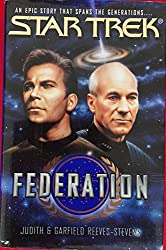
While Kirk and his crew struggle to free scientist Zefram Cochrane from captors, ninety-nine years in the future Jean-Luc Picard must rescue a mysterious individual who holds the key to the Federation’s ultimate survival.

For nearly a decade, Garak has longed for just one thing—to go home. Exiled on a space station, surrounded by aliens who loathe and distrust him, going back to Cardassia has been Garak’s one dream. Now, finally, he is home.
But home is a world whose landscape is filled with death and destruction. Desperation and dust are constant companions and luxury is a glass of clean water and a warm place to sleep.

Klingon Captain Krenn is a ruthless war strategist. But on a mission to Earth, Krenn learns a lesson in peace. Suddenly he must fight a secret battle of his own. His empire has a covert plan to shatter the Federation. Only Krenn can prevent a war—at the risk of his own life.
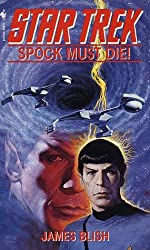
When a freak transporter malfunction during a Klingon attack creates an imposter Spock, Captain Kirk must discover how to save his friend from the machinations of his exact replica.

Hearing of the outbreak of hostilities between the United Federation of Planets and the Klingon Empire, Captain Christopher Pike attempts to bring the USS Enterprise home to join in the fight. But in the hellish nebula known as the Pergamum, the stalwart commander instead finds an epic battle of his own, pitting ancient enemies against one another—with not just the Enterprise, but her crew as the spoils of war.
Lost and out of contact with Earth for an entire year, Pike and his trusted first officer, Number One, struggle to find and reunite the ship’s crew—all while Science Officer Spock confronts a mystery that puts even his exceptional skills to the test, with more than their own survival possibly riding on the outcome.

Returning from its historic first voyage to the edge of the galaxy, the damaged USS Enterprise journeys through the Taurus Reach, a vast and little-known region of space in which a new starbase has been unexpectedly established. Puzzled by the Federation’s interest in an area so far from its borders and so near the xenophobic Tholian Assembly, Captain James T. Kirk orders the Enterprise to put in for repairs at the new space station: Starbase 47, also known as Vanguard .
As Kirk ponders the mystery of the enormous base, he begins to suspect that there is much more to Vanguard than meets the eye. It’s a suspicion shared by the Tholians, the Orions, and the Klingon Empire, each of whom believes that there are less than benign motives behind the Federation’s sudden and unexplained desire to explore and colonize the Taurus Reach.
But when a calamity deep within the Reach threatens to compromise Starfleet’s continued presence in the region, Kirk, Spock, and several key specialists from the Enterprise must assist Vanguard’s crew in investigating the cause of the disaster and containing the damage. In the process, they learn the true purpose behind the creation of Vanguard , and what the outcome of its mission may mean for life throughout that part of the galaxy.

The Enterprise is summoned to transport a dangerous criminal from Starbase prison to a rehabilitation center: brilliant physicist, Dr. Georges Mordreaux, accused of promising to send people back in time and then killing them instead.
But when Mordreaux escapes, bursts onto the bridge and kills Captain Kirk, Spock must journey back in time to avert disaster before it occurs.
Now there’s more at stake than just Kirk’s life. Mordreaux’s experiments have thrown the entire universe into a deadly time warp. Spock is fighting time, and the entire universe is closing in on itself.

On the planet Vulcan, a crisis of unprecedented proportion has caused the convocation of the planet’s ruling council, who summoned the USS Enterprise from halfway across the galaxy, to bring Vulcan’s most famous son home in its hour of need.
As Commander Spock, his father Sarek, and Captain James T. Kirk struggle to preserve Vulcan’s future, the planet’s innermost secrets are laid before the reader, from its beginnings millions of years ago to its savage prehistory, from merciless tribal warfare to medieval court intrigue, from the exploration of space to the development of o’thia—the ruling ethic of logic.
Spock, torn between his duty to Starfleet and the unbreakable ties that bind him to Vulcan, must find a way to reconcile both his own inner conflict and the external dilemma his planet faces, lest the Federation itself be ripped asunder.

Years ago, Lt. Uhura befriended a diplomat from Eeiauo, the land of graceful, cat-like beings. The two women exchanged songs and promised never to reveal their secret.
Now the USS Enterprise is orbiting Eeiauo in a desperate race to save the inhabitants before a deadly plague destroys them. Uhura’s secret songs may hold the key to a cure, but the clues are veiled in layers of mystery. The plague is killing humans, threatening other planets, and Kirk must crack the code before the Starship Enterprise succumbs.

Years before they became crewmates on the USS Enterprise , Commander William Riker and ship’s counselor Deanna Troi had a tempestuous love affair on her home planet of Betazed.
Now, as their passions have cooled, the two serve together as close friends. Yet the memories of what passed between them linger, and Riker and Troi remain Imzadi , a powerful Betazoid term that describes the enduring bond they still share.
On a delicate mission involving negotiations with an aggressive race called the Sindareen, Deanna mysteriously falls ill, and dies. But her death marks the start of an incredible adventure for Riker—an adventure that takes him across time, pits him against one of his closest friends, and forces him to choose between Starfleet’s strictest rule and the one he calls Imzadi .
9 thoughts on “ 25 Best Star Trek Books ”
Missing “Strangers from the Sky.”
Imzadi is my favorite read of the Star Trek universe. I don’t really remember how many I read, but it was a lot, mostly in Next Gen and DS9. Around the time Imzadi was published I was obsessed with the Star Trek universe and read nothing else but tie-in novels. Good times.
Would have been very disappointed had The Final Reflection not made the list. Awesome look into the Klingon Empire prior to the advent of the Next Generation
I was so happy to see Ishmael on the list. I still have the original copy I purchased back in 1985. I loved almost all the TOS books from around that time, but Ismael was my favorite. Only one I kept.
How is Destiny not on this list? You’ve got some wonderful titles here, but I think I’ve read the Destiny trilogy at least 5 times!
Zero for 25 here.
I did read the Star Trek Log books by Alan Dean Foster back in the 1970s. https://www.amazon.com/Star-Trek-Alan-Dean-Foster/dp/0345250427/
Best Destiny should be on here as a great alternative Kirk coming of age story versus the JJ trash. Probe would have been a good book to include, as would Strangers from the Sky as someone else pointed out. I’m also disappointed that Starfleet Year One wasn’t included. Otherwise, I agree with this list mostly.
So glad Federation made the list. It’s my all time favorite Trek novel. The Ashes of Eden is great too and deserved a spot but overall, it’s a solid list.
I am amazed the Uhura’s Song is rated second best book let alone it is on this list at all. That book is awful – probably the worst of all the Star trek books I’ve ever read and that is a lot. I’m glad to see Yesterday’s Son on the list and surprised the First Frontier is not.
Leave a Reply Cancel reply
Your email address will not be published. Required fields are marked *
This site uses Akismet to reduce spam. Learn how your comment data is processed .

- Online Writing Classes
- Writers Workshop
- Take A Tour
- Craft Essays
The Best Star Trek Novels: A Personal List
- Science Fiction

Star Trek has always been my fictional comfort food. When times are tough, I can always put on an episode or open a book and things aren’t so bad for a while. I don’t know if it’s the excitement of scientific discovery, the positive vision of humanity’s future, or just the premise of a diverse and competent crew working together to make the galaxy a better place—I almost always end a Star Trek story feeling a little more hopeful than when I began. If, like me, you’ve watched all the Star Trek out there and still want more, here’s a list of books to get you started.
The Rihannsu Series
This series of novels follows the Original Series crew as they become entangled in various Romulan plots to dominate the galaxy, beginning with a secret lab of psychic super soldiers and climaxing with a doomsday weapon aimed at the heart of Federation space. Kirk is initially sent to investigate the hijacking of a Starfleet vessel. There he meets and (eventually) befriends Ael, commander of Bloodwing , a warship full of defectors from Romulus. Together, the two crews work to keep the simmering tensions between the interstellar powers from boiling over into all-out war. The Rihannsu books provide a densely detailed portrait of Romulan history, philosophy, and culture. You will come to understand the origins of their language, and how it shaped the thinking of their people and their quixotic sense of honor. While all of this is technically non-canon, you can definitely see its influence on the show Picard . If you always wanted to know more about this fascinating yet enigmatic people, Rihannsu and Picard make an excellent pairing.
Buy My Enemy, My Ally at Amazon
"Metamorphosis"
The Enterprise-D finds a seemingly magic mountain on the planet Elysia. Commander Data is sent to investigate and ends up literally going on a Hero’s Journey, complete with a quest to help a fair maiden by traveling into the underworld. This adventure tests Data to his limits, for at the end awaits a treasure beyond compare, the android’s only wish: to become human. That would be enough to explore for any novel, but Metamorphosis keeps going past where the credits would normally roll on an episode. We get to follow Data through his awkward first steps of being human, learning how to live with a fragile fleshy body, and coping with his new limitations. My favorite moment is when Data realizes he no longer has all of Starfleet’s databanks in his memory and will have to actually do his homework to prepare for briefings. The story keeps twisting from there, and goes to some pretty ridiculous lengths that I won’t spoil for you. The whole book feels like a metafictional commentary on narrative structure, and I love it just a little bit more every time I read it.
Buy Metamorphosis at Amazon
"Planet X"
Speaking of ridiculous premises, there was a comic in which the crew of the Enterprise-D entered the Marvel Universe and fought Kang the Conqueror with the help of the X-Men. Even more ridiculous, this novel is a sequel to that comic book. This time, the X-Men end up in the Star Trek universe and help Picard and crew resolve the civil upheaval on a world experiencing mutations in its population. People are developing strange and dangerous powers, and the rest of the society hates and fears them for it. The X-Men find this all too familiar, and together with the Enterprise crew, they manage to bring both sides of the conflict together to find a peaceful way forward. There’s lots of fun bits like characters commenting on the uncanny resemblance between Captain Picard and Charles Xavier, years before Sir Patrick Stewart played the latter role. My personal highlight is Worf and Wolverine fighting X-Men villains together on the holodeck. Is it great literature? No. But it is a fun and weird pop cultural artifact worth exploring if you can find a copy.
Buy Planet X at Amazon
The Mirror Universe Series
The Mirror Universe is a dark reflection of the Star Trek universe we know and love, and the source of endless “evil twin” plots. Basically, everything is its opposite. In the Mirror Universe, the tolerant and peace-loving United Federation of Planets is actually the xenophobic and warlike Terran Empire. Instead of the collegiate atmosphere of cooperation, these human supremacists are motivated solely by hatred and self-interest. In the Terran Empire, the quickest way to a promotion is literal backstabbing. The rest of the universe is similarly warped, and these books will take you on a guided tour through it all. You will learn the history of the Terran Empire’s bloody rise and catastrophic fall, follow the adventures of a space pirate named Luc Picard, and witness the Klingon-Cardassian Alliance crushing the galaxy beneath its boot heel. Just a few of the bizarre reflections you will witness as these books take you to all your favorite corners of a familiar galaxy to see just how different things could be. Honestly, it reads like what would happen if they tried to do a “darker and grittier” Star Trek reboot. If you enjoyed Discovery’ s voyage to the Mirror Universe, this series is for you.
Buy Dark Mirror at Amazon
The Cold Equations Series
This series is all about the many different forms of artificial life that exist in the Star Trek galaxy. Doctor Noonien Soong is surprisingly not dead, and leads the crew of the Enterprise-E on a merry chase as he carries out a crazy complicated plan to resurrect his artificial son. On his journey you will learn a great deal about his life and work, as well as the development of Data. Once Soong succeeds in bringing him back, Data proves himself to be a chip off the old block, setting out on a quest to resurrect his departed daughter, Lal. Along the way they discover a secret Fellowship of Artificial Intelligences, from whom they learn the ancient history of artificial life. Of course, it turns out the AIs are scheming to destroy all organic life in the galaxy, but the books take this plot in an unexpected and much more satisfying direction than the more recent Picard . Finally, if you were wondering what the hell happened to Wesley after he vanished from TNG, these books have answers for that, too.
Buy The Persistence of Memory at Amazon
The Department of Temporal Investigations Series
Time travel is a big no-no in Starfleet. Divergent timelines, alternate histories and temporal revisionism are all frowned upon by the members of the Department of Temporal Investigations. It’s their job to keep people from screwing around in the timestream and rewriting history. If you fly your ship back to the past and pick up a whale, you’ll likely get to have an unpleasant chat with Agents Dulmer and Lucsly. The regulation of time travel is a fertile subject for sci-fi, and this series covers every angle from policing abuses to helping victims of temporal displacement cope with their situation. There are complex political machinations between the different states as they try to agree on responsible rules for time travel. It’s fascinating to witness the debates of a governing body composed of people not just from different places, but also different eras. These books are able to cover (nearly) the entirety of Star Trek history, making narrative connections between almost every time travel event in the canon. It’s a real treat for completist fans, and has a ton of fun playing with all the tropes and toys in the time travel box. The second book in the series is both a sequel and its own prequel. They’re honestly some of the best time travel books I’ve ever read, Star Trek or not.
Buy Watching the Clock at Amazon
The Klingon Empire Series
If you’re tired of reading about very polite and pleasant professionals working together in the post-scarcity utopia of the Federation, perhaps you’ll enjoy a rousing adventure with Star Trek’s beloved space vikings: the Klingons. The Empire must expand again, meaning there is battle, honor and glory to be had—a Klingon’s three favorite things. The first three novels of this series embed you with the crew of the IKS Gorkon on a tour of duty. It’s one of few stories that explores Klingon culture beyond the warrior class. The books use multiple point-of-view characters to paint a complete picture of life in the Empire at all levels of their society, from lowly medics to mighty commanders. It’s also a fun way for fans to catch up with all of the Klingon supporting characters from the shows. And of course, no Klingon tale would be complete without an epic battle. At one point, they pause their war of territorial conquest to fight a civil war on the side over the outcome of an honor duel. If you’ve ever been intrigued by Star Trek’s greatest warriors, the Klingon Empire series will show you a good time.
Buy A Burning House at Amazon
The Q Continuum Series
This series focuses on the impish immortal prankster Q. He has once again kidnapped Picard to take him on a wild transcendental trip to learn about the secrets of the universe. They go back in time to see Q’s misspent, troublemaking youth and witness the secret history of the Q Continuum. But on this stroll down memory lane, Picard learns about a terrible threat that awaits them beyond the bounds of their galaxy. The Q Continuum is preparing to face its greatest foe, an utterly malevolent being with the ability to reshape reality at will, more powerful than even the Q. Picard and the Enterprise end up playing referee in a battle between gods for the fate of all existence. This series is another treat for completists—through Q’s life story, the novels manage to tie together the most extensive history of the Star Trek universe I had ever read at the time.
Buy Q Space at Amazon
Star Trek is a fictional universe of unlimited narrative potential, perfectly built to support a never-ending collection of stories. Sometimes I find it hard to believe Star Trek didn’t begin as a novel, as its dense ideas and rich world-building are perfectly suited to the form. These are just a few of my most fondly remembered favorites. It is by no means a complete or ranked list. Any of the listed series will be worth your time, but there’s plenty more where that came from. If there are any great ones I left out, feel free to leave them in the comments.
- Login to post comments

Column by BH Shepherd
BH Shepherd is a writer and a DJ from Texas. His short stories have appeared on Thuglit.com and numerous print anthologies. He also writes about comic books at www.docawesome.tumblr.com .
You Might Also Like...
More By This Author
To leave a comment Login with Facebook or create a free account .
Editor's Picks

LitReactor Shirts & Stickers Still Available!

Stephen Graham Jones on Trilogies, Deaths, Slashers, and Dog Nipples

Chuck Palahniuk's 'Consider This': A Reading List

Reading and Watching S. Craig Zahler

Dialogue: The Number One Mistake Newbie Writers Make
Learn with litreactor.
- Online Writing Courses
- Resources for Writers
The LitReactor Magazine
- The Frontpage
About LitReactor
- About the Site
- Team LitReactor
- Advertising Information
- Join Our Newsletter
- Contact LitReactor
Follow LitReactor
© 2016 LitReactor, LLC | Privacy Policy | Terms of Service
- More to Explore
- Series & Movies
Published Apr 27, 2022
5 Star Trek Novels Every Fan Should Read
These adventures span the universe and tell stories we didn't have a chance to see onscreen
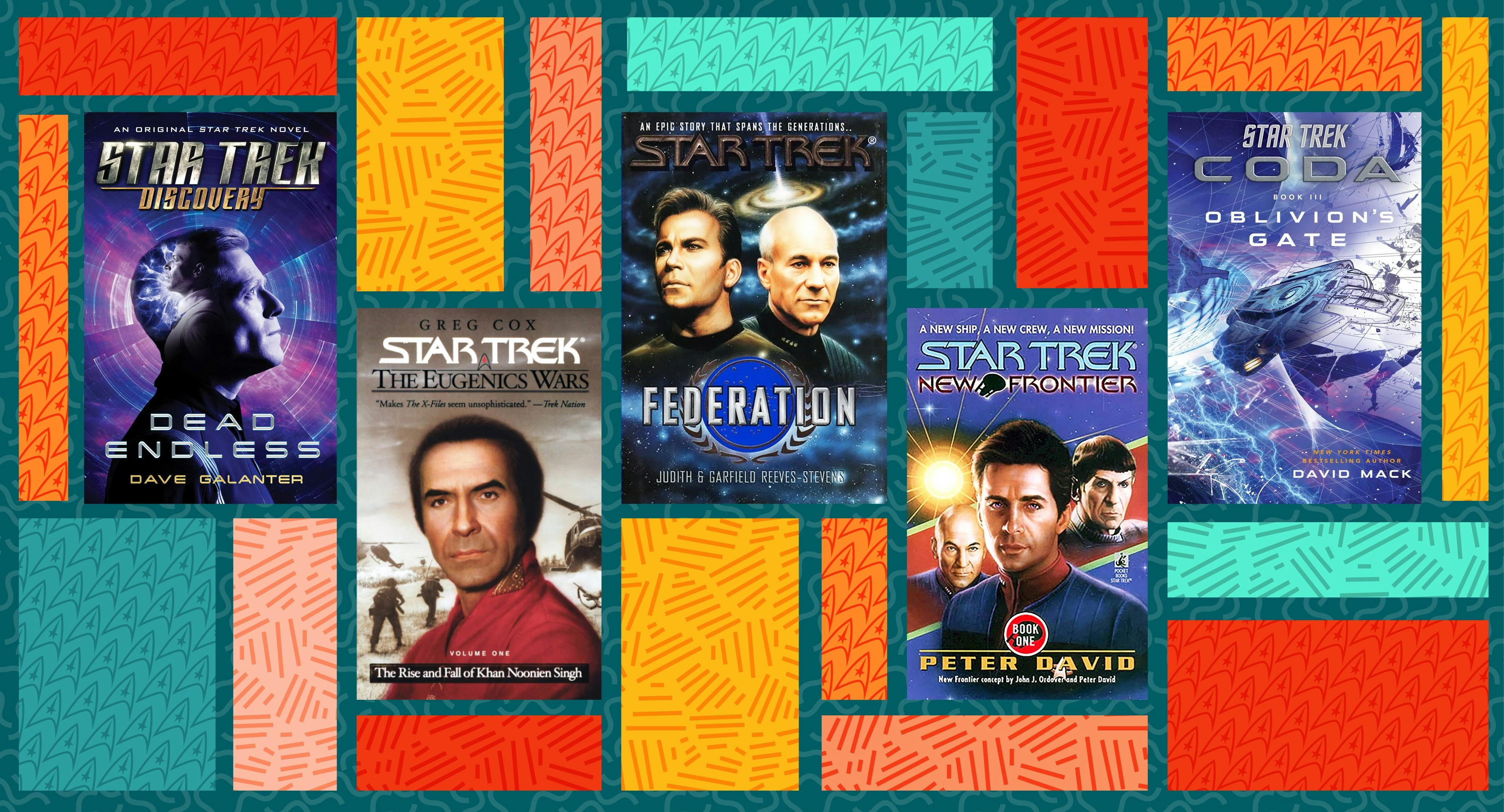
StarTrek.com
If there’s been one constant in Star Trek ’s 56-year history, it’s been the franchise’s presence on fans’ bookshelves. The first series of novels came from James Blish as he adapted certain episodes from The Original Series , and those books opened the floodgates for dozens of authors to inscribe hundreds of Star Trek stories on the printed page. A few are just fine, most are good, and some are excellent – but which are which?
For fans who want to explore the massive catalogue of Star Trek novels, here are five stories that you should definitely seek out at some point in your exploration of the wonderful Star Trek novel universe.
Star Trek: Discovery: Dead Endless – Dave Galanter, 2019
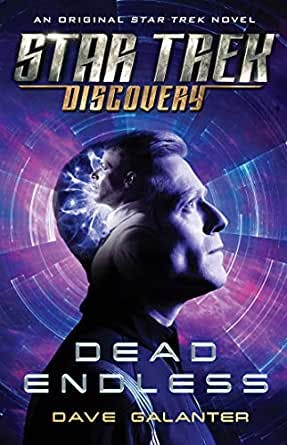
This first pick is one of the more recent Star Trek novels, based on Star Trek: Discovery, that spotlights the relationship between Paul Stamets and Hugh Culber, played by Anthony Rapp and Wilson Cruz in the show, respectively. As his last book, the late Dave Galanter certainly delivers a quintessential Star Trek story – one that perfectly encapsulates the Star Trek ethos.
The adventures of the Discovery amid the mycelial network produces some fascinating science-based storytelling, but the real spirit of this book comes from the connection shared between two star-crossed lovers. The aforementioned men are coupled within the metaphysical fiber of the universe thanks to their loving connection, but the fact that the Stamets in Dead Endless is an alternate universe version of Culber’s real partner makes this connection much more complicated. Galanter ensures readers will chuckle in awe of a smart, unexpected plot twist, smile at a clever or funny line of dialogue, or become misty eyed thanks to the author’s incredible description of love that defies space and time.
Star Trek: Coda: Book III – Oblivion’s Gate – David Mack, 2021
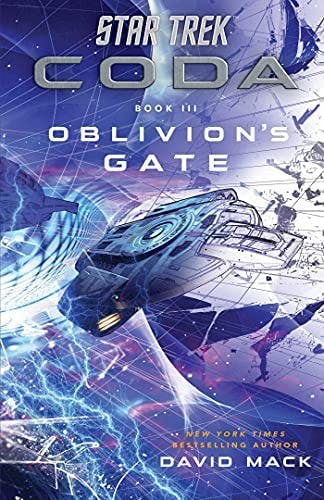
This book is one of the most recent entries in the Star Trek literary universe; in fact, in one sense, it’s the final one. Yes, you should probably read the first two entries in this amazing trilogy — Moments Asunder and The Ashes of Tomorrow — first, but the third book is extra special. Oblivion’s Gate serves as the final word in the long-running so-called Star Trek “novel-verse,” or “lit-verse,” the collection of non-canonical books by numerous authors since 2005 that deeply expand the adventures of familiar and new characters in the Star Trek universe. Therefore, Oblivion’s Gate is a herculean effort by Mack, as it is the final book in a series that is designed by its authors to shut the door on well-loved characters and their adventures. By itself, that’s a good reason to pick this one up.
But Mack steps up to the plate in an unexpectedly powerful way. He clearly deeply cares about the novel universe he and other authors have inhabited for so many years. Oblivion’s Gate sees Captain Picard and his allies stop an existential threat by the Devidians – even when that means destroying the universe they inhabit. Think about those stakes! Mack weaves a deeply emotional tale that adroitly balances intergalactic stakes amid interpersonal ramifications. For example, how does Captain Picard, a man who has fostered a loving family throughout multiple novel-verse books, have the courage to end their existence in service of a greater goal? And what exactly is that greater goal? You’ll have to read to find out.
Star Trek: Federation – Judith and Garfield Reeves-Stevens, 1994
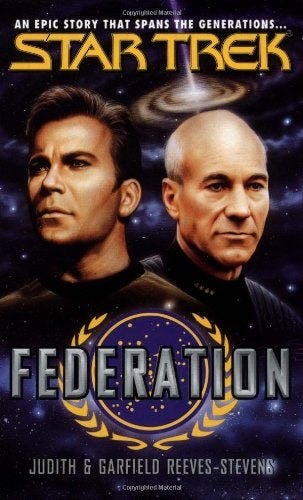
Released in 1994, this is one of the oldest books on this list, but pay that no mind. Judith and Garfield Reeves-Stevens are legendary Star Trek novelists, producing some of the best fiction in this franchise. Federation features a centuries-spanning storyline that unites two of Starfleet’s most famous captains. The Reeves-Stevens duo tie together multiple canonical entries in the Star Trek universe, including a vital The Original Series episode, to craft a story that showcases their intricate knowledge of Star Trek lore using their densely detailed but highly readable writing style.
Readers will journey with Captains Kirk and Picard as a time and mind-bending mystery unfolds in a fashion that will keep readers blazing through the pages, only to find themselves at a remarkable ending that challenges their conception of what’s possible within the Star Trek universe. If that doesn’t sound like a fantastic book, what does?
Star Trek: New Frontier: House of Cards – Peter David, 1997
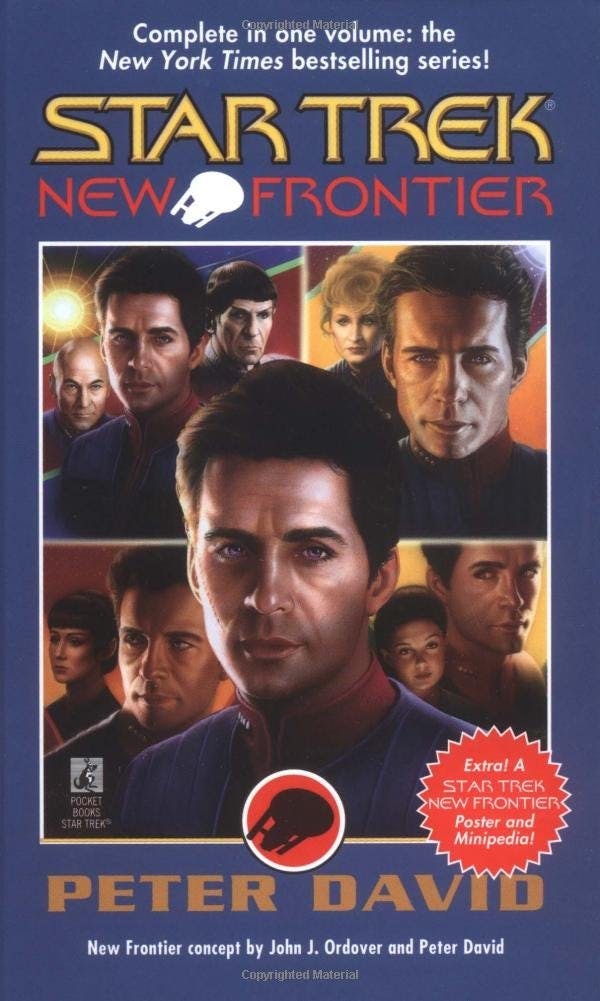
Peter David is a legendary author to Star Trek fans, and for good reason. He’s written 48 works of Star Trek fiction, the most prolific of which is the New Frontier series. This collection of novellas and story stories stand as fascinating additions to Star Trek lore, as the cover of the first New Frontier book promises, “A new ship, a new crew, a new mission!” Yes, most of the main players in this story are either new characters, ones that were only briefly introduced in Star Trek canon, or returning popular characters who help launch this new series.
In the spotlight is Captain Mackenzie Calhoun, the charming and roguish leader of the U.S.S. Excalibur . Thanks to David’s well-developed characterization of Captain Calhoun, he can confidently stand along franchise mainstays like Picard and Kirk just fine. What’s more, his crew bring their own wit, charm, and mystery to this short adventure that serves as the introduction to an entire literary franchise. House of Cards reached the top 10 of the New York Times best seller list in 1997, a testament to the grand new adventures David created with a mostly new crew. If you want to branch beyond the literary adventures of Picard, Kirk, and other franchise favorites, New Frontier is the place to do it.
Star Trek: The Eugenics Wars: Book One – Greg Cox, 2001
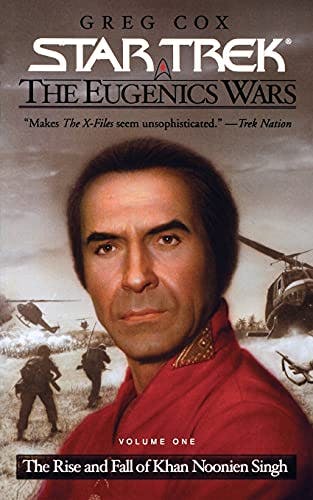
This list of novels was created before the recent episode of Star Trek: Picard featured the same kind of supervisors that permeate The Eugenics Wars trilogy, so it's a neat coincidence!
Cox, who scribes all three books in The Eugenics Wars trilogy, hooks readers immediately with the lengthy but fascinating inaugural entry in this series. The Eugenics Wars feels at once like an expertly told Star Trek story and a history lesson, a seemingly dichotomous feat for a science fiction novel. Cox chronicles the rise – and fall – of the infamous Star Trek villain Khan Noonien Singh during the 20th century and uses numerous real-world historical events to frame Khan’s tale.
Cox leans so much into history that he feels compelled to provide readers with a thorough afterward section that explains every little historical detail used in the book. His expert use of history to build a grand science fiction story is the main reason why readers shouldn’t sleep on this intelligent, thoughtful, and intriguing book – but beyond that, Khan’s story, even if it’s not strictly canonical, really helps add complexity to the character we see on screen.
Kyle Hadyniak (he/him) is a life-long Star Trek fan who lives in Gray, Maine. He is assistant editor for TrekNews.net, and can usually be found reading, playing video games, or arguing why The Final Frontier and Nemesis are the best Star Trek movies. You can find him on Twitter at @KHADY93
Star Trek: Discovery currently streams exclusively on Paramount+ in the U.S. Internationally, the series is available on Paramount+ in Australia, Latin America and the Nordics, and on Pluto TV in Austria, France, Germany, Italy, Spain, Switzerland and the United Kingdom on the Pluto TV Sci-Fi channel. In Canada, it airs on Bell Media’s CTV Sci-Fi Channel and streams on Crave. Star Trek: Discovery is distributed by Paramount Global Distribution Group.
Get Updates By Email

The Best Star Trek Books for the Final Frontier
Ann-Marie Cahill
Ann-Marie Cahill will read anything and everything. From novels to trading cards to the inside of CD covers (they’re still a thing, right?). A good day is when her kids bring notes home from school. A bad day is when she has to pry a book from her kids’ hands. And then realizes where they get it from. The only thing Ann-Marie loves more than reading is travelling. She has expensive hobbies.
View All posts by Ann-Marie Cahill
Reading: My Final Frontier. This is the year 2020 and I have all but given up on my mission: to regain some reading mojo; to seek out new books and ideas; to boldly read books I have not read before. And yet, my brain just can’t. It’s rough. I feel like the energy needed to read a new book would be enough to power the USS Enterprise. By now, you have probably picked up on the theme here: I have journeyed home to seek out guidance from books I have already read, explored, and loved. Yeah, I went searching for the best Star Trek books. I wanted to reconnect with the very spirit of the Federation itself.
Herein lies the trap, the Kobayashi Maru of my mission to read the best Star Trek books. It is a no-win scenario because I am not the same person today compared to the first time I read a Star Trek novel (many many moons ago). Not only has my reading style changed, so too have my expectations on the creative minds behind the LONG list of Star Trek novels. Most noticeably, I would expect some diversity in the authors. Since the first publication of Star Trek 1 by James Blish in 1967, there have been over 850 Star Trek novels, short story anthologies, novelisations, and omnibus editions (!!). I’m not entirely sure if this includes the comics as well but if not, the number would be closer to 1000.
Out of all of these, I can count the writers of color on one hand. Now, given we are talking about science fiction literature which, unfortunately, is renowned for its history being comparable to a very masculine White Dwarf Star. However, we are also talking about Star Trek, a geek culture unto itself considered to be the pinnacle of utopian diversity and opportunity for all. And while I can comfortably find some gender diversity in the authorship, I no longer believe our idealistic future is going to be based on the heavily influenced white-washed western culture as portrayed in the Hollywood perspective.
For the sole purpose of revisiting the Star Trek novels, I have scanned my favourites based on the diversity of authors and/characters. Previous Book Riot articles have delved into the best of the series, even touching on the best way to read Star Trek books. Peter Damien shared his favourites here , while Kristen McQuinn has a great and detailed list of her own here .
Where To Start
Of course, with over 850 books to work with, any list of “favourites” is going to seem a little overwhelming. Let’s find a sensible starting point.
Thank you for signing up! Keep an eye on your inbox. By signing up you agree to our terms of use
It all depends on what you are looking for. Do you know the franchise really really well? Or does your foundation knowledge extend as far as Chris Hemsworth’s iconic opening scene in the movie reboot? (Now there’s a character portrayal to motivate my reading mojo). You could start in chronological order or you could pick out your favourite movie/TV storyline and find the books to continue from there.
Personally, I’m going with the core elements of Star Trek. There are plenty of books to expand on specific storylines or pivotal plotholes. However, my preference has always been for books to expand on the very soul of Star Trek. If you are new to Star Trek books, these suggestions will shine a light on the ‘bones’ of the Star Trek Universe: the Prime Directive, Starfleet Academy, First Contact, the Klingons, the Vulcans. For any Trekkies, the same books will remind you how well these stories can come together. And just to make it easier for us all, I have grouped the books within the television series. Sometimes the stories can crossover, so I’ve added a final group for those books too.
No matter where you start, there is a fair consistency of facts and style across all Star Trek novels (minus any reboots). Star Trek fans are known for their attention to detail and their demand for consistency. Gene Roddenberry (the original creator) was a supporter of fan fiction and the initial fanzine, Spocknalia . He considered any fan fiction to be a compliment, a statement of their love and passion for the series – which was exactly what he had hoped to gain from the television series.
The Best Star Trek: The Original Series Books (ST:OS)
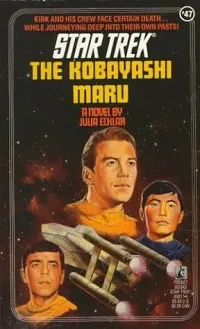
The Kobayashi Maru by Julia Ecklar
There are a handful of phrases you will hear throughout the Star Trek series, no matter where you start. One of these is the Kobayashi Maru: a training exercise given to every cadet who aspires to join Starfleet. The ultimate goal is to rescue the civilian vessel Kobayashi Maru in a simulation battle with the Klingons. There is no ‘win’ in this scenario, making the test more about character than skill or knowledge. In The Kobayashi Maru , Ecklar tells the story of four separate characters from ST:OS, giving us great insight through their varied approaches to the infamous test. I consider this to be The Starting Book for Star Trek Novels because it gives us the best character foundations while providing strategic insight to the philosophies of Starfleet Academy itself.
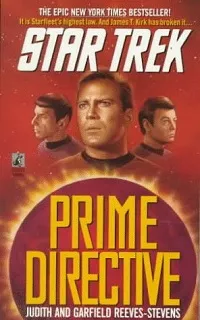
Prime Directive by Judith and Garfield Reeves-Stevens
The Prime Directive is the first and foremost rule, the guiding principle of Starfleet. It prohibits all Starfleet members from interfering with the natural development of any civilisation. The key determinant is whether the civilisation has passed a recognised milestone in technological, scientific, and cultural development. Prime Directive is the best Star Trek novel to challenge this principle and show some serious ethical analysis through the eyes of the original characters. The Reeves-Stevens team are considered the best at capturing the canonical characterisations of the Enterprise crew. From Kirk through to Nichols, each character is allowed to show their belief in the system and their need to question its validity. Prime Directive is one of my absolute favourites.
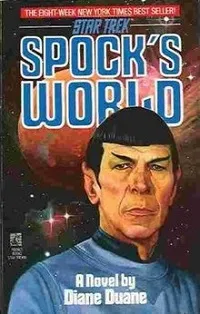
Spock’s World by Diane Duane
One of the most familiar, if not THE most familiar character is Spock. His mixed human-Vulcan heritage provided the bond between space-travelling humans and alien races across the Universe. The Vulcans themselves were always fascinating, in both history and characterisation. They are a race who have chosen logic and reasoning above all other experiences, detached from their emotions. In Spock’s World, Vulcan is planning to secede from the United Federation of Planets. Spock and the crew of the USS Enterprise have been called to Vulcan to help guide through this political and social mess. Woven within the chief storyline are chapters of Vulcan’s history, philosophy, and culture. This is a lovely display of the importance of cultural identity and heritage with the evolution of any society; a key concept of the Star Trek Universe.
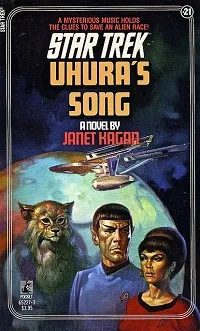
Uhura’s Song by Janet Kagan
I always felt like Lt. Uhura was a minor character with the lesser role of Communications Officer. While her character grew over time, the role was never given its full due. For me, Uhura’s Song fills the gap and expands the roles of crew members. The key to this story is communication; between Uhura and her friends, and amongst the cat-like beings of Eeiauo who have preserved their cultural history in song. I always have a soft spot for anything to do with intangible culture property, but Uhura’s Song brings it out in a spectacular performance.
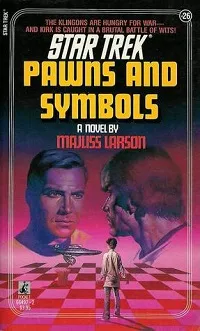
Pawns and Symbols by Majliss Larson
I’ll be honest with you: this is not the best Star Trek book; HOWEVER, it is one of the more memorable depictions of Klingons. The Klingons were the original foes to our earthly counterparts and a stark contrast to the Vulcans. In the earlier stories, it was easy to rely on the bloodthirsty honour system of the Klingons as a way of pushing the story through battle scenes. Larson digs deeper into the Klingon culture beyond war and battles. Here we meet scientists, doctors, and civilians. If you are exploring the established alien races within the Star Trek world, Pawns and Symbols is the starting point for the Klingons.
The Best Star Trek: Next Generation Books (ST:NG)
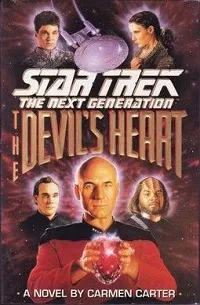
The Devil’s Heart by Carmen Carter
ST:NG is really the television series to thank for the Star Trek reboot. Sure, the movies were great, but it took Captain Picard and his crew to re-establish the Star Trek Universe, balancing the science fiction action with the sociological analysis it was renown for. There are plenty of ST:NG novels where they capture the excitement of the episodes and the fun of the characters. However, my list today is more about the soul of Star Trek, the yearning to explore space and embrace the diversity out there. Carter captures this essence, balancing the scientific discovery with respect for cultural heritage. Captain Jean-Luc Picard truly is the best Star Trek captain to carry this story.
The Best Star Trek: Voyager Books (ST:V)
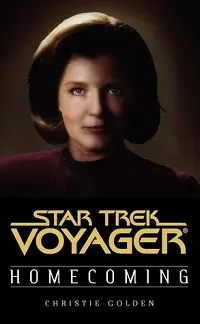
Homecoming by Christie Golden
Homecoming is the ultimate book for any Voyager fans left wanting at the end of the series. However, don’t go thinking this is simply a ‘closure book’. Golden has taken some of the core elements of Voyager and brought them back to life in the ongoing story of the Federation. The goal of the Starfleet is to travel and explore further afield, and Homecoming addresses all the issues they bring back with them.
The Best Star Trek: Deep Space Nine Books (ST: DS9)
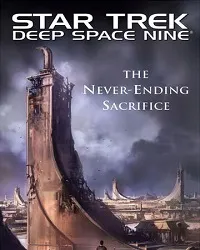
The Never-Ending Sacrifice by Una McCormack
McCormack has a few Star Trek novels spread across all time periods but I love her best when she is delving into the dark political subterfuge seeded in ST: DS9. I will warn you: The Never-Ending Sacrifice is not a ‘light-touch’. It focuses on the fall of the Cardassians, bringing heart and soul to a historical epic, tying in with the infamous Dominion War. You do not have to be a Star Trek fan to love this book. It’s more like a passionate invite to jump into the television series after you read this.
NB: If you are just starting your Star Trek journey with the new live-action series Picard , you should also check out McCormack’s The Last Best Hope , set as a prequel for the series. I haven’t read it yet but I have heard good things about it.
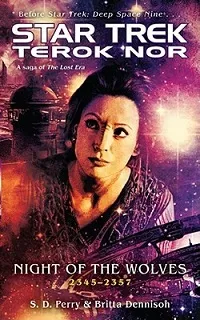
Night of the Wolves (Star Trek: Terok Nor #2) by S.D. Perry and Britta Dennison
This is the second book of the Terok Nor trilogy; Perry and Dennison wrote books two and three after James Swallow opened the series with Day of the Vipers . The trilogy is set before ST: DS9, before the Dominion War, during the Occupation of Bajor. It is not a spoiler when I say, “This does not end well”. Rather, it gives the necessary backstory to what was the key political issue leading into DS9. Perry and Dennison have stayed true to the characters and the experiences that shaped them. There are plenty of tie-ins, and they really help to connect with the storyline. Yes, it will help reading Swallow’s book first but I warn you: Swallow’s book is REALLY plot-heavy reading and you will want to pick up Night of the Wolves almost immediately afterwards, just to help with processing the storyline.
The Best Star Trek: Enterprise Books (ST:E)
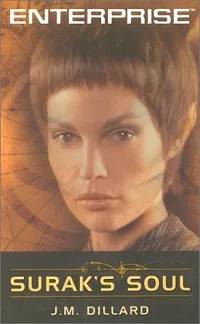
Surak’s Soul by J.M. Dillard
Enterprise , as a series, had the unfortunate burden of all prequel series – it was limited to what came before it. It is a bit harder to find high-quality books which still cover the core elements of the Star Trek Universe as a whole. The best I can find is Surak’s Soul by J.M. Dillard. Giving the limelight to Enterprise’s only Vulcan character allows some discussion on the role Vulcans played in Earth’s earlier space adventures. It also gives us insight into how other alien species would manage to live with Earth-humans. In light of T’Pol’s existential crisis, I would say not well. I’m not totally surprised but it makes for a good story.
The Best Star Trek: Discovery Books (ST:D)
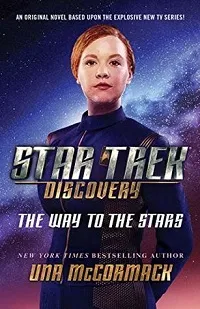
The Way to the Stars by Una McCormack
ST:D is fairly new in the Star Trek Universe, so the selection of novels available is still in its early days. It seems fitting to then recommend what is essentially a coming-of-age story for one of the awkward yet ambitious characters in the show: Sylvia Tilly. And to be fair, Tilly is probably one of the more relatable characters too. By the time we reach Discovery in the television-timeline, most of the core concepts have been played out. If you are looking for novels after watching Discovery , then Tilly’s story is a great starting point. McCormack builds a family history that blends Tilly’s formative years with the established culture of “Federation Families” – those who have name, status, and presence within the system already.
The Best Star Trek Anthologies, Cross-overs, and Novelisation
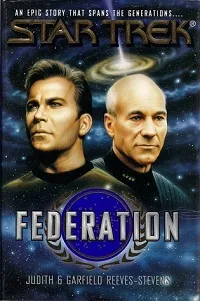
Federation by Judith and Garfield Reeves-Stevens
Many fans are attracted to the Star Trek novels in hope of a crossover. When the move Generations was released, fans rejoiced at the idea of Captains Kirk and Picard mixing it up. While the movie was…okay…this is definitely a moment where the book is better. Federation is everything Generations should have been. The Reeves-Stevens team remain true to the established characters and successfully balance the stories across both past and future. For fans of the Original Series looking to jump over to Next Generation, or vice versa, this one bridges the gap.
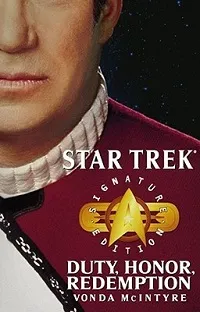
Duty, Honor, Redemption by Vonda McIntyre
For fans of the movies who have never watched the television series (or read the books), you can always start with novelisations of the movies. Hardcore fans will always tell you the best films are Star Trek II: The Wrath of Khan, Star Trek III: The Search for Spock, and Star Trek IV: The Voyage Home. McIntyre brings all three movies into one hardy book, expanding on the movies and incorporating additional details to fill out the stories
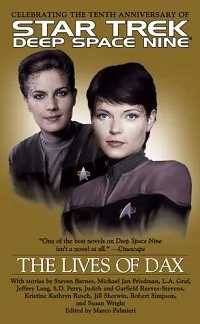
The Lives of Dax (Anthology) Edited by Marco Palmieri
This anthology includes stories by stories by Steven Barnes, Michael Jan Friedman, L.A. Graf, Jeffrey Lang, and several others. That’s a big team of writers, but then, Dax is a big character – figuratively speaking. Dax is a worm-like symbiote who is joined body and soul with a diverse range of humanoid hosts. This collection of short stories is not just a backstory to one of my favourite Star Trek characters; it is also an example of the diversity of all characters within the Star Trek universe. Not only is each host different but the combination of host and symbiote creates differences too. This is simply a reflection of our own interactions creating unique relationships and experiences as a result of the combination we make with other people.
And on that note, I will end my very long list of the best Star Trek books. Somewhere in this list is your ticket to an amazing literary universe filled with utopian ideals and exploration. But who says you can only choose one?
Be bold! Read them all!

You Might Also Like


- Reviews / News
- Pocket Books Trek Novels
- 2024 Releases
Wednesday, April 17, 2024
New comic day: star trek #19 - new story arc.
Star Trek #19 Pleroma Part 1
Wednesday is always new comic day, and this week we have a new addition to IDW's flagship Star Trek comic series, and the beginning of a new story arc!
Star Trek #19 is out today, and in the Pleroma arc, Captain Sisko must deal with an issue that hits very close to home when T'Lir returns to the Theseus .
Check out the various covers below, along with links to purchase the digital edition from Amazon and the publisher's synopsis.

Acclaimed writers Jackson Lanzing and Collin Kelly along with Star Trek: Strange New Worlds comics artist Megan Levens ( Buffy the Vampire Slayer , Starsigns ) welcome you to the thrilling brand-new chapter of the Eisner-nominated Star Trek flagship series!
Benjamin Sisko has begun imagining an end to his journey and is looking forward to establishing a normal, human life. But unfortunately for Captain Sisko, his next test has been a member of his crew this whole time…
T’Lir, the crew’s former science officer, has returned to the U.S.S. Theseus bridge with a shocking revelation and a plea. Kahless’ attempted war with the gods has altered the very fabric of spacetime, threatening the destruction of several godlike species. Already, anomalies are beginning to form across the galaxy. Their only hope: the Emissary of the Prophets, Benjamin Sisko, and his valiant crew of Starfleet’s finest.
Thursday, March 28, 2024
Positively trek book club: morn's little partner in crime.
Positively Trek Podcast:
Star Trek: Deep Space Nine The Dog of War
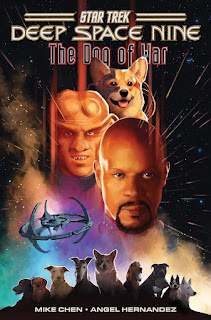
Powered by RedCircle
Wednesday, March 27, 2024
New comic day defiant #13.
Star Trek: Defiant #13
Wednesday has rolled around again, which gives us another new Star Trek comic issue! This week is issue #13 of Star Trek: Defiant , continuing the voyages of Worf and his renegade crew aboard the USS Defiant .
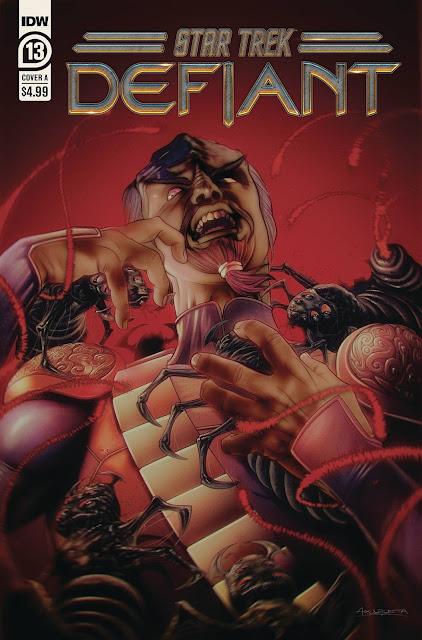
Starbase 99 has been compromised. Worf and the Defiant crew are quarantined within, desperately trying to evade the infected as their parasitic counterparts flood the floors of the base. To make matters worse, one of the crew's bounties is dead, another missing. Can the crew survive this raging parasitic invasion on the desolate starbase?
Tuesday, March 26, 2024
Release day star trek: the motion picture - echoes.
Star Trek: The Motion Picture Echoes
by Marc Guggenheim Art by Oleg Chudakov
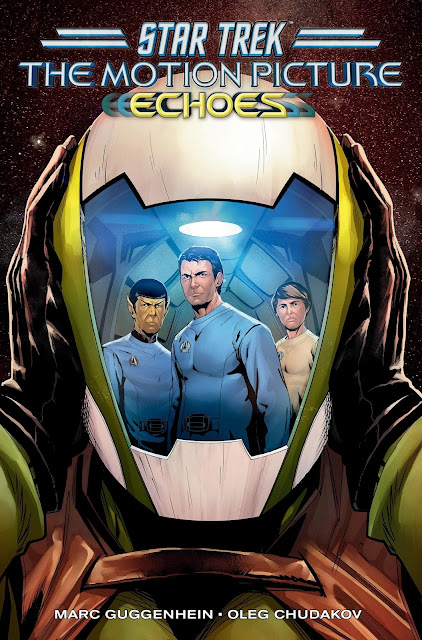
Join Captain Kirk and the crew of the U.S.S. Enterprise in this never-before-seen adventure spinning out of the Original Series!
When a space anomaly thrusts a bounty hunter and her target – a criminal mastermind – into their universe, it's up to Kirk and his crew to stop them from unintentionally starting a war with the Romulans and unleashing a superweapon of foreign tech onto the system. But the strangers from another universe are more familiar than they assume... for underneath their helmets are their doppelgängers – from an alternate reality!
From critically acclaimed screenwriter, producer, and comics writer Marc Guggenheim ( Arrow ; DC's Legends of Tomorrow ; Star Wars: Han Solo and Chewbacca ) and artist Oleg Chudakov comes this brand new mini-series!
Wednesday, March 20, 2024
New comic day star trek #18.
Star Trek #18 Glass and Bone, Part 6
It's Wednesday, which around these parts means that it's new Star Trek comic day! This week, Star Trek #18 is released, concluding the Glass and Bone arc that sees Captain Sisko and his crew aboard the USS Theseus dealing with the fallout from their blunders with the Tzenkethi.
Check out the various covers below, along with links to purchase the digital edition from Amazon and the publisher's synopsis!
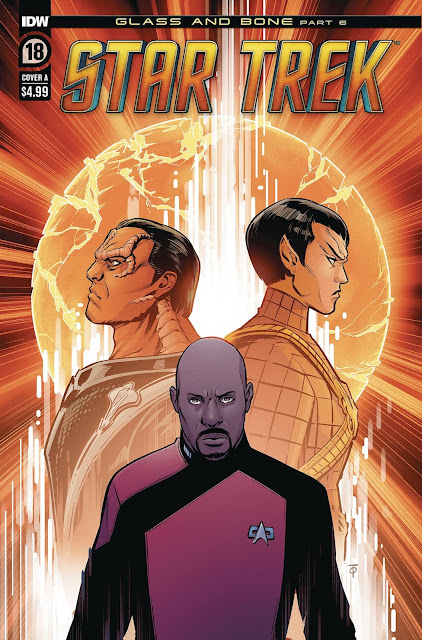
Tzenketh is on the brink of war against the Federation... and it's all the fault of Captain Sisko and his crew. A battle between the Tzenkethi, Romulans, and Cardassians is imminent, while Tzenketh itself begins to tremble. The Theseus crew's actions have exacerbated the volcanic instability of the planet – another thing the Romulans will undoubtedly pin on the Federation. The Romulan Magistrex's plot to build an alliance that will destroy the Federation is underway, can Sisko and his crew manage to save this savage world of glass and bone? Find out in the finale of arc three of the Eisner-nominated series!
Thursday, March 14, 2024
Positively trek book club: seven of nine knows her name.
Star Trek: Picard Firewall Exclusive Interview with author David Mack!
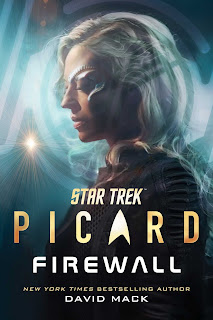
Wednesday, March 13, 2024
New comic day sons of star trek #1.
Sons of Star Trek #1
Out today is the first issue of a new 4-issue miniseries, set in the same continuity as the ongoing Star Trek comic series and its spinoff, Star Trek: Defiant ! Jake Sisko and Alexander Rozhenko are the focus of this one, with some reality-fracturing hijinks included! We have the various covers below for you to take a look at, as well as the publisher's synopsis and links to pick up the digital version from Amazon.
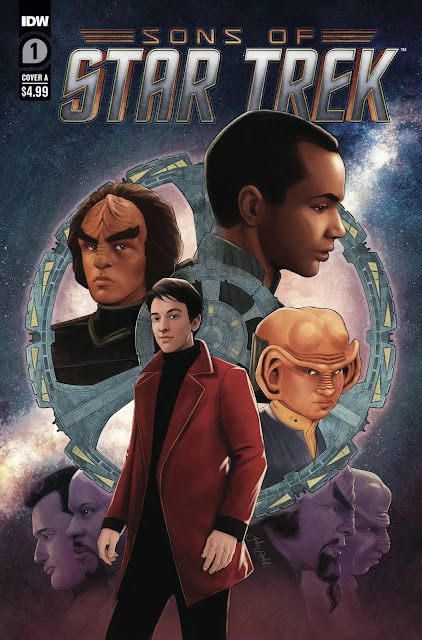
From the mighty pen of acclaimed Cyborg writer Morgan Hampton comes a new four-part miniseries spinning out of IDW’s Eisner-nominated Star Trek series and fan favorite Star Trek: Defiant series!
In the aftermath of Kahless' harrowing Day of Blood , Jake Sisko struggles to find his place in the universe now that his family has been reunited and his father, Benjamin Sisko, has once again saved the galaxy.
Meanwhile, Alexander Rozhenko is recovering mentally and emotionally from his time as one of Kahless' devout followers. Although his father, Worf, was able to break him away from the Red Path cult, Alexander is haunted by his actions during the bloody coup and is unsure of his ability to atone for the devastation he caused.
Jake and Alexander find their stories intertwined as they're thrust into an alternate universe where they followed their fathers' footsteps into Starfleet stardom. As officers aboard the U.S.S. Avery , Jake and Alexander encounter alternate versions of other children of Starfleet legends who show them they all may have a bit more in common than it would seem.

- Episode Reviews
- Film Reviews
- Book Reviews
- Model Reviews
- SNW Episodes
- SNW Production Info
- Picard News
- Picard Episode Guide
- Picard Production Info
- Prodigy News
- Prodigy Episodes Guide
- Prodigy Production Info
Content Creators
Latest sponsored content, the measure of an episode – lower decks s3e2- “the least dangerous game”, orange river – where did the gorn come from, the measure of an episode – lower decks s3e1- “grounded”, past creators.
- Become Guest Author With Treksphere
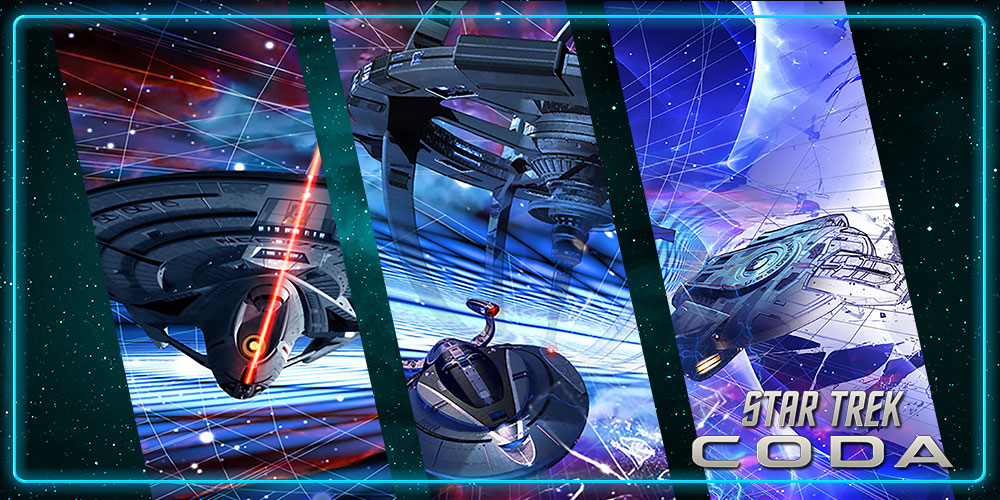
Book Review – The Star Trek: Coda Trilogy
Over the last few months, Treksphere’s Chris Cantley has been taking us through the events of the post Nemesis literary continuity. That all round-up with the trilogy titled Star Trek: Coda . A new continuity was inevitable as soon as Star Trek: Picard was announced, and the authors who had crafted the “Litverse” started considering the implications for their work.
Chris has done a great job taking us through the events of these novels and you should read his piece here for the whole story. But, what about the books themselves? Can you read them without first reading a hundred other books? Have they done justice to the characters and the writers who have nurtured them over the last twenty years?
While Chris’ exploration of the events of the Coda books must be spoiler filled by its nature I will try and avoid too much in the way of spoiling here, but I can’t avoid them all. Be warned…
The names Dayton Ward, James Swallow or David Mack on a book cover have become reason enough to buy and read it. Along with Una McCormack, Christopher L Bennett, Keith R. A. DeCandido, and others they have created a series of interlinked books that are some of the best Science Fiction, of any sort, this century.
Star Trek has always dealt in multiple universes and time streams, from the Mirror Universe to episodes like TNG’s ‘ Parallels .’ That makes the concept easier to work with than it may have been in Star Wars, where consigning forty years of books to “legends” status was really the only option once a new Canon was decided on.
The fact that Canon resides strictly onscreen in the Star Trek universe makes the wiping away of an entire continuity just another aspect of the rich tapestry that makes up Trek.
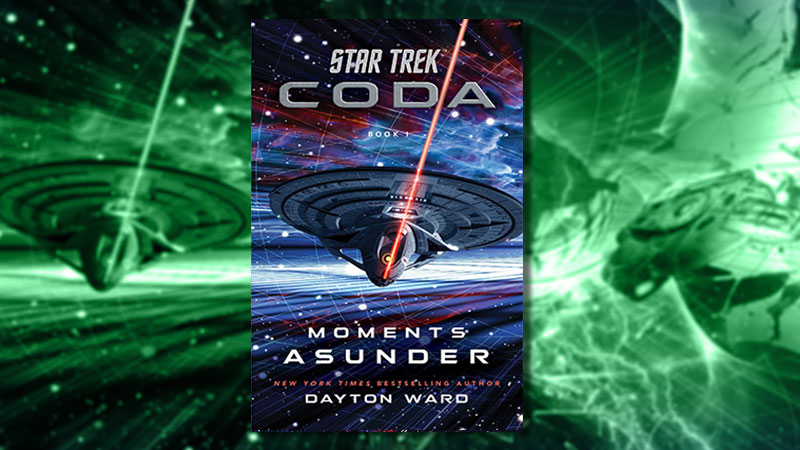
While each novel has one name on the cover interviews the three authors have been at pains to say that all three were a collaborative effort. While book one, ‘Moments Asunder,’ has Ward’s name on the cover the style it sets is consistent across the whole trilogy. The two prologues, one setting out a marker for the way things will be by wiping away a major piece of Trek property, and the other showing Picard family life build a sense of tension and anticipation.
The subsequent chapter with Worf up for promotion and LaForge considering a career change add to that. At this point some of the Litverse only characters are brought in. LaForge’s love interest is Dr Tamala Harstad, and one of my favourite newer crew members T’ryssa Chen. The handling of these scenes where no assumptions are made about the reader’s past understanding is well judged.
With just enough explained to work in the context of the current book, but with hints at past events that will make those new to this crew want to dig into the back story. This is typical of the care that has been lavished on not just the Coda books but overall Litverse. You can read each book as a standalone, but nothing is over-explained to ruin the flow for long-time fans.
By halfway through the first book, the fact that something is eating away at entire realities has become apparent with the culprits identified as the Devidians from the TNG episode ‘Time’s Arrow’. Wesley Crusher would naturally be a major part of a story shifting between universes, and his development as a character is hinted at in a reference to the TNG novel ‘Cold Equations novel: The Body Electric’, and various versions of him play a key role in uncovering the truth.
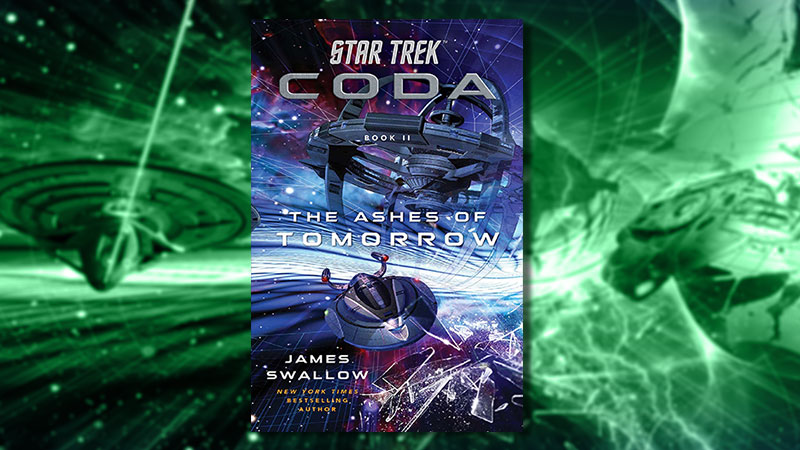
As readers, we know this is the end one way or another. The writers tasked with pulling down the shutters on this timeline seem to have chosen to write a love letter to Trek, their colleagues and their readers. It must have been very freeing to know that were no rules, no one needed to be saved, and they could tell any story they wanted to. For instance, the first book is an explanation of how LaForge went from holding the steering wheel to being Chief Engineer back in Season Two of TNG. I can picture one of the writers saying, “this has always bothered me, let’s tie it up.”
With the major characters in Star Trek (as in any long-running series) being mostly immune from a visit by the Grim Reaper, being able to dispose of a couple of major canon characters early on, including one version of Wesley adds to the shock and awe factor of the books. The body count in Book 2 – Ashes of Tomorrow is even higher. With the premise established in the first book, James Swallow can get on with wrapping up some loose ends from previous stories. The action shifts to Bajor to pick up the effect of the changes to reality on Sisko and Kira.
The middle book of a Trilogy often must do the heavy lifting, building on the tension created in the first book and setting the scene for the finale. Swallow does both these things but develops the story, positioning the Federation’s political and military entities as negative elements, with one of the key figures in all of Trek siding with them.
You can picture the authors having a spreadsheet of characters and incidents that they wanted to include in the credits so to speak. Chen references Lower Decks when defending a new assignment working in the second contact, Picard channelling Kirk, and a number of other lighter moments amid the destruction. The awakening of Bashir following the events of the Section 31 novel ‘Control’ with the news of Dax’ death by Garak is a brilliantly written scene and it’s only a shame that Swallow didn’t have time to linger on it to round off the Garak/Bashir relationship.
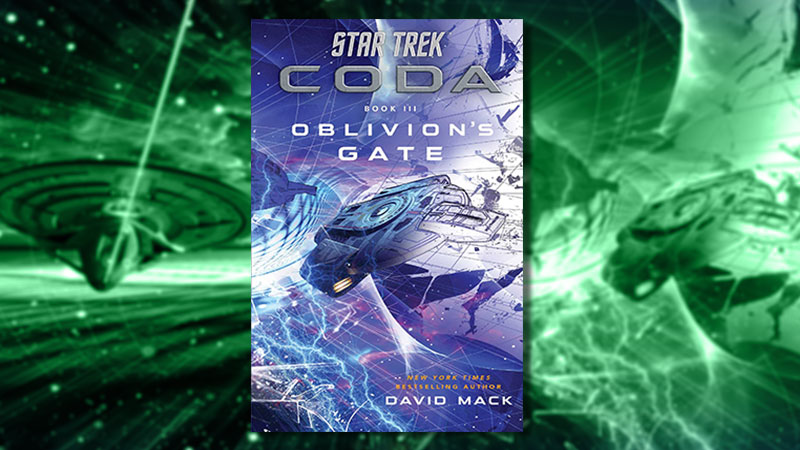
The end of Book 2 brings another apocalyptic passage, but by now the reality of the situation along with the understanding that the Litverse reality is part of the problem is emerging. A “Think Tank” put together of the finest minds, you can guess the names, identify the point at which this splinter reality branched off from the “true timeline.” This is a particularly neat piece of plotting, enabling at one stroke the introduction of the Borg (extinct in this timeline remember) as well as putting to rest one of the paradoxes of Trek, that time travel has no consequences. Christopher L Bennett’s Department of Investigations books wrestled with some of the implications of altering timelines, but now we find that the time travel event of ‘First Contact’ has led directly to the Davidian’s ability to access the timeline and caused the creation of the splintered timeline of the Litverse. This is clever, really clever.
David Mack ties up the Trilogy with ‘Oblivion’s Gate.’ In the past, he has written Trilogies all by himself. His ‘Destiny’ books are the stories around which the Litverse revolves. As a writer of action, he is second to none. I’ve heard Destiny described by other writers as “Mack’s Mess,” due to the amount of collateral damage they were left to clear up. What I don’t see mentioned often is how good he is at writing the relationships that are the key to understanding and appreciating Star Trek .
For all the technobabble and phasers on stun, Trek is about people and their interactions. While the action ramps up even further, if that is possible, the critical points in this final book are the scenes between Data and Lal, Data and Geordie, Picard with Rene, and Beverley. The best of all these scenes is the resolution of Worf’s relationship with his son Alexander. Adding in the Mirror Universe version of K’Ehleyr, Worf’s lost mate makes for an emotional last stand. As they fall K’Ehleyr says “Warriors of Sto’Vo’Kor prepare a feast a family of warriors is coming.”
The ultimate battle at Oblivion’s Gate takes place in an area that evokes, in my mind at least, some of the fights in the Death Star with its walkways and ramps. With the action switching between Kira, Data, LaForge and Picard, all in different Universes this feels like a nod to the series finale ‘All Good Things,’ Picard embraces his family and pushes the button that erases their timeline.
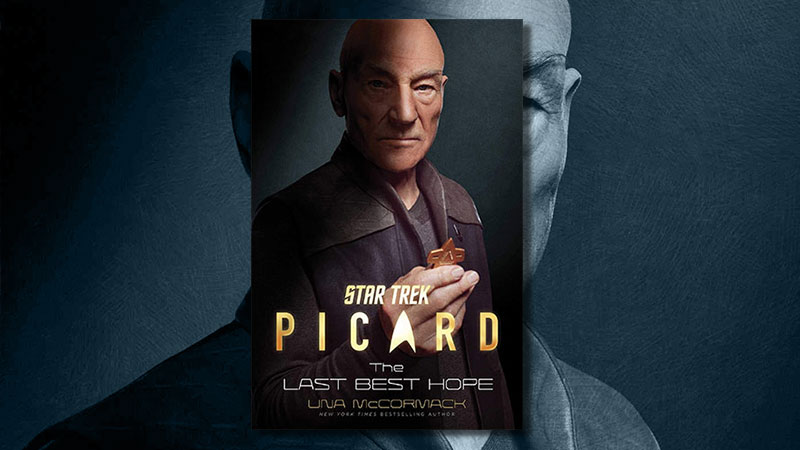
The coda to Coda, briefly explores aspects of other potential lives of Picard with nods particularly to Anij from ‘Insurrection.’ The Epilogue, which I won’t spoil, and don’t skip forward to it, encapsulates everything that is great about Star Trek . It is about people and in this case one person.
That the authors’ saw fit to give a nod to Una McCormack’s Picard novel ‘ The Last Best Hope ’ as their closing remarks recognise that she was the main name missing from the credits in writing this series. As all good writers would they have left a loose end that doesn’t shut the door forever but with the rounding off of these stories they now sit within their own universe, much as the Kelvin timeline does. I’ve heard, I think, Dayton Ward suggests the name The Destiny timeline for it.
Books tied to TV series or films tend to be viewed with a certain amount of snobbery. These books collectively deserve to win Hugo and Nebula awards by boatload. With Science Fiction generally becoming more a literary exercise than about good storytelling, the Coda trilogy stands out, on its own merits as an exceptional story told with skill, as a reflection on Star Trek as a body of work, and as a taste of the work of three great writers at the top of their game. If you haven’t read these books do so, now. If you haven’t explored the wider Litverse, then despite this being the end it is a great point of entry.
Read The Novels That Cover These Events…
- Moments Asunder: Star Trek: Coda: Book 1
- The Ashes of Tomorrow: Star Trek: Coda: Book 2
- Oblivion’s Gate: Star Trek: Coda: Book 3
Read The Complete Beta Canon Series
- EXPLORING BETA CANON – STAR TREK UNIVERSE POST NEMESIS – PT1
- EXPLORING BETA CANON – STAR TREK UNIVERSE POST NEMESIS – PT2
- EXPLORING BETA CANON – STAR TREK UNIVERSE POST NEMESIS – PT3
- EXPLORING BETA CANON – STAR TR E K UNIVERSE POST NEMESIS – PT4
- EXPLORING BETA CANON – STAR TREK UNIVERSE POST NEMESIS – PT5
- EXPLORING BETA CANON – STAR TREK UNIVERSE POST NEMESIS – PT6
- EXPLORING BETA CANON – STAR TREK UNIVERSE POST NEMESIS – PT7
- Tags - Book Reviews
- , Latest , Merchandise , Reviews , Star Trek Novelverse , Star Trek: Universe
Join the conversation
Leave a comment, « due to gdpr, eu users need to be logged into facebook to read and leave comments », share this post, latest from treksphere.
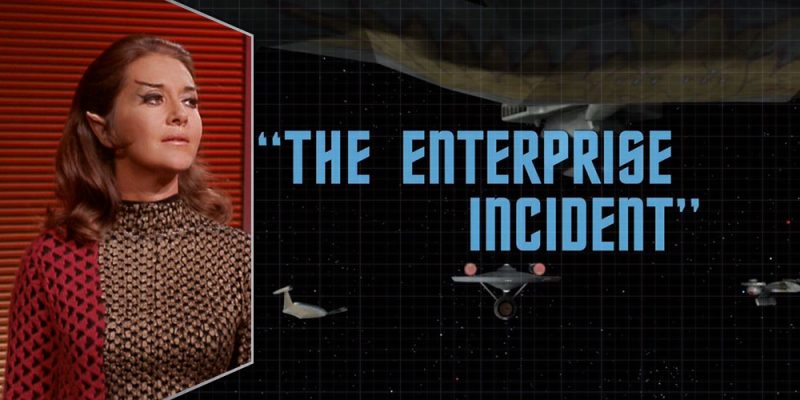
Star Trek: The Original Series – The Enterprise Incident
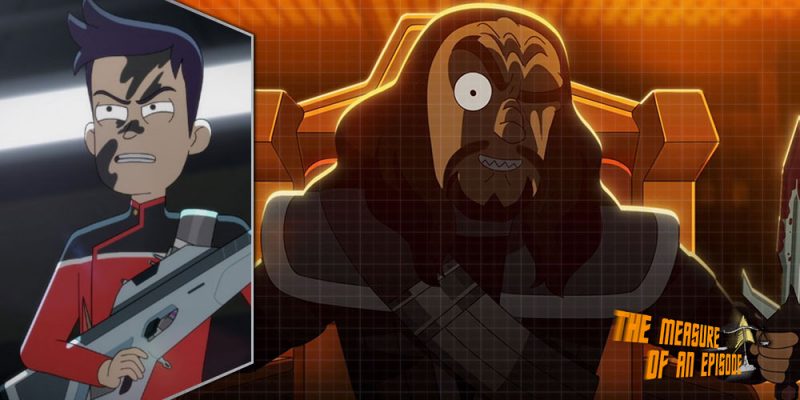
Trek LCARS Android Apps By NSTEnterprises
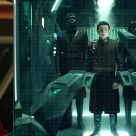
The Measure of an Episode – Strange New Worlds S1E10- “A Quality of Mercy”

Star Trek is for Kids!: A Review of “My First Book of Space” & “My First Book of Colors”
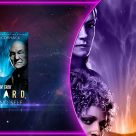
Where the Blood Poppies Blow: A Review of Star Trek: Picard: Second Self
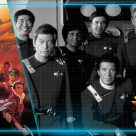
Wrath of Khan – 40 years on…
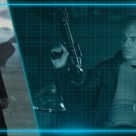
The Measure of an Episode – Strange New Worlds S1E9 – “All Those Who Wander”
Star Trek and all related marks, logos and characters are solely owned by CBS Studios Inc. Treksphere & Trekfanproductions are not endorsed by, sponsored by, nor affiliated with ViacomCBS, CBS Studios Inc, Paramount Pictures, or any other Star Trek franchise. Treksphere.com is a fan website. No commercial exhibition or distribution of its content is permitted. No alleged independent rights will be asserted against ViacomCBS, CBS Studios Inc or Paramount Pictures.”
Treksphere.com is a participant in the Amazon Services LLC Associates Program, an affiliate advertising program designed to provide a means for us to earn fees by linking to Amazon.com and affiliated sites. Treksphere.com is not supported, sponsored, or endorsed by Amazon Services LLC
© 2016 – 2023 TREKSPHERE & TREKFANPRODUCTIONS ALL RIGHTS RESERVED, ANY REDISTRIBUTION OR REPRODUCTION OF PART OR ALL OF THE CONTENTS IN ANY FORM IS PROHIBITED. YOU MAY NOT, EXCEPT WITH OUR EXPRESS WRITTEN PERMISSION, DISTRIBUTE OR COMMERCIALLY EXPLOIT THE CONTENT.
Privacy Overview
Star Trek reviews - Shastrix Books
Star trek reviews, all reviews.

A Dangerous Trade
Cassandra Rose Clarke
20th April 2024
Having finally managed to catch up on all the episodes of Star Trek: Prodigy’s first season, I felt comfortable starting my dive into the three novels that have been published.
It is a short novel, and clearly printed for younger authors, with large, sans-serif text on very cheap paper, and a fast pace story.
The most important thing for me though is that the author has totally captured the feeling of Prodigy. The book reads just like it’s an episode of the TV series, with the right pacing, the right use of the characters, the right peril, and the right morals.
Compared with early novels from other Star Treks, this feels the most spot on with its characterisation and world. Every character gets a chance to shine and I loved it for that.
A jolly good little adventure.

7th April 2024
In this prequel to Star Trek: Picard / sequel to Star Trek: Voyager, we follow Seven of Nine’s journey of discovery following the end of the Voyager TV series. Rejected by the Federation over their fear of her Borg past, she seeks to fit in elsewhere.
It’s an excellent story that shows us considerable parts of the journey the character took between her TV appearances, and feels very in keeping with everything we know from the shows. There are nice little Easter egg references, but mostly this is a standalone plot that tells a solid story that fits the era and our time.
The book does feel like it represents the time we live in. There are several aspects which just wouldn’t have happened in the books of previous eras, but now are comfortable and normal, and make for a more welcoming and authentic setting.
And yet we also get a bunch of the classic David Mack tropes as well, which continue to be a delight to find, and fit so well with this style of tie-in storytelling.
A really nice visit to this world and a beloved character who I can only hope we keep seeing more of in the future.

Making It So
Patrick Stewart
22nd January 2024
Celebrity memoirs are not my usual choice of reading material, but when it’s Patrick Stewart there is an obvious exception.
I went in with some trepidation - can he write well? Will I like him after reading it? But both gave a yes answer.
The book starts quite brutally. Sir Patrick spends a lot more pages talking about his early years than later ones (in fact it felt like 1987 to present was over quite quickly compared to the rest) - and there are some shocking elements to his youth that seem quite distant to a modern audience.
Beyond that, the majority is naturally the story of a career in acting. There are some surprise celebrity guest appearances, including early on, and a lot of lists of people that Sir Patrick has worked with on probably hundreds of plays.
What really comes through to me are two things: his passion for acting, and how that has driven all of his choices and major life events; and how emotional a person he is. There are moments littered throughout where there is far more than I think would be expected from Captain Picard.
On the whole, I found this a very comfortable read (apart from the bits at the start), and I’ve really enjoyed taking the time to spend this time with Patrick Stewart.

Star Trek: The Next Generation Cats
Jenny Parks
This fun little book depicts the main characters and key scenes from the Star Trek: The Next Generation TV series as if they were cats.
All other aspects are totally true to the series, and this makes it both a pleasant trip down memory lane, as well as a fun set of cat pictures to look at.
There are some places an almost feels a bit too real and extends into the realm of slightly creepy.
Overall though an entertaining ten minutes or so, which could be stretched out if you budget yourself to maybe one page a day, or could entertain your Trekkie guests as a coffee table book.
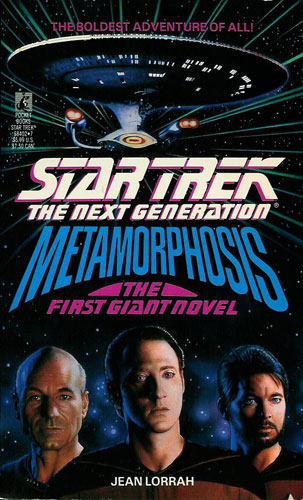
Metamorphasis
Jean Lorrah
3rd December 2023
The first of the giant novels, this long TNG novel set in season two is focussed on Data, dealing with his emotions following the episode The Measure of a Man and dealing with his feelings for Tasha Yar.
Lorrah begins with a passionate foreword about how fans should accept TNG, and explaining that you don’t have to read her first TNG book before this one, despite her re-use of a set of guest characters.
The book is fairly neatly constructed out of distinct acts, which depict parts of the action. It has some science fiction tropes, which do help with neatness of fitting into this shared universe but feel like a more recent author might have tried to avoid.
But it’s a good piece of science fiction that expands on the world seen on TV in the way that only printed storytelling could back then, and really helps to explore the character of Data in several new situations.
But it feels like it’s been made giant by making the chapters longer, rather than by having more of them. It felt like quite a slog sometimes just to get to a convenient break point, and I think that’s what made it take so long for me to get through.

A Rock and a Hard Place
Peter David
9th September 2023
Back to the early 90s with the tenth Next Generation novel.
Some of the edges still feel a bit raw, with elements of characterisation feeling enhanced upon what’s in the TV show. But then it’s Peter David, who is one of the great authors of this era of Trek, and who has definitely earned the right to expand the canon. I really liked the dynamic he adds between Troi and Riker - definitely feels like it’s leading up towards his later Imzadi novels.
There are some notable guest characters, and I’m not entirely sure how I feel about them. They frustrated me a little, but I think that’s the point, especially when I have such an established relationship with the main characters.
All in all, a good book, particularly standing out against others of the early 90s. Definitely maintains its readability.

Somewhere To Belong
Dayton Ward
16th July 2023
The latest Discovery novel, set between seasons three and four, sees the crew respond to a distress call and get caught up in an internal conflict amongst some old friends.
It starts like any classic Star Trek novel, but soon becomes clear that the plot really does only work because it’s a Disco novel. It does a good job to extend the lore and explore the interaction between the two Discovery eras, and uses a range of characters from the show well.
I found it slow to read though, failing to give me a need to absorb it all faster as I read through. Each chapter felt like it ended at a convenient point to take a break, instead of offering the cliffhanger I might need.
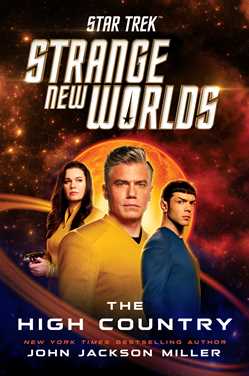
The High Country
John Jackson Miller
3rd April 2023
The first Strange New Worlds book feels superficially like a lot of the old novels - with a planet of the week to visit and find out what’s going on, with a civilisation who appear to be from Earth’s history. In this way, it follows the pitch perfectly - a modern take on the original idea of Star Trek.
It is a modern take too - there’s a good balance between three focal characters - and it’s about much more than just the action and the science fiction concepts.
Miller focussed on the characters we know from before - from The Original Series and from Discovery - possibly reflective of how early the text must have been written, and without him having yet seen the finished product of Season One. But actually my favourite parts are those with La’an, whose voice Miller gets absolutely spot on.
The one thing I did find though was that this wasn’t a book I was able to read fast. I’d just come off a period of heavy reading where I’d be really engrossed for hours, and this broke that habit. I’m not really sure what aspect had that effect, but it meant that it took me nearly two weeks to read instead of two days.

Second Self
Una McCormack
28th October 2022
Back in the world of Star Trek: Picard, Una McCormack tells a story of what Raffi got up to between seasons one and two, when she’s sent on a mission to hunt for a missing war criminal.
I love how this novel turned out to be nothing like what I expected. It’s not you old fashioned monster of the week type adventure - but actually something deep and character-driven and using McCormack’s rich knowledge and love for the franchise to create something that feels true to so many characters.
It’s fascinating to see this novel because it does take us in a different, yet equally satisfying, direction from that taken with the previous novel continuity, and shows us an alternative view of what might have happened to a beloved character.
It’s a really great thought-provoking adventure.

Oblivion's Gate
5th April 2022
The finale of the 20+ year so-called Star Trek lit-verse sees an end to a novel series that has kept me a companion since the end of the DS9 TV series. So this is a bitter-sweet moment of reflection as it’s finally wrapped up and put away so that the continuing novel line can sit back into line with the TV canon.
It’s a hell of an ending, bringing together so many characters, so many threads of storyline, giving each and every one a chance to shine before devastating the reader like only David Mack can. And he has embraced this opportunity.
Plot wise, Mack rounds things off with a really clever set up that makes everything make so much sense and really allows for the reader to root for the characters despite it being very clear and very upfront about how things are going to go.
So all in all an excellent and very fitting end to this long running narrative thread. Very well done to the three authors who put the trilogy together to wrap this up and land us happily back into where we, as readers, need to be to continue to enjoy Star Trek novels of the future.

The Return of the Archons
Brian J Robb
I’d heard of Obverse and their various Archive series before via Twitter, but it was only when I heard they were going to release a Star Trek series that I took the plunge and pre-ordered the first three entries.
And so the first book of the Gold Archive. It’s essentially a prolonged essay on the episode The Return of the Archons, considering the historical background of the episode, the themes that it brings up, and the echos of the episode through subsequent Trek shows.
It’s a more academic style of text than I am typically used to reading, but not in such a way that makes it dry or unreadable. I enjoyed dipping in and out, reading a few pages at a time, and learning more about this episode in more depth than I think I’ve seen it thought about elsewhere.
I’m glad I made these purchases, and intrigued to find out whether this example is going to be typical of the series, or how varied they will become.

23rd February 2022
This novel is a refreshing return to the midpoint of the DS9 TV series as we reunite with Jadzia Dax when she’s asked to try to help an old friend who has gone off the rails.
The tone of the book does feel different to many Star Trek novels - it feels aimed at less dedicated readers of the novels, and readers less familiar with all the (now) older TV series. It also has the slight feeling, particularly near the start, of being pitched closer to the “young adult” feel that the 2009 era Star Trek Academy novels had. But I don’t think any of these are bad things - they all fit well with a return to an era that the novels haven’t touched for a while.
In terms of the plot - I thought it really interesting, but I can imagine some readers would not like how it expands upon the canon, particularly in regard to Trill joining practices. I think White has certainly not felt constrained in creating new lore, and just about gets away with it.
The characterisation is where I think White shines. We spend most of our time with Dax, but four of the rest of the cast make significant appearances, and I do think it shows that White has definitely understood them all well, and utilises them. This comes across particularly in how Dax thinks of the other characters.

Fan Fiction
Brent Spiner
6th February 2022
Brent Spiner, the actor who played/plays the Android Data and his family in Star Trek, pens the tale of a man named Brent Spiner, an actor who plays the Android Data in Star Trek, in the early 1990s, as he receives threatening letters and lives a confusing life.
The narrative is what this book is really all about. It paints a fascinating satire of life as a TV star, with larger than life colleagues, and a weird Hollywood world moving around you. But also of a man clearly too tired to be in any sort of control of his life.
The plot is chaotic, but somehow doesn’t really seem the point. There’s an element of whodunnit, but apart from a couple of pieces of beautiful misdirection it’s really just a sideshow for the narration, which is where the humour and love shows.
A fun adventure of a novel, likely only made possible by Spiner himself serving as the author, as the insights, teasing, and self-deprecation would feel wrong coming from anyone else.

The Ashes of Tomorrow
James Swallow
29th December 2021
The second book of the Coda trilogy, this time by James Swallow, is even more intense than the first.
While the survivors of the first novel try to convince the Federation of the need to take action, a second group of familiar characters is reuniting to join the battle for time itself.
The novel is again brutal, but flows at a much smoother pace than book one, allowing me to become properly hooked and charge through the pages.
There’s so much going on that it’s hard to remember everything, and it really feels like the authors are finally let loose to do whatever they want with no rules or restrictions. Which makes for really high stakes.
Really really good. And one book to go…

Moments Assunder
19th December 2021
The first novel of Coda, the trilogy that ends twenty years of novel storyline and promises to set things back on track for the Star Trek universe to continue plotting the future on television.
A variety of favourite characters from the 24th Century era come together as the universe faces a threat from across time. It’s a promising start, if a little slow to read.
Ward is brutal, setting up a storyline in which nothing can be taken for granted - certainly an attitude that I expect to follow through his colleagues’ remaining two novels.

Rogue Elements
31st October 2021
The Star Trek novel line has a pretty standard approach of focussing on prequels and hats yet backstories when it comes to the new series like Discovery and Picard, and this third Picard novel is no exception - being the story of Rios.
Miller has become one of the core cast of Star Trek novelists, and this novel shows him at his best. It’s a really good story, about a rich cast of characters, that ties into what we saw in Picard season one, and makes a lot of really deep references into the back catalogue of Star Trek canon from the full range of the last 55 years.
But actually what I think made it enjoyable the most was the pacing. Miller keeps things moving well, moving from scene to scene, almost feeling episodic in the same way the modern TV series do. It kept me really hooked and never felt like my mind wanted to wander.
A top Trek novel and one that helps me continue to look forward to what’s to come in this line, despite the wrapping up of the narrative series that’s been running over the past few decades.
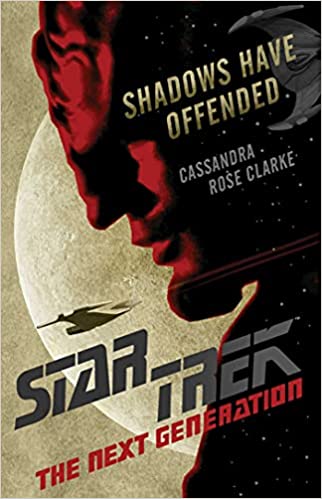
Shadows Have Offended
5th October 2021
An intriguing return to Next Generation novels set during, rather than long after, the TV series, sees us join the crew for two parallel stories - while Picard, Troi, and Worf investigate a crime, Riker, Data, and Crusher explore a new planet. As is traditional, La Forge doesn’t get to do much.
Set during the seventh season, the novel definitely has the feel of a classic TV episode - with the two plots, a smattering of science fiction mixed in with familiar storytelling, and familiar friends.
I had been expecting something a little more focussed on Troi and Crusher though. From the marketing I had seen, I had thought that this would be a novel that focussed on their friendship, which was not deeply explored in the TV series, but instead they are totally separated. Troi feels a bit short-changed in page-time too, with Picard and Worf having more aligned time than I was anticipating.
And I suppose finally I’m not quite sure I got the message of the story. I can’t align the two plots to a common theme to tie them together, and so this breaks away a bit from what otherwise feels quite a welcome return to the familiar settings and storytelling style.

Wonderlands
26th June 2021
Una McCormack’s second Star Trek Discovery novel, and the eighth overall, aims to fill the gap in Michael Burnham’s story between the first two episodes of season three. I’d say this book is spoilery up to and including episode two though, so probably best to watch the third season before reading.
The book follows Michael as she settles in and begins to explore, with her new friends, while she waits for Discovery to find her. It does a lot of world building, particularly of the life and work of the couriers, and explores a lot of themes that feel reflective of real-world life, including isolation at both the individual and societal level.
I found the narrative to be fairly slow going - the book has surprisingly long chapters, and I think this made me feel like I had to really commit to reading each session, rather than just dipping in and out. I was a good halfway through before it suddenly occurred to me that this was mirroring the structure of a season of Star Trek: Discovery - a relatively small number of episodes, each telling a story, but adding up to one big overall arc.
I did have to take a break in the middle to read something a bit faster paced, just to get myself back into the swing of reading, but then when I returned I felt much more comfortable and able to flow through the final chapters with ease.

The Dark Veil
14th February 2021
The second tie-in novel for Star Trek Picard is again a prequel story set some years before the events depicted in the television series (though after the events seen in The Next Generation series and movies). This time the action takes place on the USS Titan, featuring William Riker and Deanna Troi, and tells the story of an encounter with a new species, and some Romulans.
It is worth noting that although this story occurs before the TV series, it would best be read after watching season one, as there are elements which could be considered spoilers.
It’s a great book, along the lines of a classic Trek novel, mixing ongoing galactic politics with an adventure of the week, filled with familiar and new characters. I’m really pleased with how Swallow has blended the new canon of the Star Trek Picard TV series with the alternative world of the USS Titan that has been presented in the novel series, so that it feels comfortable for those readers who are fans of both.

To Lose The Earth
Kirsten Beyer
16th January 2021
Kirsten Beyer’s final Star Trek: Voyager novel wraps up what has been an epic literary adventure over the past twelve years, as the crew take a more intentional second trip to explore the Delta Quadrant.
This feels very much like part two of a single story with a large gap, with all the events following on from things that happened in the previous novel. Given I read the last novel over two and a half years ago (due to the author’s “distraction” working on some TV series), I struggled to remember some of the details.
Like many of Beyer’s novels, there is a strong theme of family, and in particular here one of communication, that’s reflected in many of the plot threads for different characters and at different scales. Beyer hits the right Star Trek notes in producing an episode that tells an entertaining story while also providing a moral lesson.
In terms of the plot, while there are many aspects, the most prominent of the TV characters is Harry Kim, and he’s the star of about 45% of this novel, with another 45% given to one of the novel-series-original characters, and the remainder spread amongst both the old and the new. For a finale, I felt that there was perhaps too little for some of the older familiar characters, but that might be me reading it in the context of a long separation rather than considering the whole ten-book drama.
The end felt a little abrupt, but that might be because my reading speed increased - though there are details that have already faded from my memory after only a couple of days. But it definitely felt like a decent and optimistic endpoint, leaving the door ajar for more maybe one day - once the author stops adding to canon in potentially contradictory ways with her increasingly prominent TV writing career.

The Autobiography of Kathryn Janeway
19th December 2020
I’ve kind of ignored the autobiography series of Star Trek novels until now, because I’m generally a fan of the Pocket Books novel series, and these are published by Titan. However the lure of Una McCormack as the ‘editor’ drew me to get this, the Kathryn Janeway entry in the series.
The book contains a first-person set of reflections on what’s probably one of the most interesting lives in Star Trek. Many anecdotes from the character’s childhood are contrasted with events from the TV series, and the years spent lost in the delta quadrant are covered with an interesting take of nostalgia mixed with some commentary that we wouldn’t get in a different format.
McCormack’s details of the personal thoughts of Janeway are the most delightful aspect of the book. There are a lot of little comments which show a great deal of thought, references that reflect upon our 21st Century lives (and I’m sure some that I missed!), and moments designed to add new levels of depth to the character that’s only possible in this memoir format.
My only disappointment was that I felt it wrapped up too abruptly. I was hoping to see more about what happened for the character after the end of the TV series, but the details here are few, and it almost felt as if the character’s view was that life was more mundane from that point forward. However it’s plausible this was done intentionally, because we now know that Janeway’s television story is not yet complete, and the book might have wanted to avoid being contradicted by canon too soon.

More Beautiful Than Death
11th October 2020
The second ‘adult’ tie-in novel in the Kelvinverse - the timeline established in the JJ Abrams series of Star Trek movies - was written ten years ago but only now published (with tweaks by the author).
We meet Kirk and the crew some time after the first movie, carrying a diplomatic mission to a planet that’s requested aid from the Federation, and of course on arrival things become complicated.
I found however that I struggled to get into it. Each chapter felt like it ended at a convenient point to stop reading - not the level of compulsion to continue that I love. I’m not in general a huge reader of TOS stories, having not got the same relationship with those characters as with those who came later, and here my mental model of the characters has become really mixed - I was picturing Chris Pine’s Kirk, but James Doohan’s Scotty, and Ethan Peck’s Spock - with Bones fluctuating between actors’ faces.
So I’m afraid not one I feel I can recommend. Maybe if it had come out ten years ago I would have felt more connected to it, but at this stage I didn’t, and struggled.

Die Standing
13th September 2020
The latest Star Trek: Discovery tie-in novel is set between seasons one and two of the TV series, though probably is best read after season two because it deals with some characters who hadn’t previously appeared in the series. The novel follows Philippa Georgiou as she is drawn into an investigation into an attack on a starship that bears a striking resemblance to other events in her earlier life.
I find the approach that’s been taken with the Discovery novels - to find ways of fitting their stories around the TV series while trying to avoid being contradicted by later stories - to lead to some really interesting ideas. This is one - sat as a snug side story and yet still compelling and focussing really deeply on one character.
The plot didn’t do a lot for me - the beginning felt a bit forgettable, then the rest of the story quite episodic. I think in part the focus on a character that I don’t particularly like didn’t make for the most engaging read, but obviously this is a character that’s been designed to be unlikable, although this was balanced by some classic villainous campery. However the supporting characters - two in particular - were probably what stuck with me the most after reading - both are to varying extents minor characters from the canon, and my head had an unfortunately tendency to stick the wrong face on one.
Overall, I think an average Trek novel, with probably a bit more in common with some of the classic novels than some of the more recent entries, which is not a bad thing.

The Unsettling Stars
Alan Dean Foster
24th May 2020
Eleven years after the 2009 Star Trek film, the first spin-off novel aimed at an adult audience has finally appeared (it was written back then, but then shelved by the publisher for a decade).
I’ll admit, it took me a little while to get into. I’m not usually a big Original Series reader, but thought that I’d have to give this a go given I’ve seen the three contemporary movies. For the most part, it feels like a good fit for the parallel universe characters we saw in their first film outing, although Scotty felt off, and there were some aspects of the inside of Kirk’s head that I wasn’t convinced gelled with the version of him in my head.
I think I struggled on two other related counts. Alan Dean Foster is a noted writer of numerous genres, including Science Fiction - and this felt a little bit too Science Fictiony for me. Almost a bit too old-Trek-novel too, and not quite fitting with the tone I feel I get from most modern Trek novels. He’s also a fan of describing aliens - and this also doesn’t connect with my imagination in the right way - I’m much more connected I feel to thought and emotion than physical, visual description, and I think Foster perhaps is wired the other way.
The plot is fairly solid, although perhaps a bit too simple in places. Perhaps this is by design, hoping to attract a new audience as did the 2009 film - but to me it felt like some events were too obvious coming, and some twists thus fell flat.
I’m interested to see what the second book from the same situation comes out like later in the year - that one is by David Mack, whose Trek novels on the whole I have personally found more targeted at my tastes.
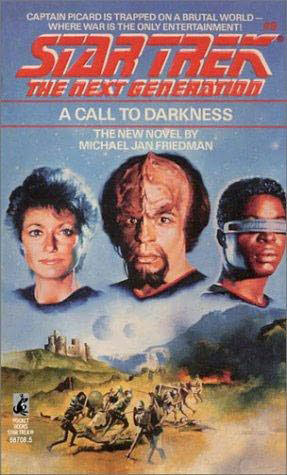
A Call to Darkness
Michael Jan Friedman
10th May 2020
A Call To Darkness, set in the second season of The Next Generation, sees the crew of the Enterprise seeking a missing Starfleet vessel - and following its trail to a world which read as if I was meant to know more about its history that I do. Four of the senior officers beam down - and immediately are cut off from the ship.
For this era of novels, Michael Jan Friedman has done a remarkable job of getting the characters pretty much spot on - Data perhaps being the only one who felt off, but possibly he does better match the Data of the early seasons than the later ones I am more familiar with. The author's world-building also feels strong, with very few elements that feel out of place in Star Trek.
The secondary plot deals with a new deadly contagion spreading through the crew, which was coincidentally timely as I read the novel while the world was in the midst of the Covid-19 lockdown of 2020. The primary plot meanwhile felt incredibly reminiscent of the Hunger Games (written some eighteen years later) which amused me.
I wouldn't go so far as to call this a great novel - the narrative feels dated now and of its era, possibly just in the choice of phrasing - but compared to other Star Trek novels from the late eighties that I've recently read it's at the top of its class.

The Last Best Hope
20th March 2020
The Last Best Hope is the first tie-in novel for the new Star Trek: Picard TV series, in which we return to the era of the Next Generation to find out what’s been happening some 25 years later. The novel serves as a prequel to the series, and fills in the detail of some of the events 14 years earlier, charting how the effects of events depicted in the 2009 movie affected this, the prime timeline, and led directly to where me meet Picard now.
Although the novel was published after episode 3, I think it’s best read after episode 4 - as it covers a lot of the detail of things that are alluded to in the first four episodes, and could be considered a spoiler if you’ve not seen these already. Arguably, you might want to watch episode 5 first too, but I think it works well after episode 4.
I maintain that Una McCormack is one of the best Star Trek authors out there, and I was incredibly pleased to hear she was writing this. It’s an amazingly well told tale of incredibly difficult times, and she successfully weaves in Star Trek’s classic parallels to today without it seeming in any way forced. The characters leap out of the page in a way that’s almost greater than they do on TV - the background really helps in engaging and empathising with them in the TV series too.
I have to be a little disappointed that the new TV series effectively erases a good chunk of the storyline that I’ve enjoyed reading in the novels over the past decades, and this book sits solidly in the new canon, though there are a few small nods where possible. I’m glad however that the reason the novel continuity has ended is positive - that we have a new TV series which is quite possibly the best written Trek yet.

The Captain's Honour
David Dvorkin & Daniel Dvorkin
9th February 2020
This Next Generation original tie-in novel is set toward the end of season one, and published in the late 1980s. It’s fairly typical of the sort of planet-of-the-week adventures common in novels of the time, but the content feels dated.
The Enterprise is called to help another Starfleet vessel which is defending a new member planet from invasion by an aggressive neighbour, but it soon becomes clear that their colleagues have some differences from Captain Picard and his crew.
There’s a lot of focus on a never-before-seen member of the Enterprise crew, and the text has the feeling of having been written (in the first half) as if this role was intended to be filled by Tasha Yar (who the TV series had already killed off) and then rewritten to work by substituting a random.
There’s also a lot that doesn’t gel with a later understanding of the Star Trek universe. The way that Federation membership works, the way that Starfleet crews work, and the backstory of Captain Picard all feel quite off - in some cases they are more Original Series-esque, which I suppose makes sense given the lack of TNG materiel the authors would have had to work with.

Dead Endless
Dave Galanter
1st February 2020
The sixth novel based on Star Trek: Discovery takes us on an interesting journey following the relationship between Stamens and Culber, focussed on a period that lightly intersects with events depicted in the second season - it’s important I think to have watched season two (as well as season one) before reading.
As with other novels in the series, the author has worked to avoid doing too much that could later be contradicted by the canon, but Galanter has taken an interesting direction with this, which I won’t talk too much about. Suffice it to say that it’s genius.
It’s a clever plot, shows the characters emotional depth, builds up slowly, like a mystery peeling back layers on what’s going on at the perfect pace for the reader to keep just one step ahead, hinting slightly more before finally reaching somewhere unexpectedly delightful.
I’ve been really impressed with the Discovery novels so far, and this has to be one of the best. A great tale well told.

Collateral Damage
2nd January 2020
Billed as the final episode in a series of Star Trek follow-on novels that have been published over nearly 20 years, wrapping everything up before the new Star Trek: Picard TV series begins in early 2020 - however that’s not really what it is.
This story does feel like it’s wrapping up some of the threads that have been explored over a lot of books though, with Picard returning to Earth to defend his record, while Worf takes the Enterprise on a complicated mission, which also serves as something of a follow-up to some of the previous events, while doing the traditional Star Trek thing of providing a mirror to our world.
It’s a really good, solid Star Trek novel, that explores a lot of important themes in a way which treats the characters with respect. I did feel in places that it cut between scenes a bit more frequently than I felt necessary - feeling a bit like it was afraid one of the plot lines might be too boring if not mixed up constantly with the other, more action-packed plot.
A happy place if it is the final novel we see from this era of Star Trek - though I hope it’s not, as I’ve got a lot of pleasure over the years from reading these continued adventures - as excited as I am about the new TV series, I hope the novels are able to continue too.

The Enterprise War
27th October 2019
The Discovery tie-in novels seem to be coming at a good pace now - and remain well crafted to serve as prequels and tell stories that are less likely to be contradicted by future TV (although one of them has suffered this fate a little). This time it’s the chance to find out what the Enterprise was up to during Discovery’s first season - it’s probably a spoiler, so best to watch to the end of Season Two before reading this if such things matter to you.
This feels like quite an epic - the story takes place over the course of a year or more - and that give plenty of time for several major events to occur, and for us as readers to get to know several of the main characters in more depth. It follows multiple threads of narrative, weaved together well, and explores some of the frustrations of a deep space mission as well as a variety of perilous scenarios.
I particularly enjoyed spending some time inside the head of Captain Pike, who has felt an underused character in the past, and is only now coming into his prime - and seeing things from his perspective in novel format really adds another layer of depth to his character.
A good prequel, and I hope they keep coming.

Available Light
23rd June 2019
The latest Star Trek: The Next Generation continuation novel successfully balances two plots - one covering the ongoing events from previous novels that have rocked the Federation and a second being a stand-alone mission that the Enterprise is on.
I really enjoyed both aspects of the story. I’m a big fan of the Star Trek novels that have dealt with Federation politics, and spent time with the various presidents, and so happy to see some more of this. Ward has also crafted a lovely stand-alone story that feels like an episode of the television series, but uses the opportunity of a novel to tell a story that wouldn’t have been possible with the television technology of the 80s and 90s.
The grasp of the characters is excellent, both for those that we’ve known for decades and the newer characters who have been introduced in the novels and who get to play a large part here. They now feel as much of the family as Picard and Worf.
A great continuation novel - but probably one that requires a decent knowledge of the novels that have proceeded it going quite far back. There’s at least one more on the way for this TNG universe, and I’ll be sad if that’s the end - because the existence of a new Picard TV series may mean that this version of the Trek future is overwritten, and it’s been a fun journey.

The Way to the Stars
28th April 2019
The fourth novel based on the latest Star Trek series, Discovery, is the first written by a woman, and I’m slightly surprised that sums wasn’t asked to write one sooner, both because the show has made a point of focusing on its female characters and creators, and because Una is probably the best Star Trek novelist currently writing.
This book tells some backstory for the character Tilly, a cadet when we first meet her on TV, but here a high schooler. It draws on a number of character moments dropped into the series, particularly Tilly’s relationship with her mother, and creates an excellent story intertwining coming-of-age, boarding school, space adventure and much more.
My favourite of the Discovery novels so far - not the same sort of adventure as the earlier three - but much more fitting for Tilly and in keeping with McCormack’s usual trick of telling a character story that’s incredibly engrossing. A must read for anyone who loves Discovery and Tilly, and recommended for everyone else too.

John Vornholt
23rd January 2019
A Star Trek: The Next Generation novel from (probably) the late 80s - set during the second season of the TV show (as evidenced by the presence of Dr Pulaski) and seeing Picard and several of his crew marooned on a planet where an old Earth colony has evolved into something resembling mediaeval Europe.
The plot is interesting and keeps moving at a good pace - there’s multiple threads going on and lots of the characters get to play. However it also feels a bit odd - there’s a visiting Ambassador who is typically troublesome, and this feels like it’s a bit of an over-used Trek trope.
John Vornholt has, following this novel, written quite a few Trek novels, several of which I’ve read - but it’s quite clear in this one that he’s in his early days of familiarity with the TNG crew. There are some elements which are clearly just things that the series hasn’t addressed yet, so they weren’t contradictions at the time of writing - but others (such as using the letters JG in ‘Lieutenant JG Worf’ as if they are the character’s initials rather than part of his rank) that wouldn’t slip through the net today.
So, not a perfect novel, and one that feels slightly dated having seen what the whole of TNG is like (well, to date) - but still an entertaining one that’s worth reading even if you aren’t a completionist.

Fear Itself
31st July 2018
The third novel set in the time of Star Trek: Discovery, the latest television series in the Trek universe. In this story James Swallow writes about Saru during his time serving on the USS Shenzhou patrolling the Tholian border.
It’s a fascinating exploration of Saru’s character that takes what we’ve learned about him in the TV programme and expands upon it - showing a step in his journey towards what the events of the show force him to become.
The plot feels like a fairly standard Star Trek novel, which of it had featured any other series’ characters might have been a little mundane. The addition of the Discovery characters though gives it the extra dimension it needs to tell an engaging story that makes the reader believe in and understand the characters in more depth.
Another enjoyable Disco novel. I hope that there are more on the way, perhaps continuing the trend of exploring a different character each time.

Architects of Infinity
26th May 2018
The latest in Kirsten Beyer’s continuation novels for Star Trek: Voyager is a little more of a stand-alone story, as the crews of the Full Circle fleet discover a new planet, and a new element, and decide to take some shore leave. As is typical with Starfleet shore leave, it’s not as relaxing as might have been hoped.
It’s actually one of my favourite of the Voyager novels of the past few years. I think I like that it’s an enclosed story with little of the continuing narrative, which I struggle to remember well enough when episodes are months or years apart. I also appreciated the spread of characters, ranging across those we know from the TV series (which finished, somehow, 17 years ago) and the new characters introduced in the novels.
As with much of Beyer’s writing, this story has a strong family element. When she started writing the Voyager continuation series this used to annoy me - I found it a bit ‘soppy’ and not what I was expecting. But as I’ve matured and grown older, I’ve come to appreciate it more, and find myself feeling much more sympathetic to this part of the characters’ lives.
A good Voyager novel, and one that keeps me encouraged to continue reading, despite the reduced publication speed while Beyer is busy making other Star Trek.

Drastic Measures
25th March 2018
The second novel based on the new Star Trek television series, Discovery, is set some ten years before the series and gives an insight into the backstory of two of the secondary character - Philippa Georgiou and Gabriel Lorca. Serving in Starfleet as Commander and Lt. Commander respectively, the two officers’ paths cross when a (later infamous) famine breaks out on a distant colony world after crops are infected by a deadly fungus.
I think this is a really good story, better than the previous novel, using these side characters really well to tell a tale that provides extra context, but not interfere with the direction that the television series is taking. It also of course provides an opportunity to tie elements of Discovery in with events mentioned in other series.
It’s hard to say a lot about the plot itself without dropping in spoilers for this novel or the first season of the television series (the book is intended to be read after season one, I think, through after episode 12 should be fine). My memory of some of the elements referenced was a little rusty, which I think helped build some tension as I couldn’t remember what had been established in canon, though also distracted as there were elements I had mis-remembered.
A good novel to tide me over until there’s some more Discovery on TV.

Fortune of War
20th January 2018
After a two year gap, this new stand-alone Star Trek: Titan novel follows the crew as they investigate some recently discovered Husnock technology which is in great demand from a number of different civilisations in the alpha quadrant.
It's a great little story that has a lot of twists and turns, as the plot rolls onward in an episodic fashion and we move from one hurdle in the plans of both the Starfleet crew and their antagonists. Mack has constructed quite an elaborate narrative that keeps the reader surprised and entertained.
A good stand-alone adventure by one of the best Star Trek authors.

I, The Constable
Paula M Block & Terry J Erdman
2nd January 2018
A third e-novella from veteran Trek experts Block & Erdmann, continuing the Ferengi theme, as Quark returns to Ferenginar following the news that his uncle has died - but when he fails to return Odo follows to investigate.
It’s a fun little story, with the interesting setup that Odo has been reading 20th century crime novels, and the book follows that structure, with Odo dropping in the odd reference now and then.
A good fun little story that I enjoyed reading. I hope the publishers can continue this e-novella mini-series going as they are beautiful little tales that really show the depth of the authors’ knowledge of and love for the series.
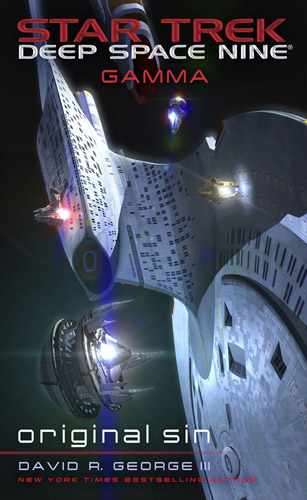
Original Sin
David R George III
22nd October 2017
David R. George III has become the main author of the ongoing Deep Space Nine adventures, and this is the next step in his juggling of the number of storylines needed for such a wide ranging series. This novel focusses on the Sisko family, as Captain Sisko's ship, the USS Robinson, heads off to explore further into the Gamma Quadrant.
I'm struggling to work out how to review this without making it too spoilery... let's say that there are two plotlines that run through the book featuring a number of parallels, which answer some of the questions those of us who have been reading for (technically now) decades have been asking.
George performs the masterful Star Trek trick of tying together real science fiction concepts and exploration of new worlds and cultures with metaphorical reflection on our own society, with only a little thought required on behalf of the reader to understand the analogies and the lessons intended for the audience.
While Ben Sisko isn't generally my favourite DS9 character, and its huge ensemble cast being one of the reasons its my favourite Trek series, this is a solid entry in the continuation and one that I'd happily recommend to anyone who is reasonably caught up - there are very few elements that require the reader to be fully up to date.

Desperate Hours
14th October 2017
David Mack has the honour and challenge of being the first tie-in author to dip his feet into the world of Star Trek: Discovery - the seventh TV series in the franchise. As a novel released the day after the first episode is broadcast, it's hard not to take anything it says with a pinch of salt (remember Data's backstory from the novelisation of Encounter at Farpoint - later completely changed by the TV series), but it seems Mack has had full access to the writers and scripts from the TV production team and the series is being written as one whole rather than discrete episodes, so maybe this will stand the test of time.
This story is set a year before the opening episode of the TV series, and sees Burnham as a newly minted first officer facing a distress call from a rebel colony. It also features a guest appearance by a familiar ship and crew member and goes some way to dealing with some of the questions that long term audiences might have. That said, I do wonder if these aspects are being explored only in the novels what the point was/is of having set the story up in quite this way for TV.
It's a fairly average Trek novel actually. A bit reminiscent of the early TNG novels in terms of the plot. The pre-TV setting is good as it means Mack is free to play around with the characters and not be bound by putting them back in the box. He does a fair bit to give background to both Burnham and Saru which goes beyond what we've learnt from TV, and this to me is what makes the book most compelling.
Conclusion: if you like Star Trek novels, or want to like Star Trek novels, then go for it. If you're new and curious, up to you. If you only watch TV, then carry on watching TV.

Patterns of Interference
Christopher L Bennett
9th October 2017
Another Enterprise novel continuing the adventures of the crew, who have long since gone their separate ways. It’s a bit of a strange standalone novel that really does need he background knowledge from reading earlier stories to follow.
A number of storylines seem to battle for attention, and it feels a bit like Bennett is struggling to find things for all the characters to do - one of them in particular, while having an interesting science fiction experience, has a fairly tenuous thematic link to the rest, and I felt was a little underplayed what message it was intended to be sending.
Meanwhile the ‘main’ plot showed some interesting parallels with issues in the current news, but felt a bit patchy in construction and rushed in places it might not have been.
Overall, I think it’s a weaker novel that spreads a bit too thinly quite a lot of different storylines rather than picking one to do really well. It does however have one of the best sneaky little jokes in the narrative that I’ve seen for quite some time!

Enigma Tales
26th July 2017
Una McCormack, probably my favourite of the current crop of Star Trek authors, returns to Cardassia for this excellent and deliciously Cardassian tale.
Doctor Pulaski is visiting Cardassia to receive an award, but events start to unfold in interesting ways as Garak moves toward retribution for the crimes his people committed during the occupation of Bajor, and new details about those crimes start to come to light.
I can hardly believe how complex this story is, weaving in threads from across DS9 and earlier novels with the richness of Cardassian society. Both drawing on previous adventures and doing some worldbuilding of her own, McCormack paints an amazing picture of a world growing form its past. I love some of the clever symbolism that weaves in around flowers, art and literature, particularly the focus on the enigma tales, and how these reflect back into the plot. I also loved the setting in a Cardassian university, clearly something the author is well aware of herself, and this really comes across as something there's a deep understanding and appreciation of.
The presentation is good too. The chapters are long, and interspersed with letters written by Garak, which serve to develop both character and, subtly, plot. The tone is quite casual in places (especially the start) which gives another feeling of Cardassia, as it's reminiscent of Garak's storytelling in the TV series.
In case it's not clear, I think this book is great, and I hope for many many more from McCormack. I would strongly recommend reading David Mack's novel 'Control' first though, as one of the plot strands here follows on directly from that novel.

Hearts and Minds
19th July 2017
A new entry in the Next Generation continuation series, this follows a long line of novels taking the story of the Enterprise and her crew forward several years from the last time we saw them on screen. Despite that, this does serve as a pretty stand-alone story in the classic style.
The Enterprise is exploring and comes across a planet that nobody’s made contact with before, but then strange orders arrive from Starfleet Command, and Picard is left to investigate without really understanding.
It’s a great mystery thriller, with a new premise that harkens back to some of the classic tropes of the series. It’s also the third entry in the author’s pseudo-trilogy featuring callbacks to the 20th & 21st Centuries - though having not read the first two (they are Original Series novels which I generally don’t read) I can’t comment on how it fits into that.
An enjoyable adventure, and one that mostly stands alone. But if you are reading everything, I’d recommend this is read after David Mack’s ‘Control’, as there are some references.

6th May 2017
Control is possibly the darkest Star Trek novel I've ever read, and I've read quite a lot of them. It continues Doctor Bashir's quest to destroy Section Thirty-One, and also lays out a lot of new information about the organisation, its origins, and the mysterious 'Control', who runs it.
It paints a very different and revealing picture of the Trek universe, spanning the life of the Federation from the pre-Enterprise era and dropping in hints of arcane bits of Trek lore and how they tie in. One that continues the mission of mirroring the 21st Century in which we as readers live.
But as well as that it's a thrilling adventure that pits Bashir and his allies, a cast pulled from both DS9 and TNG, against their nemesis across known space as they try to stay one step ahead of their omnipresent oppressor.
So, dark, revelatory, and fascinating in how it retells some of the familiar Trek story while remaining and entertaining adventure. Slightly scary though.

The Long Mirage
4th May 2017
Another episode in the ongoing continuation of Deep Space Nine, my favourite of the Star Trek television series, The Long Mirage tells three parallel stories focussing on some of the most interesting characters. Kira Nerys, returning after an interesting trip, and discovering her religion in schism. Ro Laren, exploring relationships and joining the hunt for a missing person. And Nog, trapped in a holosuite (but not quite in the usual cliched way).
It's a fun novel, which is a good thing to fit into the Trek release schedule amid the long trilogies of 2016 and the somewhat darker other publications in the 2017 schedule. It's good to see some of the characters who make the TV series entertaining, as well as some who are new or were secondary before.
The trio of stories helps to make the novel feel like it's moving well, and it's nicely paced to bounce between them at the right intervals. It does feel for the most part though a little as if there are three novellas just intercut, but I don't think that's a problem as it does mirror quite nicely the way some of the episodes are structured.
Another excellent DS9 story from David R George III, and one that continues to keep me waiting desperately for the next book to learn how the adventures continue.

Headlong Flight
18th March 2017
After the second half of 2016 focussed on blockbuster trilogies to celebrate the 50th anniversary of Star Trek, it was nice to get back to a simple, stand-alone adventure for the crew of the Enterprise. Or not that simple in-fact, because in this novel (as the cover strongly implies) there are two Enterprises.
This book is very much a stand-alone, and it felt a bit weird returning to that headspace after such grand adventures. I kept expecting something earth-shattering to occur to change the direction of the whole series, and felt a little bit let down by the story that perhaps didn’t have quite that resonance.
On the other hand, being a stand-alone meant that Ward was able to do some fascinating things with the characters, and show us some of the things that might have happened on the Enterprise-D. It was good to spend some time with some other familiar characters and to see the effect that the two crews had on each other.
Overall, this story read like a good episode of the TV series. And what more can you ask. It’s was contained, entertaining, and showed some interesting variety. A happy diversion to read.

The Hall of Heroes
28th February 2017
The third and final book in this trilogy celebrating the fiftieth anniversary of Star Trek wraps up the Next Generation era of a complex war inspired by a radical Klingon business administrator come politician.
It's a good adventure with a lot of threads that tie up well - but it does suffer a little from that feeling of being a final episode where the toys need to be put back in the box. There were a few surprises, and some things surprised me by not coming to pass, but overall it could have been a little more radical.
Okay, so I've left it too long since finishing the book to write this properly. I've become complacent with my reviews over the past year or so and not kept up like I used to. Must do better.

The Jackal's Trick
20th December 2016
The second book in John Jackson Miller's Star Trek trilogy, part of the series' 50th anniversary celebration, continues the tale of a Klingon warrior who has surprisingly risen to prominence, as well as several of his compatriots - and the cast of The Next Generation who are once again stuck in a diplomatic struggle rather than out exploring.
As is typical for Star Trek, there are some surprisingly relevant allusions to occurrences in our world, whether intended or not, which makes the reader long even more to find out how things are going to go and how at least one of the worlds they love will end up all right. I did detect a tiny feeling of repetition though, with some novels earlier in the continuity following a plot line with some similarities.
Unlike many trilogies, this middle book doesn't have the feeling of just shuffling things between the end of the beginning book and the start of the concluding book, but instead tells a full story in itself that features a lot of action and a satisfying resolution. There's a lot going on, of course, and many threads still hanging for book three but it certainly stands well alone.
A great Trek novel in a great Trek trilogy. So far my favourite trilogy of the year.

Hell's Heart
18th November 2016
This is the first book in a new trilogy - the second celebrating the 50th anniversary of Star Trek - focussing on The Next Generation crew and being a part of the continuing adventures told in the novel series. Picard and the crew are dispatched on a diplomatic mission to deliver a Klingon house to a celebration of an old battle, but as usual complications arise.
Despite the main storyline following TNG there is a pretty chunky Original Series act in the story with some star turns by Kirk and Spock, which serves to give some background and set up events in the later era.
It's a great story that uses a bunch of familiar characters really well and sets this up to be an excellent trilogy. The plot is deliciously complex pulling on strings from throughout the Trek canon and unwinding them in new and interesting ways. The new characters are rich and compelling and draw the reader in to their intrigue.
An excellent tribute to the series, and one that leaves me desperate to continue the story with book two.

Purgatory's Key
Dayton Ward & Kevin Dilmore
8th October 2016
The third and final part of Star Trek's fiftieth anniversary celebratory trilogy follows Kirk and his crew, and selected special guests, as they attempt to tie up the many problems that the last two books have raised.
Ultimately I suppose that is where this story suffers - it doesn't really have the chance to set up its own internal plot, but instead is left to put the toys back away. While this does lead to some interesting quite science fictiony concepts that get explored, it also drives a secondary plot which seems bolted on and doesn't seem to add much other than to delay the conclusion of the story. I also felt that some of the detail went over my head - whether because I missed something key or something key was missing - which meant that although I got the ending it wasn't entirely clear how or why we had got there.
The characters didn't all feel quite as fleshed out as in the previous stories, and I didn't find them as engaging, particularly the special guests. It also felt in places like this novel had been written without an understanding of what was happening in the others, as several scenes have characters reflecting on having not done something before that they had only just done in the previous book.
Overall it did well at wrapping things up, but I don't think it was as strong as the other novels. Admittedly, I'm not really an Original Series fan and so might not be the target audience, but it hasn't done anything to make we want to pick up anything else from this era in the near future.

Best Defense
The second book in this trilogy celebrating the fiftieth anniversary of Star Trek, follows, at least in part, on from the end of the first book, dealing with the aftermath of that book's final revelation and Number One's mission into the unknown.
To me, the more interesting part of this story was a major subplot about a peace conference between the Federation and the Klingons, that gave an opportunity to bring back some more favourite characters and to introduce some fascinating new ones who add a different dynamic to some of the storytelling.
I'm not a massive Original Series junkie, and don't tend to read the novels set in that era most of the time. While I did enjoy this book, I found it tough to get into for the first half, and would read a chapter or three before needing a break, but as the plot picked up I found I was more and more drawn in.
There were a few great segments spent with some of the lesser characters and I think I liked those more than the parts with the most central of the characters. Will certainly be picking up the final part of the trilogy, but then I'll probably not revisit TOS until the next major anniversary.
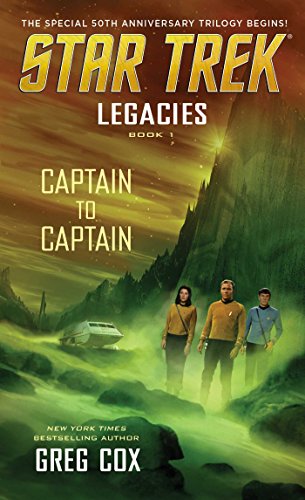
Captain to Captain
19th August 2016
I'm not really into reading The Original Series novels - being that my interest in Trek began in the late 90s (the first novel I bought was from August 1998) and even then TOS seemed incredibly dated to me. That said, this is the 50th anniversary, and this book is the first in a special celebratory trilogy, and so it felt only appropriate to get and read it.
The story takes place on the Enterprise, where a former crew member, Number One, has popped by for a visit which quickly becomes interesting for Kirk and Spock. Fundamentally, Number One (the first officer from the original pre-Kirk Star Trek pilot) is the star of the show here, and we follow her viewpoint for much of the story.
It's a good, action-packed tale that includes a number of concepts and familiar elements from the history of the franchise, mentions more, and introduces some interesting new aliens and artefacts that will clearly have ongoing involvement in the trilogy. I got more and more into the story as it progressed, much more than I expected for a TOS story, and really enjoyed reading it.
I’m now sitting desperately waiting for the second story to appear in my frequented set of bookshops so I can find out where the story is going to go next.

Rules of Accusation
18th August 2016
The second Deep Space Nine novella from Block and Erdmann, this story follows Quark in what would equate to one of the lighter episodes of the TV series, as he attempts to organise a party.
Compared to most literature in the Star Trek universe, this story is incredibly light hearted and comedic, the narrative full of jokes and references both to Star Trek and other pop cultures. It makes for a nice light break from the more serious adventures that we've had more recently.
It's a great little story that I enjoyed massively, and I hope Block and Erdmann become regular contributors to the literary canon.
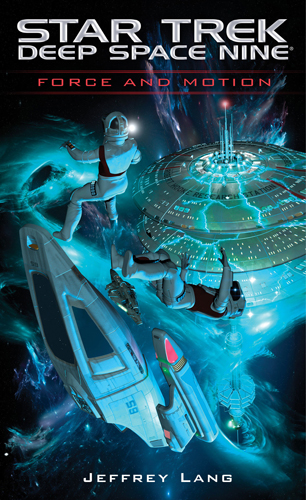
Force and Motion
Jeffrey Lang
6th July 2016
Jeffrey Lang returns to the Star Trek Novelverse with a book that, like his previous entry, takes place away from the ongoing narrative of the series. This time we join O'Brien and Nog as they head off on a slightly weird holiday to visit a former colleague, Benjamin Maxwell (who appeared once in a TNG episode).
It's a good fun adventure story. I really liked how it explores Maxwell in particular, reflecting in flashback over much of his life and exploring how he had evolved as a person over maybe twenty years since we had last encountered the character.
However the parts of the plot set in the 'modern day' part of the timeline were quite confusing, and I never really felt like I had a good understanding of what was going on, what the various characters' motivations were, and why events were unfolding in the way they were.
I've also become used to the novels telling a chapter in an ongoing story, tugging on threads left by earlier novels, leaving things dangling for the future, and evolving the characters. I didn't fee that this book did that - instead being much more in the 'toys back in the box' mould of earlier novels, and I found that quite frustrating that it just seemed to be an adventure rather than moving the lives of the main characters. It could be that I'm totally misremembering this though as its a few weeks since I read it.

Live By The Code
20th April 2016
Christopher L Bennett's fourth book in the Rise of the Federation series, telling the missing history between the end of Enterprise and the start of The Original Series, follows the various crews off the fledgling Starfleet as they discover the need (again?) for some kind of non-interference directive.
Like some of the best episodes, the story features an A- and a B-plot featuring different groups of characters to ensure all get some page-time. One of the plots works nicely as a stand-alone tale, but the other is a direct follow-up to earlier books in the series and I felt my reading experience would have benefited from having a fresher memory of what came before.
One of the themes of this book is relationships, both in the obvious sense between cultures, and between individuals, and Bennett seems to use the opportunity of revisiting Denobula to throw in some other relationships that fill out the Trek universe and add some much needed diversity.
Overall, I wouldn't group it with my favourite Trek novels, but it certainly stands up well and tells a good story. I'm enjoying following the adventures of this group of characters beyond the short lifespan they received on television, and I hope Bennett is able to continue and that his work won't be contradicted by forthcoming additions to the Trek cannon.
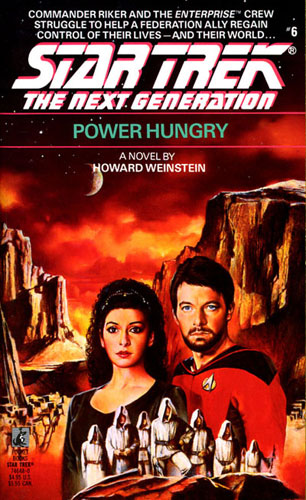
Power Hungry
Howard Weinstein
19th April 2016
A fairly run of the mill Next Generation novel set during the second season, in which Picard and his crew find themselves in a tricky prime directive situation when escorting aid to a planet suffering from extreme climate change.
It's clearly an epistle from the author on the threat that the world faces from a changing climate as a result of human activity, and though this fits with the traditional Trek ethos of pointing a mirror in the direction of the twentieth century, it's delivered with such a lack of grace that it feels like the message is being hammered home at the expense of a thrilling plot.
The author makes some attempt to introduce some new elements of characterisation amongst the crew, but largely this falls flat by virtue of it not being able to be picked up on in any later stories, instead feeling like it's just been dropped in because he felt he had to use all the characters even if they weren't necessary to his plot.
It's not an awful book, but it certainly didn't grip me or excite me about where the story was going, and rather than inspire me to think more about the issues brought up, it's kind of saddening that we still haven't done anything to rectify our own situation some 25 years later.

A Pocket Full of Lies
25th March 2016
Kirsten Beyer, holder of the Voyager torch for the last few years, provides us with another trip to the delta quadrant to see the crew again. This time it's a stand alone novel that revisits a couple of the alien races met during the TV series. This makes for a nice change after the last few novels which have been a continuing arc.
It's a good story that focuses on the idea of family. While a of of Voyager has that family feel to it, I do think that it's been a bit over done in the books of late, and it really does feel in this story that there's a bit too much focus on this theme this time which seems repetitive.
The story here though is really well constructed from elements of the TV series and some earlier novels, woven together into a main plot that flows nicely, visits a number of spaces, and sees several developments that have potential to lead to more stories in the future.
For the most part, an enjoyable visit to this part of the Trek universe. I still think that some more variety in the authorship would be good for the series, but this one works well.

11th February 2016
The latest Deep Space Nine story is a direct sequel to 2015's Sacraments of Fire but the same author and continues the two threaded story which serves to fill in some of the blanks left in the continuity by an earlier massive jump forward in time between books.
Unlike the previous story though this one is, for the most part, separated info to distinct chunks of narrative, one in each time period, rather than interweaved throughout which makes things easy to follow if perhaps slightly less interesting. The first half has the added benefit of being presented at a markedly different speed from most Star Trek novels, which actually works really well and keeps the narrative flowing in a great way.
As well as filling in some gaps and advancing the overall plot of the DS9 story, the book focuses in on a number of the core characters, moving their individual lives around and digging deeper into their characters, while managing to set off plenty of new threads to follow up in future stories.
Another good story from the current curator of my favourite Trek series, which fans have been waiting for for some time. I enjoyed out, but was left with a sense that it could have covered more, and now I'm desperate for more, which may not be coming until next year as 2016 is filed with TOS and TNG stories for the fiftieth anniversary.


Strike Zone
4th December 2015
Book five of the Next Generation tie-in novels sees us joining the Enterprise D crew early in the second season, dropping references all the way through to some of the new aspects of the show that have been introduced - Riker's beard, Crusher's absence, Pulaski's presence, and the arrival of Guinan and Ten Forward.
It's also the first Star Trek novel by now-veteran author Peter David, one of the most famous authors in all of geek literature, and I'm amazed at how much he was allowed to get away with even back in the eighties. This is probably the most hilarious piece of Trek fiction I've read in all seventeen years I've been reading it. Right from the start David is joking around with the characters, especially Riker, and this makes it into a very entertaining novel that survives the decades between publication and reading extremely well.
What sadly hasn't survived intact is some of the background that David supplies for his characters. There's a lot of backstory and exposition that is later massively contradicted by later episodes (especially relating to the Klingons) or that the TV writers had probably planned but never followed up on (Picard/Pulaski). Despite this being me out of the plot a little, it's good fun and interesting in itself to see what was going through the minds of the writers back this early in the series.
Finally, the plot of this specific novel is also good - both the A and B stories are interesting and serve to explore the world well and bring up a number of points that deserve reflection and thought. I was intrigued to see the introduction of one character from a species over read about before I later Trek books by other authors, and I didn't expect to see inter-novel connections like that from so early on. Bit disappointed though that he's consistently referred to as an elf through the story, as that feels a tad racist.
Overall a really good and enjoyable novel and one I'm glad that my re-read brought to my attention. I'm now looking forward to reading more of David's output as I continue the series.

Sight Unseen
5th October 2015
The latest novel in the Titan series follows the crew of the starship and Admiral Riker as he continues to get used to his new role. Dispatched to a new frontier, the crew receives a distress call from a friendly vessel and heads off to help.
The book starts like many Trek novels and also follows the recent convention of telling sequels to episodes of the TV series. The first half moves along at a reasonable pace but feels like it's lacking something and didn't grip me as much as I had hoped. There were moments where I phased out and had to take a step back a page to catch back up with myself.
The second half though was excellent. The pace ups and we get a strong blend of action, intrigue and a range of characters having interesting moments. I really like how Swallow takes some of the newer characters and gross them through the novel to the point where it feels like you've known them forever - a trick that would be beneficial to some of the other recent Trek tie-in novels.
That said, some of the other characters that we've been exposed to for a while seemed to get much less attention and two of the subplots felt shoehorned awkwardly in to reshuffle things in a way that didn't have much bearing on the plot of this book.
Overall though the second half really impressed and entertained me, and it was definitely worth reading the first half to get there. An excellent adventure and well used characters. I hope for many more books by Swallow in the years to come.

The Returned part three
24th September 2015
The final part of this new New Frontier adventure follows up on everything we've seen in parts one and two. There are several vaguely interconnected threads that tie the characters together and demonstrate that Peter David still has what it takes to produce a solid, funny Trek adventure.
As always, the story is filled with imaginative twists, unexpected events (some very surprising!) and humorous moments that made the early New Frontier stories fantastic.
I'm pleased with how David has closed things in a little, focussing back on the original characters and enabling new readers to be drawn in (and old ones to remember). The trilogy as a whole has really impressed me - I'd been scared that it would be terrible, but actually really enjoyed it and hope that there will be more to come.

12th September 2015
Voyager is back for the seventh story in Kirsten Beyer's re-relaunch of the series, and she must be doing something right because the publishers keep hiring her back. Sadly, I'm not so sure I would in their place - although there are some parts which remain fantastic, much of the book did little for me.
This is also the third part of a trilogy - and the combination of being books 3, 7 and 9 in a series leads to the many plot threads being a little confusing. Going in, there are at least three separate stories going on - one on Earth and several in the Delta Quadrant, featuring a range of characters both from the TV series and that have been introduced since.
My main issue with this book is that, despite having read all the books so far, I don't feel like I know the characters or where the plot has got to. One of the plots deals with TV show characters and some aliens which have come up at various points through the earlier novels, but I didn't feel that I'd ever been engaged with those plots sufficiently to feel concern for the characters and an urge for them to succeed. Another plot line followed new characters only, from one of the many ships that have joined Voyager's mission - and again I don't feel like I've had enough memorable exposure to the characters to make their plights engaging.
The one plot that did grip me was the one set on Earth - it featured a number of characters I'm familiar with, both from the TV show and from the wider novel series, where they've been well established and implanted into my memory by strong us by multiple authors. It had a strong plot which I was motivated to understand and follow and I was engaged in the idea that the characters solve the problems they face. This plot line as an entire novel would have really gripped me, but instead it's presented as the B-story. In all, this left me really looking forward to those chapters which followed the third of the story that interested me, and phasing out during the other scenes.
I really want to enjoy reading about Voyager and the characters that I've grown to know over many years, but I think it might be time that the focus was reviewed for the novel series - to tie it back to characters that the reader knows and is interested in, and to provide more standalone stories that don't assume an in-depth knowledge of the novels that have gone before.

The Returned part two
21st August 2015
The second part of Peter David's new e-novella trilogy about Captain Calhoun and the crew of the Excalibur follows directly from the cliffhanger at the end of part one, as the ship investigates a pocket universe while attempting to recover missing friends.
I found the secondary plot more interesting though - focussed on events on New Thallon and flashbacks giving new insight into the background of the Thallonians who have played such a big part in the New Frontier series.
Overall though, although it was funny, action-packed and fun to be back with the core of characters, it does feel a lot like a middle, and this part doesn't seem like it stands alone as well as the first ebook. Strong setup though for part three, which is only a few weeks away.

The Returned part one
26th July 2015
It's been a few years since the last outing of the USS Excalibur as part of the novel-only Star Trek: New Frontier series, and I had thought that the series had run its course. I’ve been reading the stories since they began in the late 1990s, and although I found the first couple of tranches very enjoyable, felt it had lost its way toward the later end of its life.
So I was surprised when 'The Returned' was announced - a set of three ebooks continuing the adventures of Captain Calhoun and his crew. And, despite having little recollection of where the most recent books had left the characters, I found it easy to pick up and get back into this world.
Peter David gradually reintroduces the key characters, and it feels a bit like he's going around getting the band back together. This first part of the story is very much focussed on laying the land - getting the characters into place, getting the reader up to speed, and introducing some of the elements, both new and old, that will come into play (presumably) in the following two volumes.
A very satisfactory short story and introduction to this trilogy, and one that I felt served well as a reintroduction. I’m definitely going to continue reading with the remaining two ebooks over the coming months, and hope that they are just as good.

Sacraments of Fire
10th July 2015
The Star Trek litverse returns to Deep Space Nine in a book that runs parallel to the events of the 'The Fall' mini series, as well as some of the stories that followed it. It also begins to fill in the major DS9 continuity gap that was left between the original relaunch novels and the Destiny trilogy.
It's difficult to describe the plot without spilling spoilers all over the shop - but it's a great ride that catches up with a number of characters from the series and truly does them justice. George's writing captures the spirit of DS9 and weaves a fantastic tale from the various threads.
One of the things I like most about George's novels is that they don't make an assumption that you remember everything that has gone before. He's got the balance just right to fill you in with what you need to know without it feeling like a full recap. There are also subtle hints at things from other stories that make you smile if you spot them but don't break your flow if not.
Another great DS9 novel and I hope for many more to come, not least the immediate follow up which is due in the winter.

Armageddon's Arrow
20th June 2015
The Enterprise E returns to regular missions after the novel continuity's recent upsets, and this does feel a lot like some of the older novels - much like an episode of the series rather than part of the ongoing story, and that's really great.
While investigating a potential first contact, the Enterprise comes across a drifting spaceship with a mysterious provenance, and the crew have to deal with the repercussions of this discovery on the local planets.
It's great to spend some time exploring something new, and Ward has created a fascinating scenario that allows him to plant a number of references to various of the TV series, follow up on a few of the new and old characters, and provides some real tension and intrigue.
As much as I love the ongoing arcs that flow through these books, it is nice to have one that's mostly stand-alone, and I'm glad that Ward had the chance to deliver this one. It's good to see one of my favourite crews back on the road again and I enjoyed travelling with them.

Uncertain Logic
25th May 2015
I didn't fall in love with this, the third of Christopher L Bennett's 'Rise of the Federation' novels - a series of sequels to the TV series 'Star Trek: Enterprise'. There are several plot threads running through that don't really seem to tie together - leaving it feeling like a middle part in a longer story. Archer and T'Pol are drawn into the mystery of a missing Vulcan artefact, Reed, Tucker and Mayweather chase some aliens who like abducting people, and some other character lose me in the intricacies of their plotting.
The mystery at the heart of one of the plot lines didn't really feel like it was being investigated properly, more that random events and accidents led to a conclusion, all the plots suffered (for me) by being too reliant on things that occurred in previous novels or episodes. Usually in Bennett's books the references back are bonuses which reward the loyal reader/viewer, but in this instance it felt like I was missing out by not remembering all the detail.
The best bits of the book are the character moments, particularly around Hoshi Sato's character, which is really being developed well in the novel series. I also enjoyed the experiences of Archer, whose ultimate destination I do already remember from previous 'episodes', but is fun (though sometimes slightly awkward) to watch him moving toward.
Ultimately though this feels like a fairly run-of-the-mill episode for Enterprise, and I didn't find it as enjoyable as the previous two books in the series.
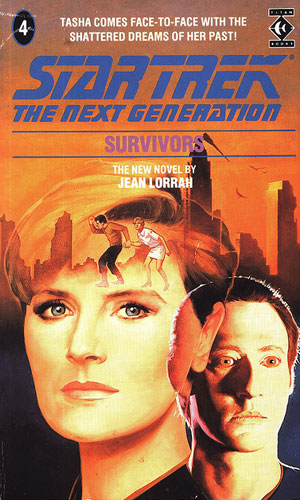
5th April 2015
Survivors is novel number four in the original Star Trek: The Next Generation line, and is set somewhere in the middle of the first season, between 'The Arsenal of Freedom' (which it references) and before 'Skin of Evil' (which is also referenced and foreshadowed). The author having had the benefit of knowing what happens in 'Skin of Evil' has made this into a fantastic character exploration and backstory reveal for one of the least served main characters of TNG - Tasha Yar.
In fact it also deals with Data very well too - getting his character much more accurately representing the one in the first season than some of the earlier books, which would have been drafted before the series aired. This makes the novel feel an authentic part of TNG storyline rather than a side tale in a parallel universe and I really enjoyed getting to read it.
The plot is also a strong one, though one that since has become something of a template for science fiction and Star Trek's prime directive stories. It makes good use of the characters to inform the story though, and uses quality science fiction fare to create a tale to put the characters in. The story flows well, and although its clear what some of the twists are going to be, it's so obvious as to be clear that you're meant to be expecting it and so doesn't feel like bad foreshadowing.
A really great early novel that's pleasantly surprised me again - when I started this re-read I was expecting the early novels to be dire and I have been proved wrong again and again. This should be one for any fan of the early years of TNG, and Tasha Yar in particular, to read.

Seriously. This is epic. If ever there was the Star Trek novel that cried out to be a film this is it. When Will Riker commandeers Ezri Dax's ship, the Aventine, and sets out on some unusual missions, Captain Picard is obviously the man to send after him.
The thriller kept me gripped solidly throughout and every page - from character moments with our friends, to exploring new relationships, to mega space battles - was fantastically crafted to provide a great reading experience. The story is very engaging and inescapable as a reader. I loved every single moment.
The author has a fantastic grip on the wide range of characters that make appearances, although I must admit the size of the cast meant that there were a number of them who didn't get as much page time as I would have liked. The new characters he introduces, particularly the Romulans, have a lot of depth and aren't the run of the mill bad-guy-of-the-week characters that sometimes appear.
The best Star Trek adventure novel for a long time - absolutely loved it and have all my fingers crossed that Miller will be invited back to contribute more to the canon.

The Missing
11th February 2015
Finally! A new DS9 novel! But is it? We're well into the second DS9 relaunch by now, and there's a big continuity gap sitting in the wings waiting to be filled in between the two. This story really focuses on three known characters, all of them based in or around DS9, but really Ro, Crusher and Pulaski are all Next Generation characters.
The story is about separation from family, a theme which fits really nicely with the selection of characters that McCormack has pulled together, and the numerous plot strands that weave together here. It's also about strong female characters, though I only realised that a few days after is finished reading it. I'm not sure if that says more about the author's subtlety or my own blindness to such factors, and if the latter whether that's a positive thing or a negative.
So I must admit that I was a little disappointed that it wasn't a bit more DS9 focused, and that the plot was really a gathering of multiple parallel strands rather than a single main narrative. However Isis enjoy the visit to the station and find McCormack to be one of the best writers of real character in Trek.
I look forward to more from the series, from the author, and more Cardassians please!

The Collectors
21st December 2014
Christopher L Bennett's third story about the Department of Temporal Investigations sees investigators Dulmer and Lucsley returning with an anachronistic artefact to the DTI's base on Eris, followed by a slight accident that reunites them with an old friend.
The novella format seems to have freed the author from some of the gravity of a traditional Trek novel and he takes the opportunity to add a very welcome pile of humour that makes the whole reading experience greatly entertaining. While I often don't get on well with the Star Trek stories that focus on non-TV character, this one was a delight to read.
Bennett's vision of the future is one of fantastic detail, and his writing style allows the reader to pick up on things slightly ahead of the characters, one of my favourite traits in fiction. Overall a really good quick (but actually I didn't think too quick) read that adds to the DTI's story and makes me hope that he's able to return to this series again in the future.

8th November 2014
Although labelled as a Section 31 novel, this isn't really part of the series of that name from some ten years ago, but rather a sequel to the recent 'The Fall' crossover series of novels, and follows Dr Bashir as he attempts to infiltrate the shadowy organisation that has been trying to recruit him since DS9's sixth season.
Like all the Star Trek novels I've read by David Mack, this is really good. He manages to write for the TV series characters perfectly and to continue to develop their characters in an authentic and believable manner, while bringing in new unfamiliar characters and building them up so that the reader has as much invested in them as the stars.
I was a bit nervous when I discovered that this book was taking a dive into the Mirror Universe, as I've always felt a bit of a disconnect from this and never read the MU series of novels and novellas from a few years ago, but having now read this I can report that I barely felt I'd missed out and Mack filled me in through the narrative on everything I needed to know about the setting and characters. I liked very much how he used the opportunity to use a range of familiar and new faces in the MU to add to its tapestry, and I'm almost inspired to go back and fill in some of the gaps in my past reading.
The plot is strong and solid, and a great adventure that I enjoyed taking alongside the characters. I can do little but look forward to more in the promised follow-up novel. Great once again, and could even provide a good entry point into the series for readers who've not kept up with the many strands of the post-Nemesis novel series.

Acts of Contrition
18th October 2014
The latest novel in the Voyager continuation series follows immediately on from the previous story, 'Protectors'. The 'Full Circle' fleet, including Voyager, are continuing diplomatic relations with a new culture, but far more interesting are the side plots about the characters we know from the TV show.
This is the sixth book in the series that Kirsten Beyer has written, and I'm afraid to say I think it's all got a bit too convoluted to follow properly. I find that I can't remember what's happened well enough to understand the story properly, and it takes me most of the book to set in my mind who each of the new characters are. I think that at some point I'll have to do a full re-read to catch up. It's a shame as this happened before with New Frontier and the first DS9 relaunch, and I'd hoped that the editors might have improved things this time around.
This book is the middle of a three-book story arc, and continues a number of plot lines set up in earlier novels. I found (as always), Beyer's strongest storytelling is in the parts that deal closely with the characters, their families, and their interpersonal relationships. Her action pieces and even the science fiction don't entice me as much. In this novel, the story lines around Tom Paris, Seven of Nine, and The Doctor were particularly interesting, and I wished that far more had been made of these - the 'main' plot felt much more about positioning the pieces ready for the final act in the next book.
I didn't find this book as engaging as I would have liked, and I certainly didn't have an urge to constantly keep reading, but the plot is sound and I have enjoyed revisiting some familiar characters who continue to be written really well. I think that the next book should bring this sequence to a close though and allow for a good new entry point following that, to give new readers a chance to drop in without having to go through the back catalogue.

Q Are Cordialy Uninvited
Rudy Josephs
Another excellent novella in the Star Trek ebook-only line, this time giving the story behind one of the events that occurred between earlier novels - Captain Picard's wedding.
The story is a succinctly told adventure featuring a number of returning guest characters that Joseph writes perfectly. I very much enjoyed reading it and hope the author is able to contribute further to the Trek novel line.

Lust's Latinum Lost (and Found)
8th September 2014
This first foray into fiction by two of Trek's fantastic non-fiction authors makes for a brilliant short read. The story follows Quark as he goes on a little business adventure, and the short format has the exact same feel as one of the Ferengi-focused episodes of the TV series.
The pace is good, and I although I got through the story in just two sittings I felt this trip back to a world populated by some of my favourite characters was worth the low price.
The authors clearly have a strong grip on all things DS9 and drop in plenty of references back to the series. Their companion for the TV series is probably my favourite non-fiction work about Star Trek and this move proves they can be as good at writing their own stories - I hope they have the opportunity to pen some more.

The Light Fantastic
8th July 2014
Jeffrey Lang returns to Trek to follow up on the events of the Cold Equations trilogy, which in turn followed from Lang's own Immortal Coil. I've not read Immortal Coil, so I can't really say how much is referenced back to that book, but one thing this book does do is refer back to almost every android that's ever appeared in Star Trek.
Despite the serious subject matter, the narrative is quite light and the characters in particular are presented in a similar manner to some of the more jokey episodes of The Next Generation. In fact the main characters of this story are probably the best part, each having real depth and growing through the novel.
The plot is quite fun too, a cross between a heist and Sherlock Holmes, and is entertaining throughout despite posing some good moral questions in the Trek style. I really enjoyed the non-linear nature of the narrative, continue happy jumping around the characters' timelines to gradually reveal more to the reader.
I can't really pick out anything to criticise - although I thought I spotted one or two continuity glitches (but I might be the one misremembering). A great fun read, and one that I hope Lang is able to follow up on.

The Children of Hamlin
Carmen Carter
9th June 2014
The third numbered book in the Star Trek: The Next Generation novel series sees the crew on a pair of missions - transporting a group of agricultural colonists to a new home and answering a distress call from another Federation vessel.
The focus seems to be mostly on the guest characters rather than the regulars - in fact, it meets the Original Series cliché of having a visiting Starfleet dignitary take over in a useless manner. I liked some of the aspects of the colonists' culture, which was presented in a way that enabled the reader to learn without feeling like exposition was being poured down your throat. By contrast however, some aspects of that culture feel tired and overused.
The plot was interesting, and generally fit the series well, although there are aspects that are totally predictable far in advance, which rather than seeming like good foreshadowing make the main characters feel stupid for not seeing what's happening.
Most of the story seems to fit well the TNG season one mould, although a couple of aspects were jarring - the relationship between Picard and Crusher wasn't quite how it was realised on TV, and there's an early mention of Romulans which is contradicted by the end of the first season.
Overall, I didn't feel that the book was anything special, but it's not lacking in quality as I feared when starting my re-read of the series.

Tower of Babel
3rd May 2014
The second book in Christopher L Bennett's ongoing Star Trek Enterprise follow-up series is much more of a standalone than the first, which contained a lot of setup of where the characters had got to following the previous novels in the series. Having said that, there's a lot in this book that recurs from the previous and I felt it would probably have been useful had I re-read A Choice of Futures before reading Towel of Babel.
The focus of the story is the potential for Rigel to join the 'fledgling' Federation, and Bennett has built his plot around pulling together the slightly absurdly varied and potentially contradictory facts we've learnt about Rigellians through the Star Trek tv series, movies, novels and comics to date - which as always he does very well, clearly demonstrating that a lot of effort goes into his research process.
I found the plot slightly complex to follow though - there were almost too many things going on, with Bennett trying to give page time to all the main characters. This also had the effect of giving each character only time to show one aspect of their person and some of them felt like they were there just as a nod of the head. A lot of the characters do grow, but I'd have liked a novel which picked one out for a bit of a meatier storyline. I felt Archer's story could in particular have done with a bit more exploration at one point, where he could have gone through a lot more turmoil than he got away with.
Overall I enjoyed this return to the Enterprise universe, but didn't think it was as strong as the first novel in the series, which I absolutely loved. That's not in any way going to stop me from reading the next two that Bennett and the publisher have already announced - these Enterprise novels really do well to put the series on a strong footing.

Absent Enemies
9th March 2014
I'm sad to say that this Star Trek Titan novella was something of a disappointment. Unlike other recent novellas from the Trek line, it's not a character-focused story but is heavily plot and action driven (like a weaker TNG episode) and doesn't really add anything to the overall Trek universe.
The plot follows Riker and his crewmates as they are randomly dispatched on a repair mission. There's a bit of a mystery to solve but by necessity the solution is hinted at so heavily that it's hardly a surprise when you reach the reveal. Some of the characters come across as having forgotten everything that's happened to them in recent stories, and that's a little frustrating.
Because of the action orientation of the plot, the story seemed to pass much more quickly than a character-driven tale of similar length, making it seem much shorter than other similarly-lengthed novellas, which was disappointing given the price. I'm not really an ebook person and so on the odd occasion that I'm forced into reading one so I don't feel I've missed out on something, I really want to feel it was worth it at the end - in this case I didn't.

No Time Like The Past
27th February 2014
I'm not normally a reader of novels from The Original Series line, but seeing as this is a crossover with Voyager I made an exception, and wasn't disappointed. The story sees Seven of Nine thrown back in time where she meets up with Captain Kirk, and together they have to save the timeline from damage.
The first thing I noticed was that the style adopted by Cox is quite different from that used in the 24th Century novels. It's more relaxed, more casual - almost jokey. This fits well with the original series setting and characters, and there are a number of in-jokes that I spotted, and doubtlessly more that I missed.
The plot is a fulfilling thriller as the characters encounter a lot of obstacles, and in doing so Cox makes reference to several episodes I recognised from the TV series, and some earlier novels, some of which I was barely familiar with, but for which there was enough background given for me to get the gist.
So the book is really just a vehicle to get two characters together, and unlike the TNG-era novels I've been reading recently adds little to Trek as a whole, but it's good fun and I've really enjoyed reading it.

26th February 2014
It's book four of Kirsten Beyer's re-relaunch of Star Trek Voyager following the events of the series finale, the first relaunch and the complicated inter-twined novels around the Destiny trilogy. Although the authors say that each book can be read alone, there are a lot of references here to previous novels and I think they would be frustrating and baffling to a reader who hadn't been keeping up.
The story feels reminiscent of the author's earlier book Full Circle, with two parallel plot lines following different characters - one more action packed and one more emotional and character driven. The latter was the one that I found most engaging. It's hard to say much about it without dropping spoilers.
The 'main' plot, on Voyager itself, sees the ship investigating a distress signal. There are some interesting science fiction concepts roaming around, but I didn't really feel they were explained in a way that I could really visualise what was happening. The technobabble throughout, but particularly near the beginning, actually distracted me from the plot and felt like it had been picked at random rather than even trying to sound like it was making sense.
The book is meant to be the first part in a trilogy, but as a stand alone I felt there was something missing - it almost subscribes to what I've described before as 'middle-book syndrome', where everything that happens seems to just be reshuffling characters into the place they are wanted for the following book.
Overall though it was enjoyable to visit these characters again and see where they are going next. There's a lot clearly been set up for the future, and if you want to keep reading, then this is a vital book in the series.

The Peacekeepers
Gene DeWeese
9th February 2014
The second regular novel based on Star Trek: The Next Generation has surprised me, reading it 25+ years after publication, by being really good. I started re-reading the series in order, with the feeling that I was going to be disappointed by everything in the early numbered stories, but both book one and this are really good.
It's a story mostly about Geordi, a surprisingly under-served character really, when he and Data are mysteriously transported away while investigating a drifting derelict. The characters, certainly in the first half of the novel, are very recognisable from the portrayal in the early episodes of the TV show, and it feels like the author has got a really good grip on how they were envisioned at that time.
As a sci-fi plot, it's strong - there's mystery, suspense, twists, a deep back-story that might not be all it seems, and the narrative flows well throughout, focussing on Geordi and Data but giving a good outing to many of the other main characters (though Wesley Crusher is curiously unmentioned).
I actually really enjoyed reading this, and am looking forward to reading DeWeese's later TNG novels.

Peaceable Kingdoms
18th January 2014
The final book of The Fall - the 'event' mini-series that's rounded off the 2013 catalogue of Star Trek continuation novels - wraps up everything that's been building over the past few novels. The book follows two of the regulars in particular: Doctor Crusher as she's sent undercover to meet a Cardassian under mysterious circumstances, and Captain Picard as he's left on the Enterprise.
As a single story, it felt surprisingly small compared to the scale of the previous books in the series. The narrow focus on Crusher was interesting as she's an underserved character, but I missed some of the other characters and was expecting more of an ensemble piece to round out the series.
The author uses a lot of flashback to fill in what happened in previous novels, and to add backstory that we've not been aware of so far, and throughout the novel this feels very awkwardly presented and disrupts the flow of the narrative.
The political thriller feel of previous novels in the series lent a lot of depth and this felt more like a military thriller - you knew these things were happening elsewhere but it felt like they were unimportant and secondary. I understand that the publisher's plans for the future of the series are to depart from the more connected political universe of recent years' Star Trek novels, and I for one will be disappointed if this is the case.

The Poisoned Chalice
12th December 2013
Book four in the 'The Fall' mini-series follows for the most part the USS Titan's crew as they react to the events of recent novels and find their routine altered dramatically by orders from Starfleet. A number of Deep Space Nine characters also show up, and I really enjoyed those appearances from my favourite Trek series.
The story doesn't really fit with the typical Titan formula - it's really more similar to a spy thriller, something that's becoming a frequent genre in the 24th Century Star Trek novels, but no complaints from me as I really enjoy them. The plot is really gripping throughout and Swallow achieved a great mix of action with authentic character moments, taking the familiar faces out of their comfort zones allowing them to grow.
There are some big plot points here too that further the ongoing narrative. It's definitely feeling like things are moving toward the conclusion that we're expecting in book five, but there are plenty of threads still dangling and I suspect a number of red herrings thrown in for good measure. A lot of the plot has some rather obvious parallels to real-world events, something that Trek has always done well, and it's interesting to see Swallow's take on how the characters would deal with these.
A great thriller that works really well in the Trek line. Swallow's certainly shown he can do interesting things with any Trek character and it seems like he was the perfect choice to tell this chapter. I look forward to more from him, as well of course to this mini-series' grand finale next month.

A Ceremony of Losses
24th November 2013
The Fall book three is about Doctor Bashir and the situation with the Andorians that's been going on for so many books now I've lost track. If you've been reading then you can guess the key points of the setup, if not I won't spoil it.
A staple writer of the current Trek novelling generation, David Mack once again produces an action packed novel with far-reaching consequences for the franchise as a whole. With a close focus on a single plot it nevertheless weaves in a number of other strands that continue the ongoing narrative.
Mack shows a strong grasps of key characters and really shows off well what makes them tick. As well as the main plot, he gives a number of background characters good quality arcs within the novel and they certainly don't feel like bit parts to give context to the central storyline.
A good episode in The Fall, and one that nicely focusses on small events rather than some of the grander occasions in the first two books of the series, while allowing the big stuff to go on in the background. Another great 24th Century novel from David Mack.

The Crimson Shadow
27th September 2013
The second book in The Fall, the latest 24th Century Star Trek mini-series, runs for the most part concurrently with the first book, 'Revelation and Dust'. It follows Garak, Cardassian ambassador to the Federation, as he heads back to his home planet for the ceremonial signing of a treaty.
This is a very different story from the previous novel, much more about the politics and intrigue on Cardassia, and diplomacy between the various powers, whereas the the first book was much more action oriented. I found it interesting and enjoyable that the style differs so much between the two books, something that I've noticed a lot more recently in Star Trek novels than when I first started reading them in the late 90s - a welcome addition.
McCormack's novel reflects events in the real world masterfully, and has made me think more than anything else I've read for a long time, and yet as well as this she fills the tale with humour and 'easter eggs', many of which I expect I missed.
I found reading this that I wanted to pause between chapters to digest what I'd read, rather than rush ahead, although this plan went out the window as I got to the second half and couldn't stop reading. Her handle on Garak and other Cardassians is as strong as always and I've really enjoyed what she's done with them and their culture in this story.
An excellent novel, and a great continuation of the series - I look forward to the rest keeping this standard up.

Revelation and Dust
7th September 2013
Book one of The Fall, this year's 24th Century Star Trek novel extravaganza is also a celebration of 20 years since Deep Space Nine first aired, and that's where the series starts, picking up after the dramatic events of David R George III's previous three DS9 novels.
And the drama keeps on coming as we follow two main threads of story and are given tiny glimpses of storylines being lined up for the future. George gives away pretty quickly that something big is coming, and from then every chapter in that thread is written with glorious tension that this could be it. I loved this.
George gets a lot of stick for being overly wordy, but I've never found this a problem with his writing, and like a chunky Trek book that's richer than just action. There was one point in a long section near the beginning of the book where I wondered where the narrative was going, but it became clear in the end.
The characters are marvellous, and I'm surprised by how many the author managed to get to. He has their voices - particularly the Ferengi - down perfectly and I could really hear the actors in my head, something that few Trek books actually manage to achieve.
I loved this book, and am really looking forward to the remaining four parts of The Fall. If they're as full of character, action and emotion as this one then they'll continue TrekLit's fantastic current run.

Diane Carey
2nd September 2013
In the first regular novel based on Star Trek: The Next Generation, Diane Carey presents a story that successfully bridges the gap between the TV series' pilot episode and the remainder of season one by rounding off some of the changed premises. For a book that was likely written before the pilot was even transmitted, she does well to capture the locations and the characters from the series.
The story is not focussed on a specific character, but is spread fairly evenly between about five, with decent appearances by the rest of the regulars. It's a strong sci-fi tale that draws on the characters' emotions to present a really enjoyable and interesting read that, unlike many tie-in books, presents characters learning and changing based on their experiences.
The style of the book is slightly awkward though, with the narrative slipping into paragraphs of introspection from a number of characters' points of view, which tend to slow the story down and distract from what's really happening. This was particularly noticeable in the passages tied to Riker's viewpoint. Carey also seems in places to be making a dig at various aspects of the series, and it almost feels as if she's using the characters' thoughts to criticise some of the series' creators' decisions.
The best thing though was the moral dilemma that the author poses to the Enterprise's crew. It's a really strong question that survives the test of time and remains authentic and challenging to the reader today, some 25 years after the novel was written. This more than makes up for the eighties references, particularly near the beginning, and also the attempts to tie the book into the previous Original Series novels with details that would later be contradicted by future TV show.
Overall, much better than I had been expecting from the age of the story, and I can only hope that this is representative of the series at this point, rather than them choosing the best to carry the number one label, as I continue reading.

Rise of the Federation: A Choice of Futures
6th July 2013
Christopher L Bennett kicks off the re-relaunch of Star Trek: Enterprise following on from the novels by Michael A Martin, and manages to do a much more entertaining job
Rise of the Federation follows the adventures of the former Enterprise crew, and guest cast, some fifteen years after the TV series was set and shortly after the foundation of the Federation. Admiral Archer is one of the new combined Starfleet's top brass and the others are littered throughout the fleet.
The plot, while spread over quite a period of time, feels unified in a way that previous Enterprise novels have not, and certainly shows that Pocket have chosen the right author to shepherd these characters on. I think I've engaged more with this set of characters here than possibly ever before.
As is typical of Bennett's writing, there is a vast array of references back to various previous episodes in the series and some surprising appearances from the future. His love and detailed knowledge of the series shine through, and this attention to detail go along with his well-paced plot to make this an excellent new adventure.

The Never-Ending Sacrifice
21st June 2013
Following on from the second-season Deep Space Nine episode 'Cardassians', Una McCormack's tale follows the life of Rugal, a Cardassian teenager brought up by Bajorans but sent back to live with his biological father. It's a different take on a civilization that was not explored in as much detail as it could have been on television, and gives an interesting alternative perspective on the events of the TV series.
The narrative moves at an excellent pace, easily keeping things in line with the main DS9 storyline throughout, and presents an interesting study of the character and how he grows. McCormack has an excellent grip on her ward and the various other well known characters that appear. Her Cardassia deserves to be the definitive one and she adds layers of texture to the culture that enrich it beyond anything I've read elsewhere.
There are parallels with twenty-first century Earth in the narrative, as well as moments of humour that had me tittering as I read on my commute. It's a perfect example of what Star Trek should be, and I've really enjoyed reading it - why I've waited so long since it was published I don't know.
It's surprising, shocking, tender and revealing. A must read for DS9 fans.

Star Trek Into Darkness
22nd May 2013
Alan Dean Foster's invitation to pen the novelization of JJ Abrams' second Star Trek film came as something of a surprise to me, as I was very disappointed with his version of the previous film. This book lives up to my recollections of its predecessor.
The novel follows the plot of the film almost exactly (a film which I enjoyed almost as much as the last one), and is a faithful description of what happens, but it is significantly lacking in detail, particularly in the action scenes. The pacing is poor and the writing doesn't grip anywhere near as well as the source material.
It seems as if the publishers have given Foster too much leeway - they've thrown the usual Star Trek novel styleguide out the window and replaced it with narration that feels patronising in how much it wants to explain. There are parts where it's as if it's writing for a small child. Rather than the usual style of aligning the third party narrative with one character at a time and following events from their perspective, we're given a more god-like overview with occasional glances inside the characters' heads. Altogether this makes for a lightweight presentation that removes a lot of the suspense and the relationship with the characters.
There are places where Foster has added missing detail to the plot that helps explain some of the things that puzzled me about the film, but not even to the extent of the scenes he retained/added in the previous book, and this doesn't make up for the book's faults.
There are other established Star Trek and novelization writers that could have added more to what feels like a rushed clone of the script. The book only managed to hold my attention by reminding me of what I saw in the cinema.

Encounter at Farpoint
David Gerrold
2nd May 2013
The novelization of the pilot episode of Star Trek: The Next Generation reveals a fascinating insight into some of the early plans for the characters, and adds a little to the story as seen on TV.
For the most part, it is an accurate representation of what happened on screen, though several segments are different from those shown, presumably because Gerrold was working from an earlier draft of the script. Riker's first encounter with Data is different and sheds a different light on their relationship that never gets explored in quite the same way, and there are hints of things for other characters do come to pass despite being missing from the finished episode.
Some of the characters' backgrounds are given in more detail than the show, and it's interesting where these diverge from the TV series - whether by Gerrold adding colour or the series 'bible' be rewritten later by the series' writing staff. Data's origin stands out, along with aspects of Picard's history that go unexplored on TV.
A good read, and for the most part a faithful representation of the original episode, although having to rely on the script for the structure does make some elements feel a little clunky.

The Stuff of Dreams
31st March 2013
The Stuff of Dreams, while just five chapters long, provides another solid tale in the ongoing drama of the post-Next Generation era of Star Trek. Picard and the Enterprise are sent to rendezvous with the USS Newton which is investigating the Nexus - a spacial anomaly that featured heavily in the mid-nineties movie Generations.
The novella serves as something of a sequel to the film, focussing on Picard, his relationship with the Nexus and how the character has evolved since he encountered it thirteen years' previously. It's a lovely character piece that has. Bit of action and works really well as a short read.
While brief overall, the story didn't feel rushed and each chapter seemed quite chunky. I've very much enjoyed spending a few hours in the TNG universe in this gap between the main novel releases and hope the publishers continue with this format.

The Body Electric
18th January 2013
Book three of the Cold Equations trilogy by David Mack, author of the amazing Destiny trilogy and two brilliant novels already this time, is something of a disappointment. A grave threat to the galaxy and beyond is discovered by Wesley Crusher, and the Enterprise is the only ship that could possibly save the day. Meanwhile one former crew member is hunting for the one man who can bring his daughter back to life.
The parallel plots (neither seem to be more prominent than the other) work well in parallel, but the situation the Enterprise is thrust into is reminiscent of some of the old Trek novels of the nineties and doesn't seem in keeping with the more recent, and more realistic, approached to cross-series continuity in the novels. The level of danger is so extreme that it becomes impossible to expect anything but success for the characters, removing any tension from this side of the story. It's like a game of peril one-upmanship gone too far.
The other half is stronger in premise but feels weakened by a lack of attention and limited action. As a work of science fiction it has a good basis, and there are lots of new characters who explore the available possibility space in a number of interesting ways, but as characters they aren't explored in any real depth and the situation in which we find them doesn't seem consistent with how they are presented.
Until the final quarter, the narrative progresses slowly and I did not feel compelled to read on in any great rush, even taking several days in the middle to read something else. Overall I thought this was a weak conclusion for a Mack book which are usually some of the best in the series.

Night of the Living Trekkies
David Anderson & Sam Stall
4th January 2013
A surprisingly awesome book in which a Star Trek convention in a Houston hotel is overrun by zombies, and we follow unwilling hotel staffer Jim Pike as he tries to rescue his sister.
This is a book for Trekkies more than anyone, and is filled with more Star Trek references than an official Trek reference book. There are also tips of the hat to a variety of other science fiction franchises, which makes this more rounded than just a fanboyish novel might sound. Even the things that seem not to be Trek related are, such as a lot of the characters' names.
I'm not usually a reader of horror novels - I bought this based on the title alone - but to me it stood up as a story with a lot more depth than I was expecting. The characters are rounded and believable, and the action is entirely plausible. We're aligned with one character pretty much throughout as the plot flows naturally and at a perfect speed.
I wasn't expecting anything this good when I picked this book up and am very pleased I've read it - it was hard to put down and is probably one of the most fun books I've read for some time. Absolutely fantastic - I hope the authors have more to come.

Silent Weapons
10th December 2012
Book two in the Cold Equations trilogy picks up a couple of months after the first book, and although they are branded as a trilogy each stands alone pretty well (though you'll want to read them in the right order). Picard and the Enterprise are performing some slightly dubious science experiments when a distress call pulls them into a complex and very interesting situation.
The story contains all of the best elements of Trek, great characterisation, particularly of some of the guest characters, action, diplomacy and Mack's trademark of events that will rock Trek novel storylines for years to come. It flows off the page even better than the previous novel and I devoured it over the course of a single weekend.
Compared to part one, it felt less epic in scope, despite the subject matter seeming to make more of a difference to the ongoing storyline. It pulls together so many elements that it almost seems like there's too much going on, but everything is tied together surprisingly neatly into a plot that almost feels lessened by the slightly anti-climatic climax.
David Mack is the must-read author for Star Trek fans now and his novels tend to be the highlight of the rather sparse publishing schedule. I can only hope that book three will be just as explosive and that it will perhaps resolve some of the plot points that Mack and the other Trek authors have been setting up for years.

The Persistence of Memory
21st November 2012
David Mack returns to epic Trek novelling with the first book in his Cold Equations trilogy, which sees the Enterprise called to investigate a shocking theft/kidnapping and follows this up with some surprising, heart-warming and intriguing events that once again might just change the Trek universe forever.
Mack's style is strong and easy to read. I wanted to dive in and not stop reading, which is always a bonus, and was particularly frustrated in the middle section at having to stop reading to go to sleep or work. His grip on the characters is perfect and I really enjoyed the first-person parts of the narrative.
This book is particularly focussed on one character, and some of the others seem a little under-represented, but hopefully that will be resolved in the sequels. Mack ties in with a lot of things from the various TV series - one of which I'd been thinking about just a few days before reading which made it a nice reference to come across. He's also relying a lot on events from the novel 'Immortal Coil' which I have to confess not to have read (yet).
The one weak point I thought was the final chapter, which didn't seem to quite fit, and I would have appreciated a little more before it, but I can understand that it was needed to set the scene a little for what will follow. I'm on the edge of my seat waiting for book two - David Mack has certainly reminded me at least that he's one of the top Trek authors of all time.

Brinkmanship
7th October 2012
The eighth story in the Typhon Pact arc, set several years past Star Trek Nemesis, focuses on the Tzenkethi, and their relationships with the Federation and its allies, as well as the Venette Convention, a non-aligned peaceful group whose home lies between the major powers'. The plot follows three strands and focusses on diplomacy and exploring the alien cultures in more detail.
My favourite parts of the novel are those set on Ab-Tzenketh itself as we explore their culture in more depth than ever before and it is revealed to be far more fascinating than I had imagined. McCormack really excels at world building and this makes the novel far more than just another run-of-the-mill adventure.
While it's good too see more of the USS Aventine under Ezri Dax, in places these parts of they story did seem a bit tacked on and I had expected that there might be more of a focus on this crew than the novel actually included. Despite the cover image, the Enterprise portion of the plot is told mainly from the point of view of Doctor Crusher, which is a refreshing change as she has had comparatively little page-time recently. Writing this, I've only just noticed that this makes all the main characters of this novel females, which is also an interesting difference to the norm.
Although I sped through reading it in study two days, this is another excellent Trek novel. I'm really enjoying the way they are going at the moment and hope this can continue. I also look forward to reading more from Una McCormack who has fast become one of my favourite Trek authors.

The Eternal Tide
15th September 2012
Kirsten Beyer's fourth post-Destiny Voyager novel picks up on a number of threads that have been hanging over the series for some time, most specifically the mystery surrounding fleet commander Afsarah Eden's past.
It's another great novel and one that's very tightly focussed on the characters. I wasn't too impressed by aspects of the previous novel, but the 'mumsyness' has been toned down with this one and although it is heavily emotion-fuelled there is a much better balance with the narrative.
Some readers may find aspects of the plot disappointing, however I thought they were well executed and delivered the intended results without feeling like a deus ex machina. Beyer explores a number of concepts from the TV series in a new light and in places this makes the story feel a little like those in the Typhon Pact arc.
Overall, another excellent novel in this series that Beyer certainly excels at writing. It does feel like a turning point in the ongoing narrative but I hope the publishers keep the author for a few more episodes.

Fallen Gods
Michael A Martin
23rd August 2012
Nominally the seventh book in the Star Trek: Titan series, this book actually follows on from the 'Typhon Pact'-branded novel Seize the Fire by the same author. It follows the Titan as it investigates an unusual pulsar and deals with some of the repercussions of events in the wider Star Trek novel universe.
The narrative is written in an interesting style, with the narrator seeming to take on the voice of the character it is aligned with despite remaining third person. This is something I haven't noticed from Martin before but in places makes the book hard to read - particularly when he's telling the story from the point of view of the new aliens. I would have liked to have spent more time exploring the character of Pava as well, who seems to be skipped over despite seeming the most interesting character.
The plot is slow to get going - it's a curious mix of two plotlines which seem completely disconnected, which while a little reminiscent of the old A/B-plot episode structure from the TV series feels lacking. It then ends very abruptly, which for one of the stories seems like a chapter of follow-up has fallen out somewhere.
As people have said of Martin's other works, his writing is about telling what happens, but there's little by way of real character development. There are character moments certainly, but they don't change or grow. It's also annoying that despite the big thing about the Titan being its diverse crew, the characters he uses are the same ones and same races we've seen before. The most frustrating thing though was the very obvious elephant-in-the-room that seemed to be built up as some big mystery when it was obvious to the reader exactly what was going on.
However it's not a bad adventure, and once I'd got my head around them the alien species were an interesting, if under-developed concept, and it served to continue the ongoing storyline - so is a must read for anyone following along.

The Assassination Game
18th July 2012
The fourth Starfleet Academy book based on the 2009 Star Trek film, The Assassination Game is the best yet. It follows the antics of all six of the main characters based at the academy as an unfriendly alien group visits Earth for a medical conference.
Alan Gratz shows himself off to be well versed in Trek lore, dropping in loads of references to the different television series while making them feel a completely natural part of the plot. As a long time fan this made reading all the more fun.
Although branded as a 'young adult' novel, the book deals with its characters far more as adults, and this makes them and the setting far more realistic. There is nothing in the book to alienate an older reader and I really respect the author's ability to write this way.
There are a couple of plot elements that have been used before, but the way the different strands are weaved together makes this an enjoyable story nonetheless. I've loved reading this entry in the series and look forward to Grazt being given more opportunities to write for Star Trek.

Raise the Dawn
13th July 2012
Raise the Dawn is the second half of a duology, and the seventh entry in the Typhon Pact thread of Star Trek fiction. It focusses mostly on characters from Deep Space Nine as they deal with the repercussions of the events of Plagues of Night.
I'm aware that a number of Trek fans don't like David R George III's writing style, which makes this book read more of an epic tale than a close, character development piece, but I enjoy the tales he tells in this pair of books and found there to be plenty of character moments along with the action and politics.
This feels like it's a summation of all the Typhon Pact books so far, but it's far from the end of the thread (there's one more coming later this year at least), but it brings a number of ongoing plot points to a conclusion.
I've very much enjoyed this couple of novels and looks forward to more from George.

Plagues of Night
27th June 2012
David R George III continues the post-Nemesis Star Trek saga in this first part of a duology and sixth part in the ongoing Typhon Pact arc. The narrative covers the period around the earlier novels, adding some context to tie them together, then continues the adventures of the Next Gen and Deep Space Nine characters as the Federation opens diplomatic relations with the Typhon Pact.
In common with George's other Trek novels, the focus is quite broad and the book longer than many recent entries in the series, meaning that the text in my paperback copy is smaller than is often the case. Rather than following an individual character, George's narrative flits around taking in the diverse lives of Picard, Kira, Bashir etc, while focusing mainly on Sisko and surprisingly Ro Laren, as well as a number of the new characters introduced in the novels.
Some readers will find the book frustrating in the way the story is told from myriad points of view. I know a number of Star Trek fans are not enamoured of George's style, but I like it - it certainly isn't a character piece, but the breadth of the tale doesn't weaken the storytelling and certainly makes for an epic tale.
I've really enjoyed catching up with the Deep Space Nine characters again and am really looking forward to the continuation of this story in Raise the Dawn.

Forgotten History
24th May 2012
Forgotten History is the second book in Christopher L Bennett's Star Trek: Department of Temporal Investigations series, and is very similar to the first.
The plot, framed by scenes set in the post-TNG-era 'present' but mostly occurring during the original series up to the period between the first and second films, sees the appearance of a rift in time and space containing an unusual starship, which sends Lucsley, Dulmer, and the rest of the DTI delving into their organisation's past.
Something I've realised for the first time is that Bennett's writing style is a little unusual. His writing is very much about telling the reader what is happening, whereas most novels I read spend a lot of words on description and fewer directly on events. Personally, I have no problem with this - I don't have a powerful visual imagination and when I read I don't find myself picturing events in my head. However other readers may find this disconcerting if they are used to an author painting a picture for them.
Partly, this goes with the nature of the story, which is framed in parts as if it is being recounted by one character to the others, however this doesn't seem to quite work, as some of the events depicted are ones that the character in question would not have been privy to.
Bennett's chief talent is in the detail. Once again he has managed to pull together elements from a vast range of episodes, predominantly of the original series, and other novels, into a consistent storyline. This makes the story incredibly rewarding for the fan, although for those not so deeply immersed in Trek lore might come as something of a turn-off. I'll admit that some of the references, particularly those to Bennett's own earlier novel 'Ex Machina', will have passed me by as I've not read it.
I enjoyed reading this book, despite its complexity and lack of visuals, but I think it probably is one of those that readers will either love or hate.

To Brave the Storm
20th November 2011
I have to admit that this book wasn't quite what I was expecting, but nonetheless earns its place in the Star Trek continuity. It's the second part of a duology about the war between Earth and Romulus that has been established in Trek lore for some decades as happening prior to the foundation of the Federation, and something that the Enterprise series was long thought to be planned to be about.
Previous reading is required for this - the other Enterprise continuation novels are vital if you're going to understand where the characters are, and this novel wraps all of these up. The plot in this 'episode' starts a bit slowly. It's quite a disjointed storyline, focussing on several key parts of the war rather than being a single narrative within the war, and as such manages to cover a lot more than I was expecting.
Once the first few parts are out of the way though the speed and the action pick up to an exciting pace, and this continues through to the end. It becomes an enjoyable read and I almost wish that there was some more of this to come. The focus is very much on Archer, Trip and T'Pol, with some of the others getting barely more than a brief mention, which is where the TV series evolved to, and I was a little disappointed to not get a bit more on the others.
I still feel that Martin's output has suffered since he stopped writing with Andy Mangels, and the narrative feels a little rougher and less friendly than some of the earlier stories in the series.
This feels like a good place for Enterprise's story to come to an end. I don't think that there's going to be any more novels that continue Star Trek's 2150s storyline, and this novel certainly serves as a much better close than the final episode of the TV series did six years ago.

The Struggle Within
4th October 2011
This is the first Star Trek ebook that I have read, and while it was a novel experience I don't think I'm yet ready to give up the dead tree variety. The Enterprise is dispatched to Talar to seek an alliance, while two members of the crew head off on a separate adventure.
The story is excellent and fully deserved to be fleshed out to a full length novel. At only seven chapters long I felt it lacked depth in places and the writing style came across a little casual. The plot however seemed surprisingly relevant to real world events of the past year and I think the possibility of a much quicker publishing process for electronic output made it feel more so. For a Trek novel this is great as one of the TV series original aims was to mirror the real world.
I thought the dual plotline approach was constructed very well, separating the familiar Picard story from that focussing on the book-only characters, which for once I found to be the more engaging. The two stories play around a similar theme and so although separate they fit together well, and develop at a good pace.
Although it took me only an hour to read, this is an excellent addition to the Typhon Pact storyline and I look forward to more of Bennett's output in the future.

Children of the Storm
29th July 2011
I really enjoyed the last two Voyager novels - both also by Kirsten Beyer - and have been looking forward to this one for a while. I was a tad disappointed though. Voyager is now part of a small fleet which has returned to the Delta Quadrant on a mission of exploration and diplomacy. Three starships have gone missing while attempting to make contact with a hostile alien species - the Children of the Storm - and Chakotay and his crew must try to find them.
The first thing to note is that the previous two books are prerequisite. You'll need them to know a lot of the characters and to understand the situation. I read the last one when it was released and had trouble remembering where things were, so I'd recommend refreshing your memory if you read it a while ago too.
I found the beginning of this book to be quite weak - possibly because of my poor memory of where things stood - and quite a lot of the book focusses on inter-personal relationships among the crew. There are a number of new relationships, and quite a lot of focus on Miral, the toddler of the Paris family. It seems this has been inspired by the author's own recent parenthood, and in some places it's really cute, but occasionally goes a little over the top. One particular sentence had to be the soppiest and corniest thing I've read for a long time.
Once the plot got going though it switched back to the brilliance I've come to expect from this author, and I was very pleased with her descriptions of the aliens and the crews' interactions with them. Overall the range of new characters work really well and it's a good extension to the Voyager series without feeling forced. Once again I find myself looking forward to more.

The Gemini Agent
7th July 2011
The third novella focussing on the characters in the alternate timeline set up in JJ Abrams' 2009 film sees the cadets reaching the end of their first year at the Academy. If the stress of exams wasn't enough, Kirk is having black-outs, and some pretty strong allegations aimed at him.
This is certainly the best of the books in the Academy series so far. The characters come across as more mature and the setting much more closely resembles a real university, with the campus full of love and drinking rather than fighting and tradition. That said, there are some silly things like the concept of 'dead week' - a week dedicated to pranking - which felt like a bit of unnecessary padding.
The strength of this book is in the relationships between the characters - the plot seeming to take second place and ultimately being a bit on the bland side. Kirk and Bones' friendship is shown to be developing well, and each of them gain a love interest - a subject which is given a slightly more realistic approach than in the previous books. The book also introduces Pavel Chekov, and gives him much more attention than he got in the film, which I really enjoyed.
Overall I think this could have made it as a full length novel rather than this format - expand the plot and the detail a little and it would have had much more appeal. As it is the style and presentation of this is just a little on the childish side to be appropriate for the teenage market it is apparently aimed at. Still, the best in the series so far.

Watching the Clock
26th June 2011
This is the best Star Trek novel I have read for a long time, certainly post-destiny and possibly post-TNG relaunch. Set mainly in the 'Typhon Pact' era, it focuses on Lucsley and Dulmur, and their colleagues at the Department of Temporal Investigations as a new front opens in the temporal cold war.
Bennett packs in a lot of action and adventure, as well as world building, rich detail and characters, and an awful lot of time-travel related physics that is put across amazingly well for what could be a terribly confusing subject.
What's best about this book though is the sheer volume of Star Trek lore that it ties together. Through flashback, the DTI's point-of-view is shown of almost every time-travel incident in TV/film Trek history and a significant number of literary ones too. It really grounds what are fundamentally new characters and new adventures in the familiar and makes the book all the more enjoyable to the fan, and shows off the considerable effort the author has put into researching his subject.
Bennett's certainly making a name for himself in my book as one of the top Trek authors of the current crop and I'm looking forward to his future offerings.

Blind Man's Bluff
24th May 2011
The latest entry in the New Frontier series is another disappointment. It makes for a very quick read that hardly justifies the trade paperback format and accompanying inflated price tag. My experience with it wasn't helped by the complete lack of memorability of 'Treason', the previous book in the series.
In 'Blind Man's Bluff', the aliens from 'Treason' are out for revenge, attacking Captain Calhoun on his home planet of Xenex, while he is also under assault from forces closer to home, including Morgan, the self-aware computer aboard the starship Excalibur.
As much as I used to love New Frontier, I've either grown out of it or it has lost its way. The plot is extravagant and unbelievable, and totally disconnected from the continuing storylines that other Star Trek authors are writing. The characters, once a rich, varied group, have been replaced with bland two-dimensional cardboard cut-outs, none of whom seem to have any existence except to be the butt of jokes from the superhero Calhoun has become.
Despite all this the book does have a few good points. There are some amusing moments (Doctor Who references) and for the most part the narrative is well written, it's really just the plot that lets it down. I imagine that for old time's sake I'll continue to read New Frontier when it comes along again, but I'm not going to find myself annoyed by the inevitable protracted delays to the publication date.

Indistinguishable from Magic
David A McIntee
12th April 2011
McIntee's book feels a little out-of-place in the next generation continuation, making very little reference to the ongoing storyline from the recent Typhon Pact mini-series. It focusses on Geordi La Forge, possibly the most under-used TNG character, as he joins a host of other familiar characters to investigate when a missing 200-year-old starship is discovered.
While the plot is action-packed, it almost seems like there is too much going on - it's not that it's difficult to follow, but the feeling I got from reading the novel is that it is more a series of very closely related episodes rather than what I'd describe as a single story.
It's good to have a Geordi story, and to see characters such as Scotty, Nog, Reg Barclay and Guinan thrown together, however in places that makes it seem almost fan-fic-ish in its casting - it seems implausible that these characters would be allowed to serve together. One of the themes explored in the novel is romance, however it feels very awkward and on the most part it seems to be skirted around rather than being addressed properly, something which disappointed me.
There are quite a few niggles in the book that irked me, including continuity errors, and around the three quarters mark some copy-editing problems (half of some sentences were missing), but overall I found it an enjoyable read. Probably not a favourite but a happy diversion from the more serious novels that have been out recently.

Paths of Disharmony
10th February 2011
The fourth and final book in the Typhon Pact mini-series is the Next Gen focussed novel and departs from the practice of the first three books by dealing predominantly with a Federation member species, the Andorians. Their planet ravaged by the Borg and species threatened with extinction by reproductive difficulties, Andor plays host to a conference of scientists and politicians trying to find an acceptable solution.
To me, this is the adventure where the series of continuation novels has come of age for the next gen. The writers have the freedom now not to worry about putting the toys back in the box, and so events have lasting repercussions, granting the reader much more emotional involvement with the plot.
While some elements are clearly moving to set things into motion to fit back into the 24th century parts of the recent Star Trek film and it's accompanying literature, the characters are written in such a way that it feels a natural progression of their character arc. In this way, this book is far superior to it's predecessor, in which DS9 characters develop beyond recognition.
Although the story follows on from many of the events of the DS9 relaunch novels, and ties in with the TOS-era Vanguard series, there's no requirement to have read either to understand this action packed semi-political thriller. It's the best of the Typhon Pact novels and leaves plenty of room for Trek to continue for a long time. I look forward to finding out what happens next.

Rough Beasts of Empire
22nd January 2011
I was surprised by my disappointment with this novel. I am a big fan of DS9 and its novel continuation, and really enjoyed both the preceding Typhon Pact novels and the Destiny trilogy before that. I also enjoyed George's earlier DS9 book in the Mission Gamma arc.
This novel, set earlier than the other two Typhon Pact novels, though it doesn't tell the reader that, focusses on the Romulans, and that is it's redeeming feature. The political machinations are the most interesting part of the story.
The thing that annoys me most is the glossing over of the continuing DS9 storyline. At the end of 'The Soul Key' the storyline was building up towards something good, but the publishers abandoned that plotline, leaving it on a cliffhanger, and jumped the story several years into the future. George makes vague references to events in this period, but the lack of detail and the extreme consequences of these unseen occurrences make aspects of this book unbelievable. The changes to the characters of Sisko and Kira are wild and warrant explanation, while very little is forthcoming.
That moan out of the way, this book is quite chaotically put together, with gaps of months between chapters which break the flow of the narrative and on the odd occasion it jumps the other way, and has unannounced flashbacks, which have the same effect.
Overall this book feels like a filler. While it does deal with the Romulans to a similar depth as the previous novels did with other Typhon Pact members, it doesn't really add anything new that we didnt know from earlier stories. The coverage of the Tzenkethi is vague and feels like padding. While the conclusion of the book feels necessary to the story arc as a whole, the ends fail to justify the means in this case, and like I said, it disappointed me.

9th January 2011
'The Edge' is the second book published in the new Starfleet Academy series featuring Kirk, Spock, Bones & Uhura as we met them in the 2009 film. Despite the release order, this appears to have been meant to be the first book, and serves as more of an introduction to academy life - explicitly stating that some of the events occur within the first week.
Like 'The Delta Anomaly', the writing style seems aged a little on the young side of 'young adult', while the content of the story is probably about the right level, however one is more readable for a 'grown up'. The plot is loosely based around a medical mystery, however the main focus is on the cadets' life at the academy. To me, this comes across as a little implausible. While I would expect a military academy to be focussed more on physical than academic achievement, my idea of Starfleet Academy was that it was closer to a modern university facility than how it is portrayed here.
The characters are well written, Kirk coming across particularly as less of a jerk than elsewhere. Spock is rather awkwardly shoe-horned into the storyline but the book deals well with the beginnings of his relationship with Uhura, and drops in a few references that will make long-term fans smile.
Overall it's certainly an improvement over the first book in the series despite the chronological oddities (this book was originally announced to be the pilot novel). Although a simplistic quick read the plot worked and the characters fit in well. I'm now looking forward to more from this series.

Seize the Fire
15th December 2010
The second book in the Typhon Pact mini-series, which is also the second Trek book that Michael Martin has written solo, is a fairly run of the mill adventure. When a natural disaster destroys a Gorn breeding planet, two factions set out to find a replacement. The discovery of an ancient terraforming technology looks promising, but Will Riker and the crew of the USS Titan are afraid it could also be used as a weapon.
This novel occurs roughly simultaneously with the first Typhon Pact novel, but other than a few mentions it could have occurred anywhere in the Trek canon. It's a fairly standard story of alien technology, prime directive problems and arguments with the Gorn which seems to have almost no bearing on the continuing storyline. This is a little disappointing as I was hoping for something that would continue developing the plot.
The plot itself seems quite slow moving, and made hard to read by the Gorn speech being rendered in a 'Gorn phonetic dialect' which seems unnecessary given that they wouldn't be speaking English anyway. The action tends to stay in one place, and the different factions and number of named Gorn become a little confusing.
In terms of style it is very similar to the Bashir book which precedes it - both focus on one of the Typhon Pact's member races, showing them to be more than just a warmongers, and dealing with aspects of racism that pervade in the characters. It's more similar though to the earlier Titan novels, but it's far from the best of the bunch. I personally feel that Martin's writing has lost something since he stopped collaborating with long time writing partner Andy Mangels.
Overall I was a little disappointed. I was expecting something a little more grand and focussed on the Typhon Pact plot rather than a day in the life of the Titan. Hopefully the remaining two books in the mini-series will get things back on track.

The Delta Anomaly
25th November 2010
I decided to read this book because it is the first novel to be set in the parallel world created in the recent Star Trek movie, and despite its billing as a 'Young Adult' novel. It is set at the Academy while Kirk, Uhura and Bones are cadets, and sees them dealing with their studies, relationships and an alien invader who is stealing human organs.
Unlike other 'young adult' books I've read recently, this one takes it to the extreme. The writing style is that I would expect in a book aimed at a child of around ten, while some of the content I would like to think would be more suitable for someone in their mid-teens. As an adult reading, it comes across as very fast paced and lacking in detail. Chapters tend to end mid-scene with me wanting to find out what happened next, only for the next to jump forward several hours.
The plot is reasonable. It's a good mix of student life with adventure, and the two storylines intermingle well and feed off each other. Perhaps the non-academic aspects of studenthood are simplified and juvenilised a touch, but that may be a result of either the young target audience or it being based on the American eduction system. The plot will have a little more value to longer term Star Trek fans, who will get some of the implied references, but actually this kind of irritated me, as I wish the author had been a little more original.
The characters are by far the best thing about this book. Kirk and Uhura are portrayed exactly as in the recent film, and Bones and Spock make good back-ups to the pair, however Spock does feel a little shoehorned in. There is also some confused continuity regarding how far through their studies each of the characters is, with some disagreement with implications from the film.
Will I continue to read this series? I'm not yet sure. At first I thought that the writing was too young for me, but now I don't know if that will stop me. I might try the second one to see if this is how it will settle down.

Zero Sum Game
17th November 2010
Having really enjoyed David Mack's Destiny trilogy I was looking forward to finding out what he would do next to the Star Trek universe in the first of four Typhon Pact novels. I have to admit I was a little disappointed by it though.
The story follows Julian Bashir and Serena Douglas as they attempt to infiltrate a Breen shipyard to retrieve some stolen plans. The Breen as a culture are explored in much more detail than ever before and Mack makes them seem very real. Sadly the same can't be said of the two Starfleet characters, whose genetic enhancements are played up, come across as superheroes whose power is a touch too awesome to empathise with.
The story starts in a style that I found quite similar to a television episode, with a lot of short scenes running back to back, setting up the plot, before settling down to the main part of the story. I find it quite irritating that a large period of Deep Space 9's story has been missed out between last year's The Soul Key and the Destiny books, which means a number of changes have occurred that are sprung upon the reader. I only wish that they had filled this gap with story rather than trying to gloss it over.
This book makes a traditional slightly dodgy attempt to do romance, which Star Trek has always been particularly bad at. Unfortunately it comes across quite cheaply, and doesn't really seem all that necessary to the plot, though it does serve as some motivation to the characters. Perhaps it is something that will be explored further in the rest of the series.
Although it was not what I would describe as an excellent read, it was better than a lot of Trek books and I'm still looking forward to reading the next three.
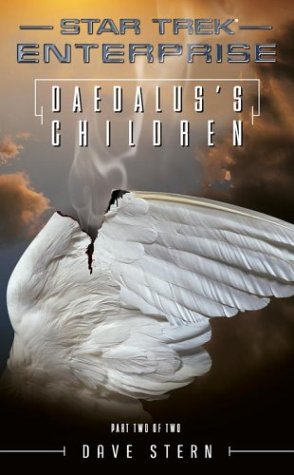
Daedalus's Children
15th October 2010
Daedalus's Children is a very similar book to its predecessor. It continues the story of Enterprise's crew trapped in a parallel universe where they are allergic to the food, in the middle of a civil war that they feel partially responsible for.
Unlike the first book, this one doesn't just focus on Trip, adding in Captain Archer as a second character to align the reader to. Neither character comes across particularly well though - Tucker feels less stereotypically southern but otherwise both are a sort of bland superhuman without any real emotion. The other main characters from the series are just given rather cursory bit parts, with the possible exception of Travis who at least gets a little bit of action before his limelight is stolen away again.
Stern's grasp of science continues to be lacking, which is rather unfortunate for what is at root a science fiction novel. His interpretation of parallel universes leaves a lot to be desired and one particular statement renders the most important plot point contradictory. It's almost as if he had half heard of several concepts and rammed them together and tried to make up the rest without any research.
I found it hard to get going with this. My motivation was particularly sapped by the direness of the previous novel, and so I wasn't too disappointed that this book lived up to those expectations. I wouldn't recommend you bother win either half of the duology - they add nothing to the Star Trek experience.

Up Till Now
William Shatner
4th October 2010
William Shatner's latest autobiography has a vey quirky feel to it, and focuses mainly on his acting career. Born in Canada, young Bill decided he wanted to act, against his father's wishes, and as soon as possible headed to Broadway under the promise that he would become a star.
The first third of the book covers the years before Star Trek, and Shatner describes in a very informal manner his formative years and his early acting life. He details a surprising number of stage and television performances. If you are looking for anecdotes about Shatner's time on Star Trek though you will be disappointed. These have already been covered in Shatner's previous works 'Memories' and 'Movie Memories'.
The middle section of the book I found hardest going. These were really the post-Trek years of the seventies. The final part picks up again. Shatner covers his tragic relationship with his third wife Nerine, and then demonstrates a real passion for his most recent role as Denny Crane in Boston Legal.
The one thing that irritated me was the feeling that the book was just an advertisement for Shatner's work, rather than a memoir about doing it. There is a running joke whereby Shatner tells the reader that things are available to buy from his website, but after being repeated in every chapter it gets a bit sickeningly shameless.
Overall it is an interesting read. The impression I get is mostly of honesty from Shatner and a sense that he is quite amazed by how well he has done out of his career. If you are a Shatner fan then it will probably be a must-read, but if you dislike him then you will probably find it a cheap sales pitch.

27th August 2010
I've had this book for several years, probably since it was published, but until now had not got around to reading it. I soon found out why.
The book focuses on Trip Tucker, as Enterprise and its crew are captured by an alien dictator who seemingly appears out of nowhere while they are investigating a spatial anomaly. Trip manages to evade capture only to find himself being drawn into the local war.
The style of writing is horrendous in its simplicity. I found it really hard to focus on the words and found I was only skim reading the entire novel, something I've never known to happen before. It's writing in a very casual manner, almost like a first draft where the author is just bashing out whatever comes to mind rather than caring about how it comes across.
I found the absence of the other main characters annoying. I like ensemble pieces from my star trek novels, and even Hoshi (who is misnamed throughout as Ensign Hoshi rather than Ensign Sato) who seems to be tagging along for the ride is soon conveniently written out. The romance sub-plot feels unnecessary and in there only to pad out the length, and the main plot itself is filled with thinly veiled coincidences. Its most redeeming feature is the end, which gives a nice 'ah-ha moment' and a lot of earlier things start to click into place. It almost makes up for some of the really bad science from earlier.
Overall I have to say I was disappointed. I'm not sure how I'm going to bring myself to read part two. This came over as a badly thought through and badly written implementation of what could have been a nice idea.

Articles of the Federation
Keith R A DeCandido
23rd June 2010
This is the first official political thriller from the Star Trek universe, and covers the events of the first year of Nan Bacco's tenure as Federation President, dealing with the Klingons and Romulans, first contacts, unruly councillors and the repercussions of the events of A Time for War, a Time for Peace.
I found it a difficult book to get into. There was no particular overarching plot, but rather a series of threads that weaved throughout the story. It is divided up into chunks with gaps of several weeks or months between, focussing on key periods, but also breaking up the narrative's flow.
On the other hand, there's a really good feature where the reader is taken out from the main characters into the company of a random Federation citizen watching a TV political discussion. It helps to fill in the gaps between the sections and to give an alternative set of viewpoints on the events of the plot. The segments do seem a little implausibly short for a TV show though, which I wonder whether is a symptom of decreasing attention spans in the 24th century, or poetic licence on behalf of the author.
The characters are mostly likeable and the main ones easy to get a grip on. Some of the more minor characters I found a little hard to follow though, especially as there were quite a lot of them that were dropping in and out. Overall, I enjoy this different style of Trek novel though, and this is a good way to round off the 'A Time To' series and set up the next set of novels.

A Time for War, A Time for Peace
13th May 2010
The final book in the 'A Time To' series has surpassed my expectations, much as the previous two. I felt the series started rather weakly, but towards the it's conclusion it has grown into something stronger.
While there is not really a central adventure to this novel, it's story is still captivating, as it focusses on not only the Enterprise crew as they prepare to separate, but also an inspection of their vessel, a hunt for a missing emperor, and a presidential election. In fact, I think this is better described as the first of the Star Trek political thrillers, as it's focus on the election and Worf's diplomacy take up a significant proportion of the narrative.
The main aim of this novel of course is to wrap up the series and to move the playing pieces into position for the film Nemesis, and it does this excellently. Previously this has seemed rather forced but DeCandido makes everything flow naturally and sets up even minor details in a believable manner.
I was pleased with the use of characters, though the focus away from the Enterprise meant some had less 'screen-time' than they perhaps deserved, particularly Crusher and Troi. Scotty's presence also seemed a little bit surplus to requirement, and I think a different character could have played his role equally well.
There was some rather unnecessary wrangling at the end that doesn't quite seem to fit in with how the later books progress, but as it was written first I don't suppose I can criticise on that basis.
I very much enjoyed this book and am looking forward to rounding the series off with its one-off sequel 'Articles of the Federation' which is the true first of the political novels.

A Time to Heal
5th March 2010
A Time to Heal is another good David Mack contribution to the star trek line, although I didn't find it as interesting as the previous novel in the series. This one seemed more predictable, with the culmination of the plot fairly obvious on the basis of knowing later events from seeing the film set later than it. This stripped Riker's incarceration of all its weight and made Doctor Crusher's ridiculously slow decision making tortuous.
The story itself has surprising and interesting parallels with the Iraq war - here the Federation is fighting rebels on a planet it has invaded (but not 'occupied'), where the local leader has gone into hiding, and it was the Federation that had supplied the planet with weapons in the first place. Troi's temptations to torture a captive general were really well written - although possibly a little implausible - as her actions in my book certainly add up to psychological torture and I'm very surprised that the Starfleet regulations permit her to get away with it.
Mack writes the minor characters aboard the Enterprise just as well as the regulars, particularly focusing on Vale and Peart in security and Kell Perim - the way he dealt with these characters was really surprising and refreshing. Mack has also made a good bash at getting some romance into his novel - in one case I felt it really worked but in the other I found it unsatisfying, going the way of most trek romance in seeming very out of character.
Overall, I've enjoyed Mack's two novels in this series, and am glad that the final episode is by another of the best trek authors of the current generation, as going back to some of the recent dross after this would be a let down.

A Time to Kill
28th February 2010
David Mack has produced what is easily the best book in the A Time To... series so far with this one. While the storyline is still a little slow paced, Mack manages to successfully distract the reader by providing a host of alternative viewpoints, adding local residents, federation politicians, and Worf to his character list. This makes the plot feel much more rounded and enables a lot more background detail to be filled in without sounding like exposition.
The book is still clearly working toward getting all the pieces in place ready for the film Nemesis, but unlike it's predecessors manages to do so (for Worf) in a way that actually feels natural rather than forced, and in character. In previous volumes a lot of the characters have seemed a little over emotional and self-centredly obsessive over small things regarding their future - but Mack doesn't write this way, giving more focus to the plot than to his 'main' cast. This is not really a drawback, as Trek is not particularly good at dealing with characters' emotions, and the plot is still rounded enough not to feel like solid action.
I actually now feel that deciding to eventually read this series has been worth it, if only because it meant I got the chance to read this one volume. Hopefully though Mack's second part and Keith R A DeCandido's finale will round the set off in style.

A Time to Hate
Robert Greenberger
7th February 2010
This is the lowest in Star Trek noveldom I've visited in a long time. Very little happens until the final few chapters, and even then it's nothing that could not have been guessed from the previous novel. In fact, several of the major plot points have so blatantly been coming that it's a surprise there wasn't some sort of twist at the end. Admittedly it is lining up characters for their places in Nemesis but it's getting a bit silly when the entire plot seems to be just for the sake of one tiny set up.
For this is the book in which Riker and Troi finally decide to get engaged... and the author's attempts to explore this relationship by separating the two characters are sadly quite dire. Star Trek just cannot do romance. It's a well established fact, and this book proves it with both Riker and Troi and the going nowhere feelings between Picard and Crusher. It's just tiresome because the reader already knows where it is going.
The plot itself is next to non-existent. We follow characters who do next to nothing, and even the interesting interplay from the first half between Riker and Seer is missed out of this - Riker is paired with his sulky father, leading to little by way of conversation or interesting exploration of the alien races (one of which hilariously comes from Dorset!). There are holes in the plot (no combadge should mean no universal translator) and continuity problems (someone leaves but then is still there) which just make the novels seem badly written and edited. I'm not surprised that this pair are the only two of the nine out of print - they just aren't up to scratch.
In fact, the end is where it gets interesting - we finally get the proposal, Crusher comes out of her stupor and makes a decision and some interesting hints are let lose about what is to come in the next few novels. At least it's David Mack next - that should make for a more entertaining read.

A Time to Love
31st January 2010
Book five in this series is an odd fish. I'm not quite sure how to characterize it. The set up seems to be a bit of a murder mystery story on an alien planet known for being the one place where two enemy species are able to live in peace.
The problem arises when the mystery fails to generate any clues. The story merely follows the characters travelling around doing very little while the situation worsens. A true mystery story would have been littered with hints as to what Kyle Riker was up to, but there are absolutely none. It just leaves me feeling uninspired as a reader.
The alien creations themselves are far from novel - two races who hate each other living on one planet is an idea that I feel Trek has done to death and it's a bit cheap not to come up with something more. The main characters seem awkward too and slightly unreal - only Crusher seems to have any real depth to her in this one, where to my mind this should be a Riker book. Maybe this will improve in book two though.
I'm torn between whether the use of Riker's father is a cute tying up of an old story or whether it's simply another coincidence too far, but I suppose I will have to wait until the second part before deciding once I actually know what the plot is.

A Time to Harvest
7th January 2010
The second half of this duology is a slight improvement on the first, containing more action and a plot that moves more quickly. It's also easier to follow as we are aligned with both parties this time from the outset and can understand what's going on from both points of view.
One thing I've noticed and am ambivalent about is that the authors like to drop in references to a lot of prior events in the Star Trek continuity, but then take up a couple of paragraphs explaining it in a little too much detail. In one or two places this is justified where it is essential to the plot (or, I suppose, filling in the reader on events of the first book - although why would you read the second part without reading the first, and both were published simultaneously so it's not like you could have forgotten...) but in others it seems a bit of overkill - why not just leave the references as an added bonus for those that will get them and let everyone else gloss over them? Instead I have a couple of paragraphs that I end up skipping over because I know what they are telling me.
The main thing that I dislike about this book though is the way it seems to be forced to build in the direction of the film Nemesis. Yes, I know that the entire point of this series is to fill the gap between Insurrection and Nemesis, but there are really irritating parts, particularly having to explain how Data lost his emotion chip, that I really wish these novels could have done without.
I'm hoping that the rest of this series will have slightly less introspective characters. Picard, La Forge, Crusher all seem to have been fairly grumpy in this one, which gets a bit over the top when it happens over and over again. Having said all the above, I still enjoyed reading this.

A Time to Sow
4th January 2010
The third 'A Time To...' book, while not a direct sequel in the truest sense to the second, is very definitely a follow on, in which Picard and the Enterprise are suffering from the damage inflicted on their reputation previously.
Unlike normal Trek novels, this series seems to have escape from the pattern where each book has to be focussed on an individual character, and it is more of an ensemble tome. Despite this, it gives an appearance of being biased slightly towards Geordi - but it's difficult to say whether this is real or just an appearance because he normally gets little more than a couple of scenes.
My only issue with this book is that it is a bit slow to get going. It starts well, but while interesting things are happening, the actual plot doesn't make an appearance until fairly near the end of this volume (the first half of a duology). This is followed by irritatingly little being revealed about the bad guy's identity before we reach the cliffhanger ending, or most of the detail of his motivation.
Overall I think this is in the upper half of the trek book ranking - it's certainly not bored me as I read it in an afternoon - though it has yet to make a mark as a really special adventure.

The Romulan War
11th December 2009
To me, this is not an Enterprise novel. Yes, it's set in the continuing Enterprise timeline, has scenes set on the Enterprise, and features the crew of the Enterprise - but not in starring roles. I would class this in the category of 'Star Trek Political Thriller' - like Articles of the Federation and A Singular Destiny - with a much wider focus than just one ship.
The plot continues from Kobayashi Maru, although is confusingly set before the Enterprise era elements of the Destiny trilogy, focusing on (surprise, surprise) the war with the Romulans - from a military, civilian, press and diplomatic viewpoint. There's also a fair amount from the Romulans' viewpoint as well which mixes things up. In a way I found the lack of focus a little distracting, but the second half of the book seemed to pick up a little.
This is Martin's first Star Trek novel without regular writing partner Andy Mangels, and personally I think it suffers from his absence. It's not easy to know exactly what each author contributes to their partnership, but I felt that this lacked something that their previous two novels in this series had. I also found the format - a trade paperback - really annoying, and personally don't think there was any good reason that this could not have been released as a standard paperback. The font size is very large, and the width of the page made it feel hard to read, having to skip my eyes back and forth wildly across the page rather than flowing down it. The large format also makes the book a pain to read while standing on a train, and it's very floppy.
So three stars - it continues the storyline well, although I'm not sure you could pick it up without having read the two previous novels. It's a very wide ranging book and time doesn't seem to flow in an easily followable manner - although each chapter starts with the date I have never found this to be a good way of showing the progress of time in a novel. There were a few annoying things were the reader could see things coming long before they were revealed to the characters, and there seemed to be a bit too much talking and too little action.
What really irritates me is that Pocket have announced no plans for the next book in the series... and this one certainly doesn't resolve any plotlines at the end!

25th November 2009
Synthesis is an interesting Star Trek novel in several ways. It's main topic is very Trek, focussing on the definition of life itself, and complicated ethical questions surrounding the answer. However the story gets too caught up in the mystery and the action and seems to lose focus on the part of the storyline that should have been explored.
The central ideas are nothing new: a race of sentient machines; a war whose cause nobody remembers; political disagreement and the emergence of sentience in a starship computer. When I first realised the last of these points my thought was along the lines of 'oh no not again,' despite my love of Swallow's previous trek novel in the Terok Nor trilogy. This idea has been done to death, most recently in the New Frontier series, which explores many of the same gags and conundrums. If this book had explored some more of the ethics, made this part of the plot deeper, then it would have been an interesting read in the true spirit of science fiction. Instead though it is glossed over in favour of the war storyline, and tiny glimpses into the personal lives of the other characters.
This seems to be much more of an ensemble piece than recent Titan novels, which focussed on developing particular characters and I felt that detracted from the experience and ended up with too much focus on the aliens.
Overall, yes I was a little disappointed. While it does work as a story it doesn't seem to move the characters on at all, just dropping them back into the toy box at the end of the day. I had expected something more based on Swallow's previous work, but would still not dismiss this as un-entertaining.

17th October 2009
Just like Beyer's previous novel in this series, Unworthy is absolutely fantastic. She has really got a grip on the characters the she is writing and their personalities and emotions and makes them far more real than any other Star Trek author.
This novel continues the story from where Full Circle left off, with Voyager and most of her crew returning as part of a fleet to the Delta Quadrant to explore and make friends. Tom is planning to resign and join his wife and daughter in hiding, while Seven has suffered a severe breakdown following the destruction of the Borg.
Beyer's new characters are as rounded and real as those we've known for years and fit in perfectly with the existing team - every one has good reason to be there, and the novel spends a good amount of time focussing on each of the characters rather than smothering us with one to the detriment of the others.
The plot is full of interesting and unexpected turns, and although one of the later twists was fairly obvious to me from early on it had its own unique sub-twist that hit me from out of the blue. The book feels like it has a good resolution even though there are a number of plot strands left hanging, and I'm really hoping that Beyer will continue to author this series.

A Time to Die
2nd October 2009
In the second book of this nine volume series, the first of the five stories is concluded. After breaking Picard out of jail, Wesley and the crew return undercover to the site of their disgrace to solve the myriad mysteries of the former battle site.
After the first novel was focussed on Picard, I had assumed that the cover image would indicate which of the NextGen crew each book would be about. By my reckoning that made this a Data book - but it isn't. This is definitely a Wesley book, reuniting him with his former crew and wrapping up his storyline which began in the previous novel. Many readers may be offended by this, as Wesley is traditionally not the best loved member of the crew, and Vornholt makes a tongue-in-cheek reference to this. I however am still a fan of Wesley, particularly as he was by far the closest character I could relate to while growing up watching the show (I too was a child genius who often saved the ship). This book shows Wesley as a young, insecure adult with little idea of what direction to take in life, and explores him pushing the boundaries of his abilities to stave off the destruction he has foreseen.
This novel is an interesting mix; part adventure, part mystery, part homecoming and part love story. Star Trek isn't known for its love stories, and with good reason. Te romance seems terribly sudden, forced, and a little amateur. One of the characters involved spends the first part of the novel lying to the other, before abducting her. It felt uncomfortably forced, and I am left feeling that it was done merely to leave a door to putting the toys back in the box at the end.
I was also disappointed in one particular passage towards the end, where the narration continues as normal for several pages before revealing that what it describes is just a character's imagination running away, and then replaying the scenes properly. Overall it was an okay book, although the solution was quite obvious from early on.

A Time to be Born
28th September 2009
I've read this book once before, but never continued onto the rest of the series. Now I have them all lined up ready I thought I would give them another chance, especially given how much they are referenced in the later continuation novels.
The first instalment sees the Enterprise assigned to a starship graveyard filled with unidentified anomalies, alien scavengers, and ships destroyed in the Dominion War. When things go catalytically wrong the crew head back to earth for court martial.
The point of this series is to bridge the gap leading up to the film Nemesis, and Vornholt sets several of the unexplained plot points in motion, particularly for Crusher, Data, and Wesley, who for me at least makes a welcome return. He also makes good use of a number of guest characters from the TV series.
The plot is fairly straight forward, although there are some parts where events are a little tricky to follow, particularly when set around the spatial anomalies. The second half turns a little towards the legal drama genre, which is quite irritating as the characters we're aligned with are kept in the dark.
The novel has a disappointing lack of conclusions, which I suppose is justifiable as half of a duology, but it would have been nice to have some points settled rather than everything hanging over. Overall a pretty standard trek novel.

The Soul Key
Olivia Woods
29th August 2009
The latest novel in the continuation series to DS9 follows on immediately from where the previous one left off... which is it's first mistake. It's been two years since the previous novel was released, and this one makes no effort to remind the reader of what had been happening, instead diving straight into a very complicated and confusing plotline.
I must confess that I wasn't holding out much hope for this one as I found the previous novel, Fearful Symmetry, also by Woods, to be below par as well. This one does have its moments - there are a few scenes towards the end that stood out - but there are others (for example space battles which last half a page) which are deeply unsatisfying.
The books is rather arbitrarily split into six parts, but even within those the narrative jumps around between times and places - and when you have three characters who are almost the same person it can get quite confusing. The storyline seems to rely too much on jumping backwards and revealing things which happened earlier that we didn't see at the time - and it feels really forced, as if they are just there to switch the course that the series was set on in the previous novel.
I'm disappointed, because I thought the first few DS9 relaunch books were really good, and now they are just letting the series down. My advice is that if you are a fan then go ahead and read it, but re-read at least Fearful Symmetry (if not more of the previous novels) first to get your head back around the storyline!

Losing the Peace
William Leisner
14th August 2009
The latest novel in the Next Generation continuation series is a lot calmer than the preceding destiny trilogy and Borg based novels beforehand. It's a welcome change of pace to a more diplomatic and political theme rather than war, war and more war.
Captain Picard and his crew's new mission is to assist in the rebuilding efforts as a roving troubleshooter, while Dr Crusher heads up her own team visiting a refugee camp on a water world.
Although it is the second in the political line in a row it still feels more like a traditional next gen novel, though fans of action and giant space battles will be disappointed as we've definitely moved beyond that for a while. The new crew seems to come together in this one for the first time, although it's not entirely clear which of the new characters are going to be main characters and which just supporting.
All in all I enjoyed it as a quick read but it has nothing of the impact of the destiny series. I don't even know when we'll be returning to the next gen or where they are planning to go next.

26th July 2009
I don't really know what to say about this one. I don't even really know why I picked it up and read it in the first place - I usually ignore original series based novels, and have learned to ignore book-only spin-off series after disliking the Challenger, Stargazer and Gorkon series.
This one was a bit different. The characters are easy to pick up, but the question is really how long they will stay with me and whether I will still know them if I try to read book two. In contrast to the previous spin-off series this one is written by multiple authors, so perhaps it will be more open?
The cast are a mix of a starfleet crew (represented by the station's gruff commander), the JAG office, diplomats, spies and civilians, with the Enterprise crew from the second pilot guesting. The civilian population is probably the most interesting, particularly a journalist and a collection of criminal gangs, who it's hard to believe are able to operate on a starfleet base.
Overall it's a good start to the series, killing a good number of characters off before you get to know them and focussing on a good core. The plot itself though seems a bit hard to follow - there's some secret reason that the base has been built and it's a bit of a let down not really understanding it at the end. I'm not sure whether any further books in this series will make their way onto my reading list.

22nd June 2009
Though a quick read, the latest novel in the New Frontier series has brought it back from the brink. A definite improvement on recent falls.
Several factions are out to kidnap the son of Robin Lefler and the late Si Cwan, some with more obvious intentions than others. They will stoop as low as controlling the minds of crew members to achieve their goals, but the ghost of Si Cwan has similar powers.
My main complaint about recent New Frontier novels is that the crew have become too spread out, and that there are too many main characters to focus on, however this time, David has pulled the focus back to the Excalibur, and while the other characters still appear, it's only in a supporting role.
There's an interesting juxtaposition, whereby the new aliens wanting to take control of bodies is bad, while Si Cwan's ghost taking control of Kalinda's body is somehow right, though none of the cast seem to realise this. The beginning also feels disconnected from the rest of the plot, as the original gang of kidnappers, while still suspected for a short while, are soon forgotten about.
Overall, I'd say it's an improvement, and has left the story with a few loose ends left to tie up. It still needs to lift a little further to equal the earlier days though.

28th May 2009
What a disappointing book to read, especially after the brilliance that is the film upon which it is based. Sadly Foster's novelization isn't up to the task, and presents us with little more than a prose version of the script.
I would have prefered to visit more of the characters' heads and seen their thought patterns, but instead, like the film, we stick with Kirk, seeing things from his narrow perspective and getting very little extra information about what's going on inside.
The only redeeming feature to this were the scenes that were deleted from the film... an excellent scene where Kirk as a child is cleaning his step-father's car, and a useful one where Spock is born, which would have been an excellent place to introduce the traditional Vulcan finger rubbing, which could then replace the most out of place scene later on.
Foster completely ruins all the jokes. It's almost as if he's gone through, found them all, and altered them just a tiny bit so they don't work. The most obvious example is when Kirk and McCoy first meet, and McCoy states that all that he has is his skeleton... instead of the correct 'bones'.
Overall, not good, but hopefully everyone who reads it will have already seen the film, which is fantastic, and not be put off by this poor showing.

Full Circle
30th April 2009
A really good continuation novel, the more than does justice to most of the crew of Voyager (Kes and Neelix do not appear). This novel covers much more than the description above, filling the gap from the end of Spirit Walk right up to the Destiny trilogy and beyond, talking account of everything that's happened in between.
Beyer has proved herself to be a fantastic character author, with all the main characters having an arc of their own with some pretty strong emotions flowing.
This actually seems very much like two novels in one, but having now finished I can see that it definitely needed to be one, as the second half probably would offend people if it was published stand-alone, being the more emotionally centred part.
The first half focussed on rounding off the plot threads left hanging from the end of Spirit Walk, and the second half those from Destiny, and setting up the next novel in the series. the next novel is also by Beyer, and I'm looking forward to it already.

Over A Torrent Sea
10th April 2009
Back to normal for the Titan series. Out of touch with starfleet exploring a brand new world with a unique twist. An individual member of the crew finds her calling and is tempted to stay behind permenantly. I've heard this a little before in the Titan series.
Like Bennett's previous Titan novel, this one seemed slow to get started, especially waiting for some of the content revealled in the blurb on the back cover to come along in the plot.
The elements that Bennett was forced to include in the novel from the continuing arc were a bit awkward, and the story he had introduced to get these out of the way seemed very forced and didn't particularly fit.
Overall, it was an okay read, but nothing has yet happened to hook me to the Titan series. I've got a fair while until the next one though. Looking forward to the next TNG book.

A Singular Destiny
24th March 2009
An interesting, and unusual take on the Trek franchise, but not as gripping as the trilogy whose effects this begins to tidy up. It's a good choice of idea to follow it up though as it deals with the future of the galaxy from multiple points of view, and sets the stage for the continuation novels of the next few years.
The main character, if there is one, is Sonek Pran, a rather dubious mix of Vulcan, Human, Betazoid and Bajoran (wouldn't have thought there were Bajorans around long enough ago). By day, he's a history lecturer on Mars, but by night an advisor and para-diplomat for the Federation President who runs around the galaxy sorting out problems. A possible opening for future novels I feel, although the character developed quite a bit in this one.
Also of note is the continued use of the USS Aventine, under Captain Dax, and introducing some more of her crew. Another opening one expects for a new line of novels!
All round, an important read, but not until after the Destiny trilogy, and definitely before any of the future continuations (and the next Titan book is on order from Amazon already!).

11th March 2009
A fantastic end to a fantastic trilogy. I had my misgivings at the start for a series that focused on the whole of the star trek universe in the post-TNG era, but it was in good hands with Mack, and this final episode especially was hard to put down.
Mack cleverly reintroduces a plot element that was hanging over from the first book but had almost been forgotten having not been mentioned in the second. This draws the three parts of the trilogy and the multiple arcs within it together to lead to a satisfyingly rounded climax.
The solution gradually became clear throughout, but at no point was there a feeling of knowing exactly where things were going, and although you know the good guys have to win in the end, Mack at least makes it entertaining to find out how they get there.
My one criticism is the low use of the Voyager characters once again - this time they are only mentioned in passing: other than Seven they don't even get any 'screen-time' in this novel.
Finally, it has a good ending, not too drawn out, but still satisfyingly tying up each of the characters' arcs, but still in a way that leaves the reader wanting more... and there's plenty more to come according to the ads on the inside back cover.

Mere Mortals
3rd March 2009
The second novel served as a good continuation of the story - although it still had a little of the second novel in a trilogy feel to it.
The action has focused more on two of the four crews that featured in the first novel, and on one character in particular, and starts to join together the different plotlines into one.
I don't have a lot to say about this novel - it was good, kept up the pace and kept me attached. The mixture of flashback and present day scenes was well done, each in turn revealling just the right amount to keep the reader interested.
My only criticism of the series so far is its' fleeting use of the starship Voyager in both novels, which seems to be there just as a tip of the hat. There's plenty of oportunity for some emotional focus on those characters here but they only appear for a couple of scenes - hardly enough to warrent their inclusion - unless it's building up to something bigger int he finale.

Gods of Night
24th February 2009
An excellent start to this series, quite unexpectedly. I don't remember being too enamoured about David Mack's DS9 continuation novel, Warpath, and I wasn't looking forward to more novels focussing on the borg - to be honest, they've been done to death in Voyager.
But this was different. The Borg, while being the enemy, aren't the main focus of this volume - they are a threat but they are very much in the background, popping up every now and then. I suppose in part that is because Mack has deftly intertwined the tales of four separate starships and crews, and only one has been directly interacting with the borg.
One psuedo-criticism is the absence of any explanation of how Dax has got from DS9 (where we left her in the most recent DS9 novel) to captaining the Aventine - but I suppose a gap is reasonable given that the novel timeline for DS9 has moved fairly slowly since the series ended. Also, this leaves plenty of freedom for the DS9 authors to write what they want to while they catch up.
A major issue I had was with the time dilation effect, which I thought the author had got completely wrong. However, having looked it up on the internet, and done the calculations myself, it seems that while non-intuitive, it is correct. This is why I've given an apologetic extra half star to make it up to five.
In conclusion, some parts were a little predictable, but then I suppose that if everything that happened was unexpected, one would have cause to doubt the logic of the storyline. So it's a good start, and I hope it can only get better!

Sword of Damocles
Geoffrey Thorne
12th February 2009
Finally, a Titan novel I actually enjoyed! This one was very different from the previous three novels in the series - there's very little direct contact with aliens, and it's closer to the new characters, focusing on one or two of them in particular.
Thorne has pulled the series in a new direction, looking more at the 'humanity' of the characters, and it seems more in the style of Deep Space 9... and I don't mean just because it focuses on a Bajoran, but because it deals with issues of faith, destiny and sacrifice.
It's more emotionally charged, not least because everyone thinks everyone else is dead. And this leads to characters making decisions that they wouldn't normally, and yet they feel completely rational.
The focus on the new characters is good this time round, with the established and human characters mostly being relegated to sub-plot. I'm enjoying the interactions between the younger members of the crew, particularly the Cardassian cadet.
A good book, but not all of my favourite toys make it back to the box. The description above, taken from a certain shopping website, is rather inaccurate.

Orion's Hounds
29th January 2009
An improvement on the previous book in the series, I feel, although still fairly average on the scale of Star Trek novels. Many of the aliens encountered are ones that have been met before on the TV series - in fact that's a major part of the plot - and this helps me to picture the events.
Obviously, the Titan series is aiming to be more of a 'back to exploring the galaxy' themed set, but it feels like all the books I've read recently have been of the 'out of touch with starfleet in an area of space completely different to anything we know' style. This can get a little repetative.
Although this one seemed to start slowly, it fitted the traditional three act structure, with the sudden reversal in the second act. My only complaint would be that it took a while to get going, and it wasn't until we got into Act 2 that it started to grip me.
The ending was well thought out and not rushed, and felt real and satisfactory, unlike some trek novels which are wrapped up a little two quickly and neatly. I grew to like some of the new characters during this novel, who seemed better fleshed out and easier to relate to than in the previous two.
Overall, enjoyable, but still backing up my original decision not to read this series, which was scuppered when they became pre-requisits for the Destiny trilogy, which I plan to read shortly.

Missing in Action
23rd January 2009
Nothing special. I've been going off New Frontier over the past few books, and this one I didn't even buy until it was in paperback and it's taken probably a couple of years to get around to reading it. Part of that was because I was re-reading the series to remind myself what had happened, but still...
Even when I got this far, I wasn't keen. The previous book in the series, 'After the Fall', didn't impress me, and finding the entire New Frontier universe mangled with in the three year storyline gap preceding 'Fall' with no real explanation led to some confusion.
And another thing... the previous novel in the series ended on a cliff-hanger, with the Starship Excalibur being pulled through a vortex into another realm... so I suspected that this may be irritatingly similar to the previous book I read 'Titan: The Red King'.
In fact, it wasn't as bad as I had imagined, and was a fairly enjoyable romp, although I feel the central part of the New Frontier series - Captain Calhoun and the USS Excalibur = has been watered down too much by spreading the cast around three ships, a starbase and a planet.
Once again, Peter David's knack for failure to put the toys back in the box has presented itself, which is refreshing compared to many Star Trek stories where the tension is somewhat lost by the knowledge that everyone has to survive.
I was disappointed by the ending of this one though. Everything was wrapped up a little too quickly and cleanly at the end, almost as if the author had given up on the story and quickly put together a conclusion.

The Red King
Andy Mangels & Michael A Martin
15th January 2009
An interesting second book in the series by M+M. As well as a sequel to the first Titan book it serves as a sequel to their previous novel in the Lost Era series based on Sulu's Excelsior... which I vaguely remember reading about 5 years ago. Sadly, my memory isn't good enough to recall it that well (in fact, the Lost Era series didn't grip me that much at all... to the extent that I don't think I finished reading them). So, the opening chapters threw me a little until I, along with the crew of the Titan who didn't serve with Sulu, was brought up to date.
Once the little recap was past, an enjoyable romp ensued, however I'm still having trouble getting to grips with the new characters... for the books based on the series they are easy to imagine, and some others, like New Frontier and the DS9 relaunch seem to have easily introduced new characters, but in both the Stargazer and Titan novels I'm not picking this up. Partly I think this is because the authors are making an effort to be more serious in their SF - going for more extreme forms of life rather than stock humans in prosthetics. And I've never really been able to get my head around those.
Did the novel advance the ongoing story arc? Well, that depends on what's going to happen in the next novel... I don't know if this arc will continue, but there were deaths, and the relationships between some of the characters changed... most of those that look important in a negative way, I must admit. So I suppose I really will have to wait and see if the author that picks up the series in the next novel will chose to pick up on those, or whether they will fly off in a new and different direction.

Kobayashi Maru
Michael A Martin & Andy Mangels
10th January 2009
Another gripping tale of the post-tv series Enterprise crew as they move towards the historical war referred to in TOS. It is a follow-up to The Good That Men Do, which is required reading to understand this tale.
Although looking back on it there doesn't seem to have been a great amount happening, this is probably only because it's a middle book in a series, and it's taking the crew from one place to another, with no particular plot to resolve at the end.
It is a gripping read, as are all of M&M's Trek novels, and there's always a lot happening. As can be told from the title, the story of the original Kobayashi Maru no-win-scenario is a major feature, along with some surprising deaths and an unprecedented gay Klingon.

Day of the Vipers
16th June 2008
A fascinating start to this trilogy exploring the backstory of DS9, documenting the time from when a young Dalin Dukat participates in formal first contact between Cardassia and Bajor to the beginning of the official occupation. While the DS9 seuels seem to have lost their way with overly confusing and forgettable storylines and the absurd delays in publication, James Swallow has done an excellent job of starting off this new series - and with a fixed length of three novels it's unlikely to wander too far.
The cast of characters is impressive, mixing together a range of well known character, guest characters from the TV series and an assortment of new and engagingBajorans and Cardassians. Unlike the DS9 continuations this novel assumes no prior knowledge from past novels and to my mind explains the 'Oralian Way' - the Cardassian religion - much better than I remember from any other novels.
The last novel I read by Swallow was a Doctor Who new series adventure, 'Peacemaker', with the Tenth Doctor and Martha Jones, but I didn' realise this until I read the 'About The Author' section - while the Doctor Who novel stuck to simple language and straight forward plotlines, this work was detailed and layered with a number of interweacing storyline, and despite being slightly longer than the recent Trek novels, was engaging right to the end.
My only disappointment is that the remaining two books in the trilogy won't be written by the same author. All-in-all, the best Star Trek novel I've read in a long time.
7 Best Star Trek Novels, Ranked
With so many stories about the beloved series, Star Trek, it can be hard to pick the best novels, but here are some of the top contenders.
There have been Star Trek novels almost as long as there's been a show. The earliest books to take place in the Star Trek universe were released as early as 1967, and the trend continues right up until the present day. Given the popularity of the IP, there might be a new novel every day, and that's not including all the fan fiction.
Related: Star Trek: Saddest Deaths In The Franchise, Ranked
Given the breadth of choices when it comes to Star Trek novels, it's tough to choose only a few that could be the best . The following choices aren't novelizations of movies or shows, but unique stories that don't appear in other mediums. They do include settings or characters that have already been featured on the big and small screen even though most of them are considered non-canon.
7 Imzadi, By Peter David (1992)
The Next Generation fans will recognize Imzadi as a Betazoid term of endearment. Riker's mission to Betazed early in his career is alluded to on the show several times, but it was never really explored in detail like it is in this book. It's primarily an adventure, that involves time travel and the nature of the human soul.
The term "Imzadi" doesn't mean something casual like "honey" or even a more poetic term like "beloved." It's a deeply spiritual expression about the first being to touch your soul. Not to give away any spoilers , but the lesson here isn't one of universal diplomacy or stunning modern technology, just the ancient knowledge that love conquers all.
6 A Stitch In Time, By Andrew Robinson (2000)
Elim Garak is a familiar name to those who know their Star Trek lore, in particular Deep Space Nine . The character has an interesting history; he was intended as a one-off , but viewers and scriptwriters like the character so much that they wrote him in as a recurring plot device instead. In a further twist, the actor that portrayed the character also wrote this book, and since this novel evolved from a series of diary entries that were part of the show, that makes a lot of sense.
Related: Star Trek’s Planet Classes, Explained
Robinson wrote these diary entries, which go back to Garak's childhood and early training, to explore the character for his purposes as an actor. Another Star Trek and sci-fi writer, David R. George III, heard Robinson read part of the diary at a convention and thought it would make a good novel. The rest might not be canon, but it is history.
5 Rihannsu: The Bloodwing Voyages, By Diane Duane & Peter Morwood (2006)
This is a series of four shorter novels, which can be read separately, but this is an anthology that collects all four under one title. One edition was called Star Trek: Rihannsu but this was a version limited to certain book club members, so those looking for the title in modern bookstores are advised to look under Rihannsu: The Bloodwing Voyages .
The word "Rhannsu" is a word that means "Romulan" and the books follow a small group of characters while giving exposition on the lore in general. For viewers that are interested in Romulan lore, this novel is highly recommended reading, and for those who aren't, these books might change your mind about one of Star Trek's most notorious races.
4 Prime Directive, By Judith & Garfield Reeves-Stevens (1990)
Prime Directive is a novel of what could have been a typical The Original Series episode and features the classic team of Kirk, Spock, and McCoy. Instead of being flippant about the most important rule in Starfleet that nobody follows, this one takes it seriously and gives the reader some real-world consequences as to what happens when it's overlooked.
Related: Best Star Trek Admirals, Ranked
The plot revolves around an incident in which the crew decides to violate the Prime Directive, and the consequences are disastrous on a planetary scale. Spock helps the crew redeem themselves, however, and uncovers a much bigger plot and enemy in the process. The novel has some prescient ideas, like the beings that call themselves the One, who sound suspiciously like the Borg.
3 The Entropy Effect, By Vonda N. McIntyre (1981)
It's not just one of the oldest and best stories that focus on everyone's favorite Vulcan, it's the first original story in what would become an extensive library of Star Trek novels from Pocket Books publishing. Writer Vonda N. McIntyre was also a biologist, making The Entropy Effect higher on the reading list for those with an appreciation for the science fiction side of Star Trek.
The story revolves around two parallel stories that intertwine; one about Spock and his study of a naked singularity and the other about the transport of a dangerous criminal. The singularity, which is similar to a phenomenon like a black hole, was also the subject of study for the prisoner, Dr. Georges Mordreaux. The doctor, convicted of murder and other grisly crimes, is also a source of fascination for Spock, and as the story unfolds he has to confront and defeat a person he admires.
2 Dead Endless, By Dave Galanter (2019)
Dead Endless is one of the more recent additions to the Star Trek reading library, and it's based on one of the more recently released shows, Discovery . The story revolves around characters Hugh Culber and Paul Stamets, the latter of which uses his mind and consciousness to navigate the secret spore drive.
Related: Star Trek: Best Lieutenant Commanders, Ranked
The story explores the idea of the existence of human consciousness within the mycelial network, and it's not official canon it could fit into the Discovery timeline. For readers who are looking for more Discovery novels, Gallery Books has several others that take place in the same setting.
1 The Eugenics Wars: The Rise And Fall Of Khan Noonien Singh (2001)
This isn't a novelization of The Wrath of Khan movie but one novel in a larger series about the Eugenics Wars overall, and this volume focuses on the rise of Star Trek's most infamous villain. Considering that the movie came out in 1982, and the popularity of the character , it's amazing that it took so long to release a novelization of the same era.
The novel traces the very beginning of the eugenics projects that would eventually give rise to genetically augmented humans and begins on Earth in 1974. The Watchers have a team on earth who have been keeping an eye on the Chrysalis Project; Gary Seven, his human secretary Roberta Lincoln, and the shapeshifter Isis. These characters also appeared on the TOS episode "Assignment Earth" which was intended to be a backdoor pilot for a show featuring Gary Seven.
More: Star Trek: Times Seven Of Nine Saved The Day

- April 22, 2024 | Preview ‘Star Trek: Discovery’ Episode 505 With New Images, Trailer And Clip From “Mirrors”
- April 22, 2024 | Podcast: Armin Shimerman, Kitty Swink, Jonathan Frakes & Juan Carlos Coto—Trek Against Pancreatic Cancer
- April 21, 2024 | Interview: Sonequa Martin-Green On Facing Her Past On ‘Star Trek: Discovery’ And Her Hopes For The Future
- April 19, 2024 | Exclusive First Look At Artwork From ‘Star Trek: Celebrations’ – IDW’s One Shot Comic For Pride Month
- April 19, 2024 | Podcast: All Access Faces The Strange On ‘Star Trek: Discovery’
Book Review: ‘Star Trek – A Celebration’ Delivers On Its Promise And Then Some
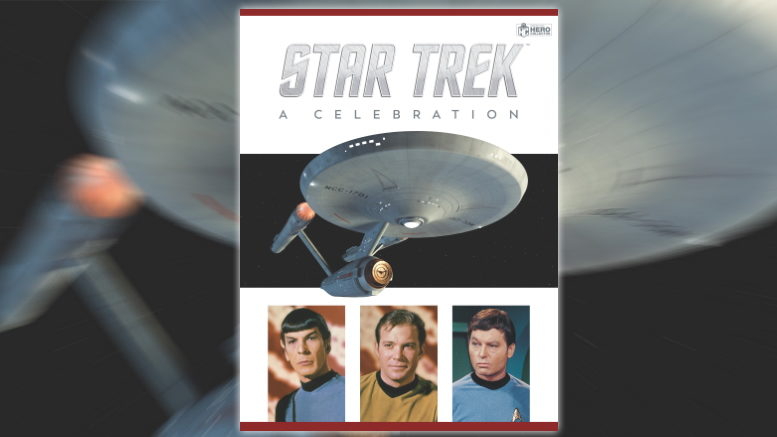
| September 28, 2021 | By: Laurie Ulster 7 comments so far
Star Trek – A Celebration Written by Ben Robinson and Ian Spelling Hardcover | $23.08 Published by Eaglemoss/Hero Collector | 256 Pages
Writing a book about Star Trek: The Original Series presents a challenge: How do you tell the story of a revered, classic show that can serve both die-hard fans who’ve heard the same stories told over and over for years along with the newcomers who came into Star Trek from either the Berman-era shows or the Kurtzman ones? Authors Ben Robinson and Ian Spelling have found a way, combining familiar stories with new interviews and rarely heard details without ever condescending to either group, in a beautiful new coffee table book called Star Trek: A Celebration , the second in a series that started with the Voyager book last year.
Finding something new for a 55-year old legend
This picture-filled, detail-rich book tells the story of The Original Series through a mix of brand-new interviews conducted by the authors (who are both pros and have been in the Star Trek world for decades), mega-research from first-person sources, and older interviews from those who aren’t around anymore. They seamlessly combine them to unearth old gems and tell new stories, always adding in some perspective that a 55-year legacy (and research into it) can bring. The big question around books like this is always “Is there anything new here?” and the answer is a definitive yes, but I think the bigger achievement is finding a way to weave all of the elements together to tell the story of the show that launched an empire.
With regards to the creator of Star Trek , the book covers the genius and perseverance of Gene Roddenberry, but also his flaws and petty behavior; it’s an honest look at a very complicated person. The authors also do the best analysis of the widely mythologized Kirk-Uhura kiss in “Plato’s Stepchildren” I’ve seen. And yes, there are some great rarities in here among the new interviews that include actors like Andrea Dromm (Yeoman Smith in “Where No Man Has Gone Before”), Carey Foster (who was cut from “The Cage” but appeared on TOS multiple times), Maggie Thrett (Ruth, “Mudd’s Women”), and April Tatro (Isis, “Assignment: Earth”).

The authors clearly spent some serious time with the legendary casting director Joe D’Agosta, who says Gene Roddenberry didn’t hire him on the show because of his knack for casting, necessarily:
What sold me to Gene was that the former casting director wasn’t disciplined about getting actors to get military haircuts for a show about Marines,” D’Agosta recalls, laughing. “Well, I didn’t let an actor go on set unless they got a military haircut. So, Gene liked me, not because I was a great casting director, but because I could deliver actors with military haircuts.
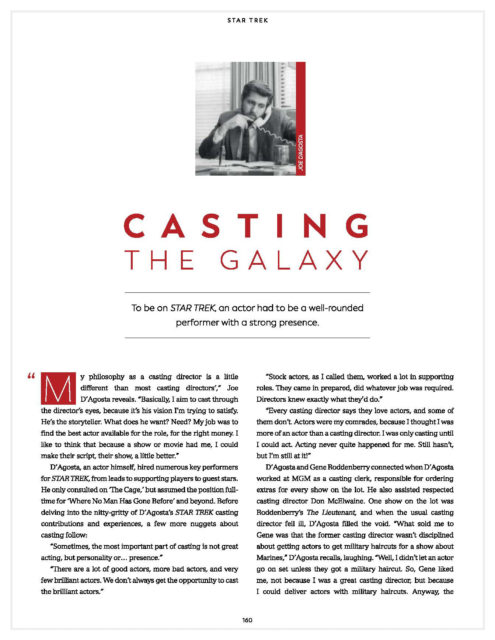
The artistry behind the scenes
Surprisingly, my favorite sections weren’t about writing or acting—my usual beat—but about production design, costumes, makeup, props, and special effects. The sheer creativity required to create strange new worlds with limited budgets and resources is inspiring, and while I’ve read about it all many times before—like many fans, I read The Making of Star Trek about 100 times as a kid—these sections really brought the process and the innovation to life. Like many, I weary of the references to “cardboard sets” and bad effects in The Original Series ; what they achieved was astonishing, and this book gives the artistry and production expertise its due.
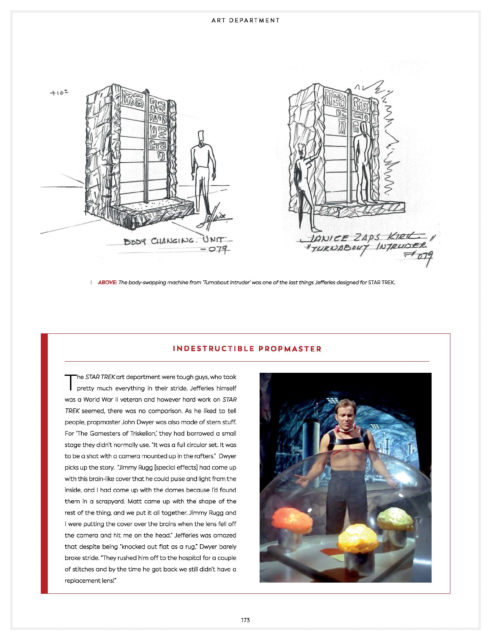
The sketches from Matt Jefferies are particularly remarkable.

Cover-to-cover or random pages?
If you read the book cover-to-cover, you will find some minor repetition, but the book is really designed for someone to pick it up, choose a section, then flip around and find another, so with that as context, it makes sense.
I do have the same complaint I had about the Voyager book that came before it: I wish the typeface was a little larger and a little darker. I have to use a book light to read every tasty bit of text, which is mildly cumbersome. (I checked with younger family members, by the way, and they agree.)
But that’s a minor point, and I can’t complain about the overall look of it: The photos are gorgeous, the stories are well told, and the book will entertain you for hours and give you a fresh look at the show we’ve all watched and loved for so long. It is, indeed, a celebration.
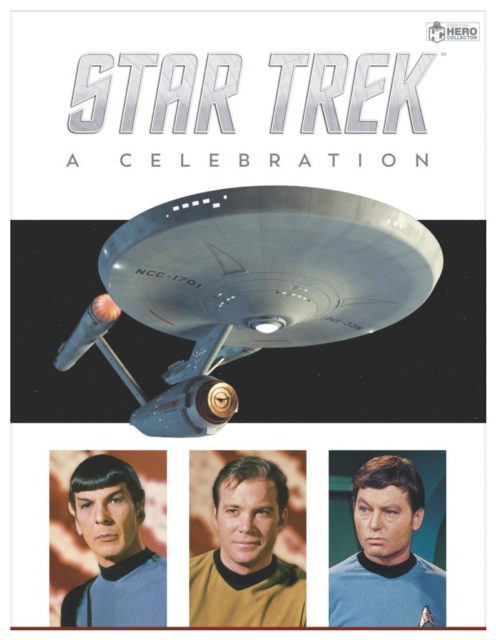
The 256-page Star Trek – A Celebration arrived in hardcover on September 21, and is currently priced at $23.08 ($44.95 in Canada). You can order it from Amazon.com . or directly from the Eaglemoss Shop .
Keep up with all the Star Trek books and merchandise news and reviews at TrekMovie.com .
DISCLAIMER: We may link to products to buy on Amazon in our articles; these are customized affiliate links that support TrekMovie by earning a small commission when you purchase through them.
Related Articles
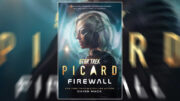
Books , Review , Star Trek: Picard , VOY
Review: Action-Packed ‘Star Trek: Picard: Firewall’ Reveals Seven’s Compelling Quest For Identity
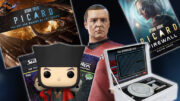
Books , Collectibles , Merchandise , Toys
Star Trek Merch: TNG Digital Funkos, Corgi Diecast Relaunch, ST09 Scotty Figure, And New ‘Picard’ Books
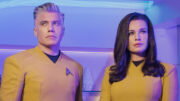
Books , Strange New Worlds
‘Star Trek: Strange New Worlds’ Novel To Explore Pike And Una’s Backstory
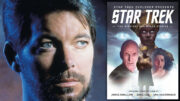
Books , TNG
Exclusive Short Fiction Excerpt From ‘Star Trek Explorer Presents: “The Mission” And Other Stories’
Wow, talk about a comprehensive overview! It looks like a “must have” for any fan of the show!
I agree completely, Harry. As a ‘nuts and bolts’ guy when it comes to films and TV, I love books like these.
Yeah, I get tired of that zombie “cardboard sets” canard myself. Definitely plywood; certainly, but not cardboard. You’d think people would understand that just from watching the show, given how many times actors had to bodily throw themselves against those sets every time the ship was attacked.
For my money, the swing sets of “Babylon 5” always looked more flimsy than those on TOS ever did. (No hate, please; I think the show is awesome anyway.)
The Making Of Star Trek 2.0
Great review Laurie!
I wasn’t sure about purchasing this one as I have so many books about the classic show and thought what else is their to tell? however the art looks great and the Matt Jefferies sketches are brilliant so I guess I’m sold.
Laurie, thanks for your excellent review. I will be purchasing this item guaranteed. I grew up watching TOS here in the UK in the early 1970’s and this book is in the must have category. I smiled at your “The Making of Star Trek” reference, which I also must have read 100 times as a boy. That book has particular affection for me as my late dad surprised me with a copy when I was 10 years old and I was so completely enthralled, I couldn’t put it down for what seemed like weeks. Great and happy memories!
The Voyager book was the closest thing we’ve had to the DS9 Companion 20 years ago, a really loving and often insightful look at the making of a Trek series. I can’t imagine this new book doesn’t uphold that standard.
- Search Please fill out this field.
- Newsletters
- Sweepstakes
The best Star Trek series, ranked
Ready to settle in and watch some Star Trek episodes? Since there are so many, we’ve ranked all of the different series to help you get started on your quest.
Star Trek is one of the greatest franchises ever created. If you're new to the world of transporters and holodecks, you have so much wonderful content to catch up on — of course, some would say too much content.
Since there are over 850 episodes and counting (all of which you can stream on Paramount+ ), watching all of Star Trek can be more difficult than fighting a Gorn in the desert. To make things easier for you to get started, we've ranked every series (besides the short-form series Short Treks ) of this long-running franchise. Some of these choices were a bit daunting to play favorites with, but, like Jim Kirk, there's no belief in the no-win scenario.
Without further ado, here's our list of every Star Trek series ranked from worst to best.
11. Star Trek: Picard (2020–2023)
Star Trek: Picard was meant to be like comfort food to fans of Star Trek: The Next Generation . And whether fans were turned off by the changes in franchise direction with shows like Discovery or just wanted to see Patrick Stewart back in action, Paramount clearly thought this show would be almost universally beloved.
That didn't happen . The warm and fuzzy feeling of seeing a few familiar faces in the first season evaporated because of an often-confusing plot about androids. The second season continued this confusion with a time-travel story that often bordered on incoherence. While many Star Trek shows take a few seasons to hit their stride, it was shocking that so much of this relatively short series was seemingly created with "make it so-so" in mind.
10. Star Trek: The Animated Series (1973–1974)
If you're in the right mood (or you've been sipping on some Saurian brandy), Star Trek: The Animated Series has some wacky entertainment value. Any given episode had the writers throwing in stories like a giant version of a beloved character. And the animators threw some fun curveballs, including making the embodiment of evil into a shirtless hottie that would make even shirtless Kirk jealous.
However, this animated show was often caught between two very different worlds. It wasn't fully a return to the (relatively) grounded exploration of space, science, and morality of The Original Series . And it didn't fully lean into the chaotic possibilities of a cartoon world (something Lower Decks would later handle much better). So, while more and more elements of The Animated Series have become canonical thanks to shows like Discovery , and it's fun to hear the voice acting of the Original Series cast, this cartoon is one that all but the most hardcore fans can skip.
9. Star Trek: Enterprise (2001–2005)
Despite what you might have heard, Star Trek: Enterprise is not a bad show. It just didn't start as a very good show. The series was tragically canceled after the fourth season, which was arguably when it had just begun to hit its stride (thanks in part to longer story arcs and a really fun glimpse into Trek 's popular Mirror Universe).
At the end of the day, Enterprise is a show best enjoyed by Star Trek fans that like to pore over the Memory Alpha wiki and familiarize themselves with Trek minutiae. As a prequel show, it laid the groundwork for everything from Starfleet policy to alien interactions that other shows explore in more detail. If you don't have a shot at winning any Star Trek trivia contests at your local bar, it's still worth watching how captivating Scott Bakula can be in the captain's seat.
8. Star Trek: Prodigy (2021–present)
Star Trek: Prodigy was very difficult to rank. Unlike the other two Trek cartoons, this series was explicitly designed for younger audiences. Paramount clearly wants to use this show as a gateway for these younger fans to explore the wider world of Star Trek , but there are enough elements (most notably the return of Kate Mulgrew , reprising her role as Captain Janeway via a holographic form) to keep veteran franchise fans invested.
Ultimately, your enjoyment of this series will be largely dependent on how much you enjoy animated/YA entertainment. If nothing else, you should check out the first two episodes of this show to see just how beautiful the CGI animation can get.
7. Star Trek: Discovery (2017–present)
If Enterprise is the Star Trek show cut off too soon, Discovery may very well be the first Star Trek show to outlive its welcome, though it will end after its fifth season . There are many things the show gets right, from nifty effects to quirky characters to amazing casting (seriously, Sonequa Martin-Green is electrifying whenever she is on screen).
The show veers from a disjointed-but-interesting first season to a mesmerizing second season, which gets a real shot in the arm by introducing Captain Pike (played by the inimitably charming Anson Mount ) and Spock (played as a perfect homage to Leonard Nimoy by Ethan Peck). Later seasons, however, prove that the series can't get away from galactic-level threats, and character drama begins overriding plot development enough that we want to slingshot around the sun and return this series to its earlier roots.
6. Star Trek: Voyager (1995–2001)
Like many Trek series, Star Trek: Voyager had a rocky beginning, and it was often overshadowed by the excellent Deep Space Nine . Ironically, Voyager dramatically improved with what could be a cynical casting stunt: adding the alluring Jeri Ryan (constantly wearing a catsuit, no less).
Though it really looked like a desperate ratings stunt, Ryan turned the reformed Borg Seven of Nine into the most interesting character on the show. And, despite their alleged clashes behind the scenes, the actress helped to elevate every scene she shared with Kate Mulgrew. Between the new cast member, improved writing, and Mulgrew being nothing short of a damned icon, Voyager soon became appointment television, and it's definitely worth binge-watching for modern audiences.
5. Star Trek: Lower Decks (2020–present)
Lower Decks is an impressive show for many reasons, including the fact that its execution elevates its initial premise, which focuses on the lives of the lower-level staffers aboard the starship. Because showrunner Mike McMahan previously wrote for Rick and Morty and the animation takes its cues from the cartoon adventures of Rick Sanchez, many fans may have assumed Lower Decks would simply be " Star Trek meets Rick and Morty ."
Thankfully, that's not the case. Aside from animation similarities, the main element these two cartoons have in common is a breakneck, borderline chaotic pace. But as entertaining as it can be, Rick and Morty is an often nihilistic show with gags revolving around how nothing really matters. Lower Decks , however, is a lighthearted series that serves as the cure to modern Trek . If you've dismissed other contemporary series such as Discovery and Picard because they are grim, violent, and serious, Lower Decks is a wonderfully lighthearted alternative that is never afraid to poke fun at its own franchise.
4. Star Trek: Strange New Worlds (2022–present)
Star Trek: Strange New Worlds is a truly pleasant surprise to fans of the franchise. Set years before Captain Kirk sat in that famous chair, we see Capt. Christopher Pike (Anson Mount reprising the role) lead the U.S.S. Enterprise into bizarre adventures alongside some familiar characters (Ethan Peck returning as Spock, for example) and a few new ones.
Part of what helps this show shine is that it marks a return to episodic Trek in that every installment is a self-contained adventure as opposed to other newer series like Discovery and Picard , which build entire seasons around a single plot. The characters all ooze with the same swashbuckling charm of The Original Series characters, and we can't wait to see more of their adventures. We also can't wait to see more of Anson Mount's amazing hair (arguably the most awesome practical effect in the franchise).
3. Star Trek: The Next Generation (1987–1994)
Star Trek: The Next Generation has the dubious honor of being the first Trek show where veteran fans warn against new fans starting at the very beginning. Early episodes ranged from stupidly horny (planetary inhabitants in the episode "Justice" were barely wearing scraps of clothing) to ridiculously racist ("Code of Honor" may very well be the worst Star Trek episode ever made). Many of these problems stemmed from the fact that despite being called "The Next Generation," the show was trying to recreate The Original Series (right down to using some of the same writers and shamelessly reusing scripts from the scrapped Star Trek: Phase II series).
As fans like to joke, the show got better as Commander Riker's beard got longer. Season 2 was a major improvement, which was then usurped by season 3, which brought in new uniforms, new sets, and Michael Piller to head up the writing team. Just like that, TNG embraced its differences from its famous forerunner (Picard was cerebral whereas Kirk was impulsive, Data yearned for emotion whereas Spock detested it, and so on). At last, the gamble paid off, and the next generation of this franchise ushered in the next generation of Star Trek fans.
2. Star Trek: The Original Series (1966–1969)
What can we say about The Original Series that hasn't been said already? Gene Roddenberry successfully fused science fiction with American pioneer spirit to create his vision of this " Wagon Train to the stars." The episodes were both fun and thought-provoking in equal measure, and William Shatner as Kirk and Leonard Nimoy as Spock, among many others, turned in performances that seared themselves into our collective pop culture consciousness.
The Original Series offered social commentary about racism, imperialism, and (often to Spock's annoyance) the human condition. And the blend of big acting, ambitious sets, and poignant plots helped this show become something truly transcendent. The OG Star Trek shaped not only the future of the franchise but television itself, and it's not hard to see why it continues to win over new generations of fans year after year.
1. Star Trek: Deep Space Nine (1993–1999)
Placing Star Trek: Deep Space Nine in the top spot is perhaps a contentious decision. However, this series did more than measure up to the quality of The Next Generation (a lofty feat in and of itself). The show also made a number of storytelling and production choices that have helped DS9 seem more relevant in recent years than ever before, including tackling issues about race, religious fundamentalism, and war on a regular basis.
Perhaps the main way DS9 feels so pertinent is that the show broke the longstanding Trek rule of making only standalone episodes. As the powers that be focused more on creating their next show, Voyager , DS9 showrunner Ira Steven Behr was able to get away with creating long story arcs and frequent episode callbacks. The end result of this is that Deep Space Nine is the first of the pre-streaming era Trek shows that is perfect for binge-watching.
Related content :
- Star Trek: Discovery reveals season 5 first look and on-set Easter eggs
- Jack Quaid formed a 'Spoimler' bromance with Ethan Peck on Star Trek crossover event
- Star Trek Day pays tribute to Uhura actress Nichelle Nichols in moving in memoriam
Related Articles

Weird Star Trek Novels That Are Enjoyable To Read
I n February 1970, Bantam Books published the first original Star Trek novel. James Blish's Spock Must Die! received mixed reviews from critics, but it laid the foundation for many hundreds of further novels . Perhaps the golden era of Star Trek prose was under Pocket Books, who produced an ambitious continuation of TNG and DS9 long before Star Trek: Picard .
Some of the tie-in novels are good, some are bad, and some are just plain strange. From vanity projects to starship-sized plot holes, Star Trek's authors went where no one had gone before (and sometimes where they shouldn't have gone). Though they may be on the stranger side, here are a few books that fans of the franchise will doubtless enjoy.
The Enterprise War - John Jackson Miller
John Jackson Miller's 2019 novel answers a pertinent question: where was the Enterprise during Star Trek: Discovery 's Federation–Klingon War? Miller shows Pike's Enterprise caught in a different war between the Boundless and the Rengru, aliens who hope to use the starship to tip the scales in their favor.
RELATED: Most Charismatic Star Trek: The Next Generation Characters, Ranked
The Enterprise War has an exciting plot, but stumbles slightly when it comes to reconciling the Pike era with the rest of contemporary Trek. Spock's references to Michael Burnham seem out of place alongside obscure characters from Star Trek 's failed pilot, while the Enterprise 's saucer separation recalls TNG rather than TOS or Discovery . Miller's novel walks a fine line between anachronisms and tropes. The result is a weird blend of eras, but one that readers are sure to enjoy.
The Good That Men Do - Andy Mangels & Michael A. Martin
Few fans were impressed when Star Trek: Enterprise ended by killing off one of its crew. In terms of both scriptwriting and direction, the noble sacrifice of engineer Trip Tucker is an anticlimax. This shortcoming inspired authors Andy Mangels and Michael A. Martin to consider an alternative: what if Tucker's death was a hoax?
RELATED: Star Trek: The Relationship Between Vulcans & Romulans, Explained
The Good That Men Do (2007) claims that Tucker never died; instead, he left the Enterprise to work for Section 31 . This coverup allowed him to investigate a new threat posed by the Romulans. The book holds a strange place in Star Trek canon: it is as much an apology as it is a novel, although the Romulans' machinations make for an entertaining read.
Disavowed - David Mack
While the Star Trek Relaunch series provided fans with some franchise highpoints, it had started to stumble by the time of David Mack's Disavowed (2014). Six years earlier, Mack had torn up the status quo with his Destiny trilogy, focusing on a massive Borg invasion . The trilogy is excellent—but its fallout left subsequent novels unsure of where to take the series.
Mack's story, centered on Julian Bashir, reinvents the Star Trek novel as a tense espionage thriller as the Starfleet doctor and Section 31 operative travels to the Mirror Universe to halt a scheme by the evil Breen. Mack's prose is propulsive, but Disavowed represents the Star Trek world at a crossroads. The book's weirdness lays not in its writing, but in its attempt to reinvigorate the series with a focus on espionage rather than exploration.
Broken Bow - Diane Carey
Star Trek 's writing has been the subject of parodies aplenty, from shows like The Orville to movies like Galaxy Quest . In 2020, the franchise itself got in on the fun, with cartoon series Lower Decks spoofing on Star Trek 's tropes. Yet Lower Decks was not the first time that Star Trek' s own writers took a swipe at the franchise. The 2001 novelization of "Broken Bow" derided the Star Trek: Enterprise episode it was meant to retell.
RELATED: Star Trek: Enterprise Actor Slams How Her Character Was Written
Author Diane Carey wrote extensively for Star Trek 's novels (the hero of her 2000 novel Challenger was written to resemble Enterprise 's Scott Bakula, though the book predated his casting). Yet when it came to novelizing Bakula's first real adventure, Carey was so unimpressed with the script that she used the characters' internal monologues to criticize the story's plot. The author was allegedly blacklisted for her mischief, but she turned an otherwise by-the-numbers novelization into a sneaky practical joke.
A Singular Destiny - Keith R.A. DeCandido
Readers might expect a sequel to TNG and DS9 to feature a hero like Captain Picard, or a fan favorite like Kira Nerys. Yet although Keith R.A. DeCandido's 2009 novel does feature DS9 's Ezri Dax, its star is diplomat Sonek Pran, a wholly original character. This stylistic deviation allows A Singular Destiny to interrogate the state of the Relaunch universe . The Borg may be gone, but a new threat is rising in the form of the Typhon Pact, an alliance of several hostile states including the Breen and the Gorn.
Despite the scope of its universe, Star Trek can become bogged down by revisiting the same characters and tropes. DeCandido's novel bucks this trend, making this immersive political thriller an essential chapter in the Relaunch saga.
Fearful Symmetry - Olivia Woods
Viewers of DS9 may recall the episode "Second Skin," in which Bajoran Kira Nerys was disguised as a Cardassian. Fearful Symmetry claims that the woman that Kira impersonated, Iliana Ghemor, was also altered to look like Kira, but fell into the clutches of Gul Dukat , who imprisoned and abused her. Driven mad, the impostor plots her revenge in Olivia Woods' 2008 novel.
While it's odd that Dukat never mentioned his prisoner, the novel's true weirdness is its two-in-one physical format. Fearful Symmetry is made up of two narratives: the front cover depicts Kira, while the rear is an alternate cover showing Ghemor. Starting the book in one direction shows Kira's investigation into her duplicate, while starting in the opposite direction provides the troubled life of Ghemor. This parallel structuring allows the novel's form to mirror its content, a clever gimmick.
Killing Time - Della Van Hise
The possibility of a deeper, potentially romantic bond between Kirk and Spock has intrigued fans for decades (the term "slash fiction" is attributed to stories about the pair), but Star Trek 's writers were unwilling to offer any confirmation. Father of the franchise Gene Roddenberry was particularly opposed to the idea. He was displeased, to say the least, when author Della Van Hise snuck suggestive material into her 1985 novel.
RELATED: Captain Kirk's Redemption Of Spock In The Mirror Universe
First editions of Killing Time (which involves the Romulans altering history to try and defeat the Federation) were recalled and destroyed, although some were purchased by fans. A revised edition removed the offending content. Rumors circulated that an even more explicit version existed, although Van Hise denied these claims. If nothing else, Killing Time demonstrates the importance of checking a book before it's sent to the printers.
The Return - Garfield Reeves-Steven & William Shatner
Actor Leonard Nimoy was so impressed by Star Trek II: The Wrath of Khan , in which his character died, that he asked for Spock to return from the dead . William Shatner, on the other hand, was so unimpressed by Kirk's death in Star Trek: Generations that he decided to take matters into his own hands, co-writing a series of novels in which a resurrected Kirk continues the fight against evil.
The resulting Shatnerverse (comprising ten novels by Shatner and Judith and Garfield Reeves-Steven) is generally considered non-canon even by novel fans, with some regarding it as an ego trip for Shatner. Kirk's transition into a quasi-Messianic figure certainly has all the hallmarks of a vanity project, as does his role in the total defeat of the Borg in 1996's The Return . The Shatnerverse novels may not fit into any version of canon aside from their own, but they represent an interesting diversion for those who like their books heavy on fan-service and light on common sense.
MORE: Best Starfleet Ships Of The 23rd Century
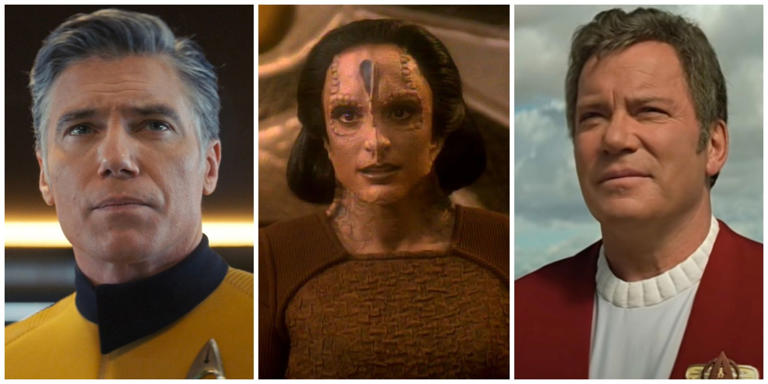
Den of Geek
Star Trek: Discovery Season 5 Episode 4 Review – Face the Strange
A twisty time loop offers a teachable moment for Commander Rayner as Discovery tumbles through its past—and future

- Share on Facebook (opens in a new tab)
- Share on Twitter (opens in a new tab)
- Share on Linkedin (opens in a new tab)
- Share on email (opens in a new tab)
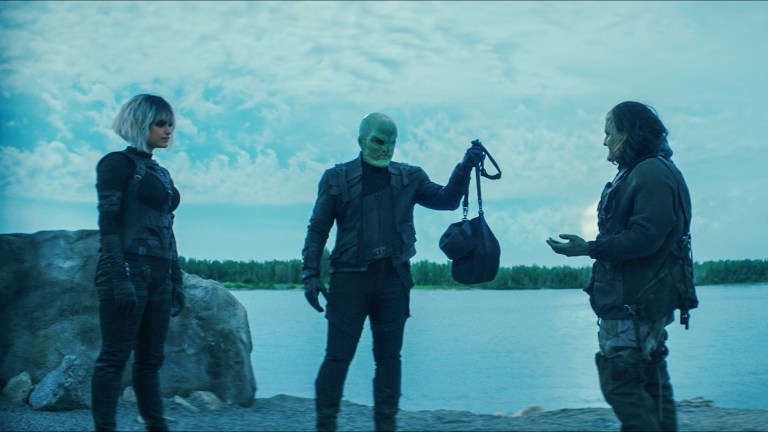
This Star Trek: Discovery review contains spoilers .
Star Trek: Discovery Season 5 Episode 4
Time travel has been a staple of science fiction ever since the genre was invented. And Star Trek has always been curious about the concept—from the basic rules of how it works to the widespread impact caused by the tiniest of changes to history. From The Original Series’ classic “The City on the Edge of Forever” to Strange New Worlds’ more recent Lower Decks crossover “Those Old Scientists” , the franchise is full of time travel stories. But Star Trek: Discovery has played around with the concept more than most, from season 1’s Harry Mudd episode “Magic to Make the Sanest Man Go Mad” to the headache (and potentially paradox) inducing Red Angel plot that saw the Discovery launched hundreds of years into the future at the end of season 2.
To be fair, season 5’s “Face the Strange” time travel shenanigans are a bit more straightforward, if not particularly subtle about the larger aims of the episode. Rayner’s still going through what might be called an adjustment period as he settles into his new role as Discovery’s first officer, and finds Burnham’s insistence on feelings and meaningful emotional connection to be an annoying and inefficient way to command.
What Discovery doesn’t seem to understand, however, is that part of the reason Rayner is so interesting as a character is precisely because he’s such a fish out of water amongst this group of people who regularly engage in the professional equivalent of braiding each other’s hair at sleepaway camp. (Let the man be cranky, for goodness sake!) And let’s not kid ourselves, despite the fact that it all works out for them this week, he’s also not wrong . Michael’s crew is undisciplined and overly familiar and don’t respect things like “chain of command” or “basic boundaries.” Yes, for the most part that’s worked out pretty well for them. But it’s also not exactly aspirational, or even particularly safe behavior, and Rayner’s not a bad person for pointing that out (or not liking it).
Ad – content continues below
That said, no one is likely all that surprised that this episode is essentially a Teachable Moment from start to finish and pretty much solely exists to Impart the Value of Emotional Connection to a man who doesn’t enjoy engaging in small talk. But, thankfully, it also offers an intriguing twist on the always delightful time loop trope, and in doing so is much more entertaining to watch than it probably should be. Yes, everything gets resolved in peak Discovery fashion—Rayner must convince a disgruntled season 1 era version of Michael to trust that her journey ultimately gets better—but it’s also a surprisingly deft way to examine just how far this series’ central character has come from her first moments onscreen.
The premise of the hour is pretty simple: Determined to beat the Discovery crew to the next clue, L’ak and Moll have smuggled a time bug on board the ship, a creepy-looking insect-like device leftover from the temporal war. It paralyzes ships by freezing and cycling them through time until it runs out of power, a process that could take weeks or months to play out. Thanks to this little (literal) bugger, Discovery’s now stuck hurtling through various snippets of its own history in the same place, and Burnham and Rayner—who were in the process of transporting just as the first loop hit and thus are unaffected by it—have to learn to work together to stop it before their enemies beat them to the next clue.
Well, the two of them and Stamets, who also exists out of time because of his tardigrade DNA and is aware of the looping going on, a sentence that is truly as ridiculous to type as it is to read. This show sometimes, y’all. Rayner’s expression when told about the tardigrade situation is how I often feel if I think too hard about the specifics of some of these plots.
Anyway, while our heroes try to figure out the pattern to the various time jumps and how long each will last, we’re bounced through some of Discovery’s greatest narrative hits. Burnham and Rayner find themselves on the bridge of the ship during its trip through the wormhole to the 32nd century, in dry dock as it’s being built, and in the midst of the crew’s battle with Section 31’s sentient AI, Control, before being yanked away again. There’s a blast back to Gabriel Lorca’s time in the captain’s chair (though, sadly, Jason Isaacs doesn’t make an appearance) and even a quick trip to the future—one that’s apparently full of destruction and death because Moll and L’ak managed to snag the Progenitors’ secret technology and sell it off to the highest (presumably terrible) bidder. All the more motivation for our heroes to figure out how to dislodge the time bug without destroying the ship or killing themselves in the process!
They’re successful only when Michael realizes she has to tell the Klingon War-era crew that she’s from the future and trust that the bonds she’s forged with them will be enough to convince them to help her. It works, of course, because this episode exists to teach Rayner a Valuable Lesson, but not before Michael must confront some uncomfortable bits of her past: namely, her obvious lingering feelings toward Book—that David Ajala basically appears in this episode solely to be shirtless is peak fan service—and her messy personal past as a mutineer. Michael, undoubtedly, has come a long way from the rash, furious girl who accidentally got her mentor killed and started a war. (And no matter how insufferable you might find Burnham now, whew, this is a timely reminder that she used to be so much worse . Growth is possible and real!)
That Rayner ultimately uses the personal information Michael gave him—and the very specific story about how lost Michael had felt when she first came aboard Discovery— to convince her past self to allow him to save the future is this show at its most try-hard. But at this point, that either works for you or it doesn’t, and “Face the Strange” is an entertaining enough hour that the convenience of its resolution isn’t even as annoying as it probably ought to be.
With just 10 episodes in its final season, your mileage may (and likely will) vary when it comes to the usefulness of including an episode like this one, which doesn’t do much in terms of moving the larger story along. (In fact, it’s very clearly filler meant to cover for the fact that with just five pieces in the puzzle the crew is chasing, they literally can’t find a clue in every episode!) Technically, almost nothing of any significance happens during this hour.
Get the best of Den of Geek delivered right to your inbox!
Adira seems remarkably fine for someone who just went through a surprise break-up. Saru and T’rina are entirely absent, so it seems safe to assume their engagement news didn’t cause some intergalactic political incident. And I guess Dr. Culber must still be sleeping off the whole Trill symbiont possession thing. We learn nothing new about the Progenitors or the tech they left behind. And though Moll and L’ak at least appear in this episode, all we learn is that they want to be free and together, and somehow the payday from finding the god-like technology before Michael and the Federation do is going to ensure that. Can’t wait for the flashback episode that fills us in on that particular misunderstood backstory, is what I’m saying.

Lacy Baugher
Lacy Baugher is a digital producer by day, but a television enthusiast pretty much all the time. Her writing has been featured in Paste Magazine, Collider,…
Star Trek: Discovery Season 5 Episode 4 Review: Rayner & Burnham Faced the Strange
By using a Time Bug, Star Trek: Discovery Season 5, Episode 4 revisited the series' greatest hits, and deepened its heroes' characters and journeys.
The following contains spoilers from Star Trek: Discovery, Season 5, Episode 4, "Face the Strange," now streaming on Paramount+ .
In Star Trek: Discovery Season 5, Captain Michael Burnham and her crew are in a race against a pair of space-pirates for the future of the Federation. Yet, with only five clues to find before getting to the finish line, there were bound to be some detours. "Face the Strange" is one such side-mission, but it's also a brilliant way to look back at the series' larger journey from being the new kid on the franchise's block to becoming a classic Star Trek series .
Producers said that Season 5 wasn't supposed to end the series, yet this episode is a perfect addition for its final mission. By using time travel as a framing device, the episode looked back at the journey the crew, and especially Burnham, embarked on ever since the show launched in 2017. This was exactly the kind of nostalgic and emotional trip down memory lane that one would expect a character-driven series like Star Trek: Discovery to do in its swan song.
Of course, time travel shenanigans are a classic Star Trek motif, and Star Trek: Discovery already had its share of such adventures. That said, what made this particular time-traveling escapade special was that it allowed for the return of a long-lost character, and it gave Commander Rayner a chance to further define and refine his character while also affirming his place on the Discovery's crew . While his connection to the crew is still a bit tertiary, this episode really showed that Burnham and Rayner made a fantastic and complementary duo.
Face the Strange Revisited Star Trek: Discovery's Greatest Hits
Captain michael burnham and commander rayner relived some of the show's best moments, star trek: discovery ending is a blessing in disguise.
At the end of "Jinaal (Season 5, Episode 3)," Moll slipped into the Trill symbiont caves and planted a strange device on Ensign Adira Tal's sleeve. When "Face the Strange" opened while affirming that the recently broken-up Gray Tal and Adira will remain friends, the spider-like device (later referred to as the Time Bug) crawled from their sleeve and onto the ship.
Meanwhile, Rayner's harsh style of command rubbed Burnham the wrong way. She asks him to join her in the ready room for a slight dressing down, which inadvertently proves to be the crew's saving grace. When the Time Bug does its dirty work, the captain and first officer use their personal transporters, which prevents them from becoming unstuck in time like the rest of the ship and crew. This allowed them to find a way to free the Discovery from its time-displaced prison, and to reflect on their lives.
There is a brief jaunt to the future, Burnham and Rayner learn that their crew died and that the Federation was decimated after a Breen attack. This was also the third mention of the Breen this season, and one of their heaviest bits of foreshadowing yet. Interestingly, this grim sequence evoked the Star Trek: Short Treks episode "Calypso (Season 1, Episode 2)," which featured a marooned soldier many, many tears in the future encountering an abandoned USS Discovery occupied only by Zora.
The two Starfleet officers then appear on the ship during its journey through the wormhole at the end of Season 2. Next, they were thrown back to the battle against Control, the evil artificial intelligence that wanted to merge with the "Sphere Data" that became Zora. They also traveled to the distant past before the Discovery was even launched. However, their most important trip to the past took place just a few weeks after Burnham joined the ship. The best thing about this sequence was that it allowed Airiam, the human-turned-cyborg who died in Season 2, to return for a brief few scenes. That said, this sequence was all about Burnham and her personal journey.
Captain Michael Burnham Confronted Her Past, Insecure Self in Face the Strange
It's been a long road for michael burnham, going from mutineer to captain, star trek: discovery's alex kurtzman & michelle paradise talk final season.
As Rayner and Commander Paul Stamets try to figure out how to stop the Time Bug, Burnham encountered her past self in a turbolift. Past Burnham immediately thinks her future self is a shapeshifter. Nitpicky fans might wonder why Future Burnham didn't just drop some knowledge only they would know. However, in a universe with wormholes, time travel and the USS Discovery's spore drive , the possibility of a shapeshifter using their telepathic abilities to copy the memories of whoever they impersonated wasn't a big stretch. This led to a fun sequence where Burnham fought her past self.
After incapacitating her past self with a Vulcan Nerve Pinch, Burnham gave voice to the subtext of this entire journey. Burnham reminded audiences just how desperate things were for her back then. She was Starfleet's first mutineer, and her actions led to the death of her mentor, Captain Philippa Georgiou. Even though the Klingon leader, T'Kuvma, was going to start a war with the Federation, Burnham also blamed herself for this close call. The most unbelievable thing for the understandably self-loathing Past Burnham to accept was a future in which she not only had rank again, but was trusted enough to be given a ship.
While this makes Burnham Star Trek 's most relatable captain among the franchise's imperfect fans, the character herself can't believe she could attain new heights after falling so far. Yet, in trying to stop Rayner and Stamets, Burnham again proved her worth . She's determined to do the right thing to protect her ship, her crew and Starfleet itself. This episode underscored that Burnham's unique skill isn't her intellect or fighting prowess, but her commitment to higher ideals even when she thinks she's failed them in unforgivable ways.
Commander Rayner Finally Connected with the Crew in Face the Strange
Commander rayner learned new things about himself by visiting the past, star trek: discovery actors doug jones & david ajala prepare for their last adventure.
While Burnham is and always was heroic, it's actually Rayner who saved the day and the rest of time in this episode. Hearkening back to his previous attempts to know the crew, Rayner was now able to prove to Past Lieutenant Commander Gen Rhys that they do know each other. Rayner may have only given Reese 20 words, but these were enough to discover Rhys's affection for Constitution class ships like the USS Enterprise . Still, Past Burnham was not convinced. It's only through Rayner sincerely connecting with her and his own understanding of what it's like to fall from grace that seals the deal.
He told Past Burnham something no one but she could know. Specifically, that when she first stepped on the bridge of the Discovery, she felt like she didn't belong. Yet, he reaffirms that she does belong not just on the vessel, but in command of it. Yes, she's made mistakes, huge ones when compared to those committed by previous Starfleet heroes and captains. However, her heart is always in the right place. In Season 1, Burnham seemed more Vulcan than human, but her emotions were still there. In fact, she cared so much that she told Captain Gabriel Lorca she didn't deserve to serve on a starship.
Another touching moment between crew members in "Face the Strange" came via Rayner's collaboration with Stamets . He was already depressed this season since the spore drive is, effectively, dead technology. Rayner also killed his science-buzz upon realizing the potential of the Progenitor's technology. Yet, when Stamets was worried about being able to save the ship, Rayner motivated him by saying "old dogs" like them still had life-saving tricks up their uniform sleeves. Despite his gruff demeanor, this episode showed why Rayner was such a successful long-serving leader in Starfleet -- especially in a post-Burn galaxy.
Moll & L’Ak’s Time Bug Is a Brutal Weapon Tied to Star Trek Mythology
The time bug was used for more than just nostalgic fanservice, star trek: discovery's sonequa martin-green embarks on one final voyage.
Star Trek is full of near-magical and nonsensical technology like the transporters themselves , but even by these loose standards, the Time Bug is a little confusing. If Burnham, Rayner and Stamets weren't immune from its effects thanks to the latter's "tardigrade DNA," it's unclear exactly what the device does. Somehow, the present-day USS Discovery is incapacitated while the ship jumps back and forth through time. No one on the vessel is aware of this, and the crew complement changes with the times.
When Burnham and company arrive back in the 22nd Century, it's unclear what happened to folks like Commander Jett Reno or Adira, who were always in the 32nd Century. Trying to figure out how the Time Bug works is really a waste of time, since it's nothing more than a fun sci-fi concept that was used to drive an episode. The show gets around this when Rayner says the Time Bug is technology leftover from the Temporal War first introduced back in Star Trek: Enterprise, and wrapped up for good in Star Trek: Strange New Worlds ' Khan episode .
In previous episodes, Star Trek: Discovery Season 5 brought in connections to the Star Trek: The Next Generation episode "The Chase (Season 6, Episode 20)," and it also built on the Trill mythology established in Star Trek: Deep Space Nine . The Time Bug is yet another way the series used past Star Trek events to tell new, fresh stories instead of just dropping cute Easter Eggs. The bug was an illegal black-market weapon, but one that (despite its inconsistent details and lack of specifics) fit neatly into this six-decade-old universe.
While the crew lost six hours in their race against Moll and L'ak, they still came out ahead. They are now a more cohesive unit than ever before, meaning they will face whatever challenges come next as a tightly-knit crew. This was the way that any Star Trek crew should be.
Star Trek: Discovery debuts new episodes Thursdays on Paramount+ .
Star Trek: Discovery
- Time Bug allows for the series to revisit past moments and characters in its final season.
- The focus on Burnham's journey from mutineer to captain underscores her remarkable journey over five seasons.
- The episode reveals more aspects to Rayner's character making him more well-rounded.
- "Face the Strange" is a near-perfect blend of action, sci-fi problem-solving, and character moments.
- The ensemble takes a backseat because of the time-travel nature of the episode's plot.
- Moll and L'ak return for a scene but are still not as present as in each episode as perhaps they should be.
- Saru and T'Rina don't appear making last episode's story with them feel more like an aside.
- Other than Ariam, past characters like Ash Tyler, Nilsson, Captains Lorca or Pike don't appear feeling like a missed opportunity for a final season victory lap.
- The Original Series
- The Animated Series
- The Next Generation
- Deep Space Nine
- Strange New Worlds
- Lower Decks
- Star Trek Movies
- TrekCore on Twitter
- TrekCore on Facebook

Or, they try to. And okay, it turns out the gratuitous beaming was for good reason, story-wise, because in the instant that the pair attempt to beam back to the bridge, Discovery plunges through time, and only their mid-transport timing protects them from the ship’s time-hopping. Everyone else aboard Discovery is experiencing “regular” time travel, as it were, unaware of their movement and remaining “of the time” they jump to.
Everyone, that is, except for Paul Stamets (Anthony Rapp), who thanks to his tardigrade DNA infusion all the way back in Season 1, the scientist is bouncing through time like the rest of the crew — but he’s mentally aware of the jumping remains “himself” like Burnham and Rayner.
Like “Magic to Make the Sanest Man Go Mad,” this is another episode about time shenanigans centering on Stamets and Burnham (and now also Rayner), but it doesn’t feel like a repeat of the same story so much as a deliberate permutation on a theme. Discovery , the show, is revisiting its past just the same way Burnham revisits her past self here; in both cases, the future versions have grown and changed in ways their past selves could never have imagined.
Who could have guessed, watching the series’ seventh episode, that original showrunner and creator Bryan Fuller would leave after just one season and a majority of the show would end up taking place in 32nd century? Not me, that’s for sure.
(As a side note, I was hoping one of the pasts they visited would be the “Magic” situation, just because come on, who doesn’t want to see what a time loop within a time loop looks like?)
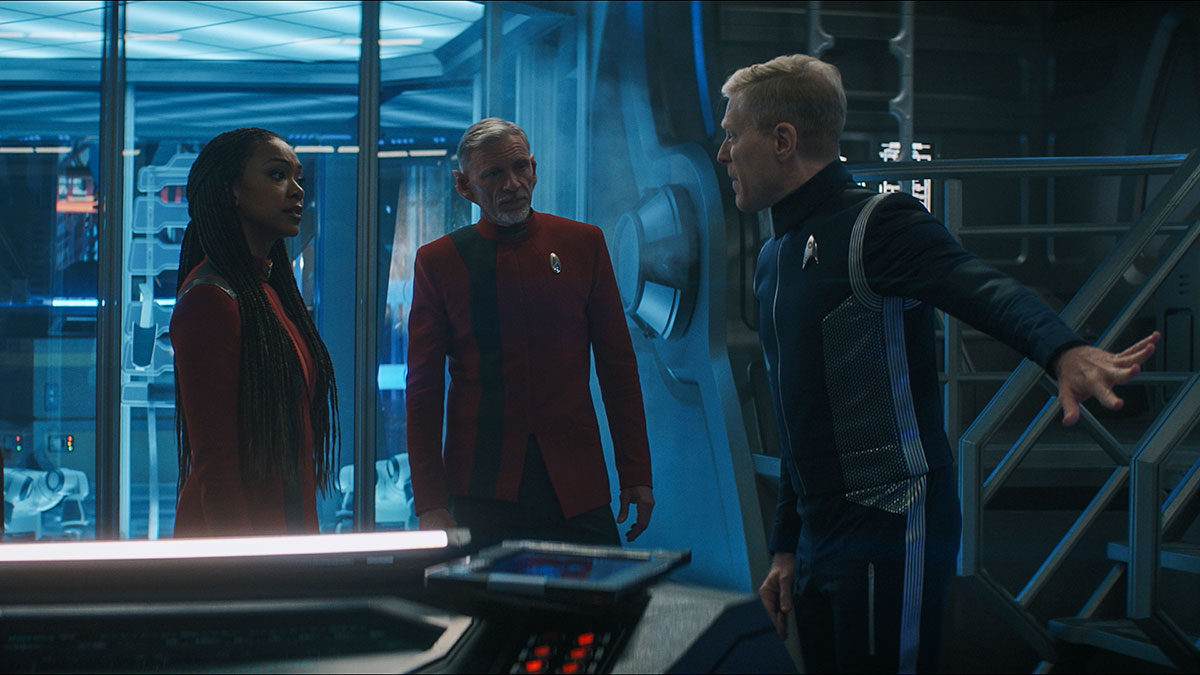
It takes them all a few time jumps to figure out what’s going on, and a few more after that for all three of them to rendezvous. The second jump takes them back to Discovery mid-construction, sitting in dry dock at the San Francisco Fleet Yards, the Golden Gate Bridge framed nicely in a missing bulkhead section. (Both Star Trek and The Room have one rule: If you’re in San Francisco, the Golden Gate Bridge must be visible at all times!)
Next jump is to the Season 2-ending battle with Control, and finally with three jumps there’s enough of a pattern visible for Rayner to identify what’s going on and what, exactly, is causing it. First, each time they jump Burnham and Rayner always return to the ready room – the place where they beamed themselves out of time — and second, that little mechanical spider that’s been crawling around the ship since it first detached itself from Adira’s uniform is a Krenim chronophage (yes, those Krenim ) left over from more lawless times when paralyzing a ship by having it randomly cycle through time was a thing that apparently people did.
After a few more jumps, including one where a past version of Jett Reno (Tig Notaro) happens to save Rayner’s hide, he and Burnham land on an empty, dusty Discovery , abandoned by everyone except the one person who can’t leave: Zora (Annabelle Wallace). Listening to “Que Sera, Sera” and convinced that she’s dreaming, Zora explains that in this future, Discovery remained stuck in its time paralysis long enough for the Breen to get their hands on the Progenitor’s technology.
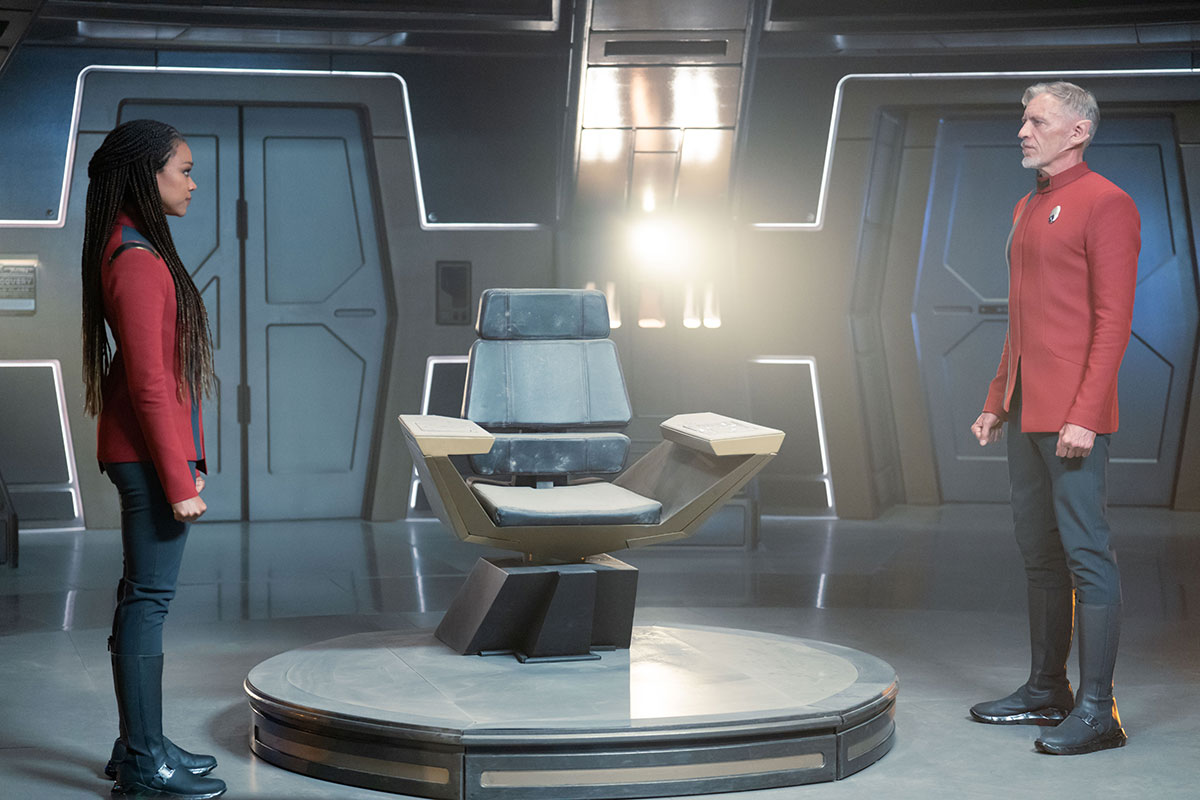
It’s a bleak future to visit, but it’s also very fortuitous that they did, because Zora is able to quickly do the math necessary for Stamets — who they finally meet up with in the next time jump –to figure out how to get them out of this. Just build a chroniton stabilizer and squish the bug with it, easy peasy!
And all Burnham has to do is get a component for it from her quarters without being seen. Not so easy as it turns out, as she runs into Book (David Ajala) who is very much in love with Burnham during this time period — and keen to show it. And she, as we all probably suspected, is still very much in love with him and gives herself a brief moment to indulge in that fact.
In their final final jump — this time to early in Lorca’s captaincy — Burnham runs into her much angrier and more jaded younger self; a Michael Burnham who is so barely out of prison that she still doesn’t even have a combadge and who flat-out does not believe this woman in a strange red uniform who claims to be her. Why? Because there’s no way anyone would ever make Michael Burnham a captain .
After a fight in a thankfully empty corridor, our Burnham ends up victorious and heads to the bridge… where she needs to convince everyone that they should listen to her and do something you never really want to do with a warp engine going at maximum speed: intentionally break the warp bubble and slam yourself back into the effects of general relativity.
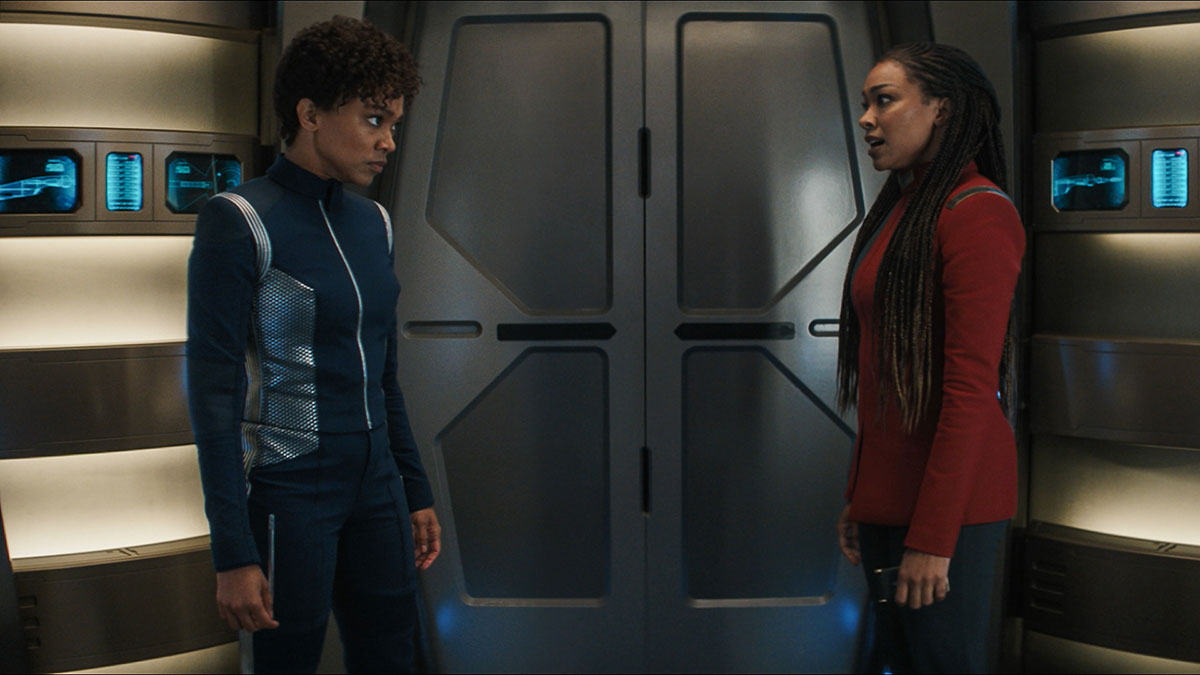
Flashbacks are a tried and true way for shows to bring back departed characters, so the choice to include Airiam (Hanna Spear) on the bridge makes sense and is nice for audience members who miss her. What doesn’t really make a whole lot of sense to me is how her presence is used (which is a bit of an unfortunate parallel to her death for me – or at least the impact it was supposed to have).
Burnham knows she needs to convince the crew that she really is herself and that she really is from the future, but instead of, I don’t know, showing them her combadge which is full of 32nd century bells and whistles and exotic alloys that haven’t been invented yet she… convinces Airiam that they know each other because Burnham knows Airiam would sacrifice her life to save the ship? Then someone blurts out a “No she wouldn’t!” like that’s not the first thing any appropriately heroic Starfleet officer would do?
This scene is the one fumble in an otherwise great episode. Two minutes after this weird “I know you and here’s a generic hypothetical that applies to most people in Starfleet to prove it,” Airiam sees Burnham’s fancy holographic combadge and openly gawks at it. See, easily convinced! That would have worked and it wouldn’t have required the show to reexamine the hollowness of Airiam’s death without correcting its mistake.
The fact that Burnham doesn’t have anything better or more personal to say to or about Airiam except “You died, sorry that happened,” underscores just how undeveloped she was as a character. Why bring that up again? But hey, Burnham’s tactic works, and I suppose that’s what really matters here.
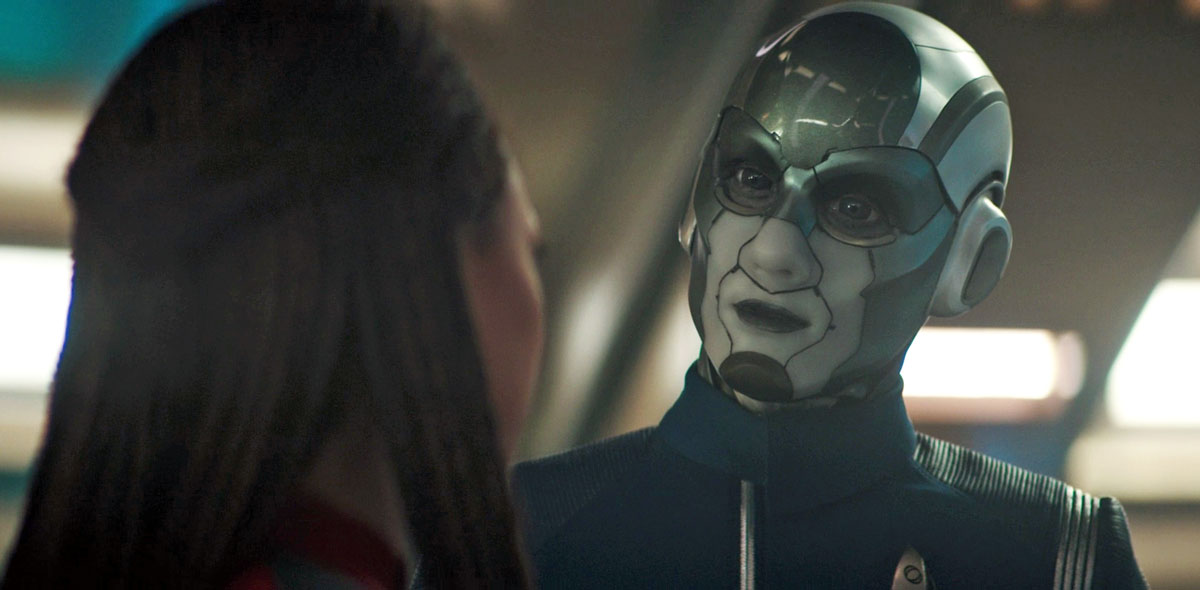
Meanwhile, past-Burnham and her era’s Rhys (Patrick Kwok-Choon) show up in engineering, phasers drawn, to try and stop Stamets and this weird guy they’ve never seen before from doing whatever it is that they’re trying to do to the ship. Rayner, solidifying himself as a solid gold example of a favorite character trope of mine — Grumpy Guy who’s a Secret Softie — defuses the situation by being brave as hell (he walks right into Burnham’s drawn phaser) but also emotionally astute.
He doesn’t just tell Burnham personal facts he couldn’t have known if he were really a stranger, he tells her with conviction that she really does deserve to be here on Discovery… something that sinks to the core of who she is and what she’s battling in this moment in time.
The plan succeeds: the time bug is proverbially squished, and Discovery and her crew are all right back where they belong, minus the six hours they lost during all the jumping. Unfortunately, those six hours were long enough for Moll and L’ak to catch up with them and leave again. Did they find anything, or did they get sick of looking at seemingly empty space and leave? We don’t know yet, so tune in next week.
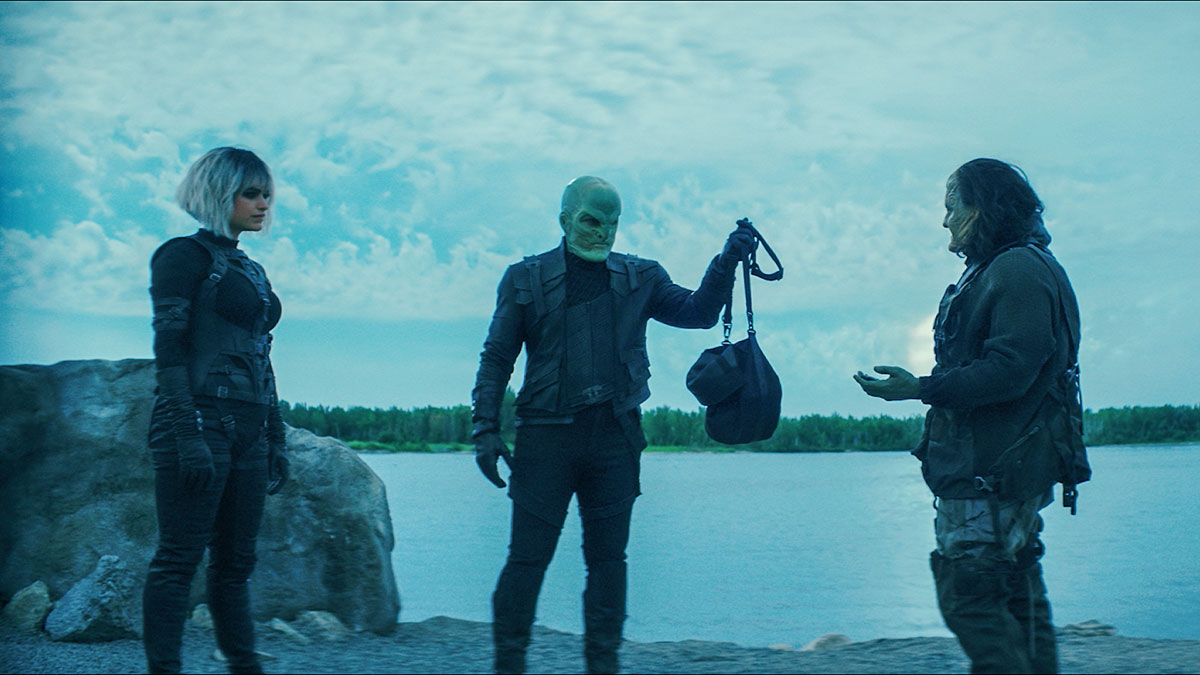
Which brings us to the beginning of “Face the Strange” — see, I can jump through time too! — when we see Moll (Eve Harlow) and L’ak (Elias Toufexis) acquiring the bug in the first place. While the Progenitors’ technology is enormous in its power and implications and Moll and L’ak are willing to do just about anything to find it, their motivations seem strictly personal.
Sure, if the way Moll takes revenge on the guy who sells her the chronophage is any indication, they’ll get some personal satisfaction out of seeing the Federation burn, but more than anything they’re in it for their freedom. Freedom from someone or something, certainly – though who or what we still don’t know – but, given the themes in “Face the Strange”, I’d guess freedom from their pasts might be the real goal.
OBSERVATION LOUNGE
- “Face the Strange” is a reference to the David Bowie classic “Changes.”
- This episode is a spiritual sequel to Star Trek: Voyager’s “Shattered,” a similar final-season tale which saw Chakotay bouncing through different eras of Voyager adventures.
- Discovery’s time jumps include visits to the ship’s transit through the Red Angel wormhole (leading to the ship’s crash-landing in “Far From Home” ), a time when the starship was under construction in the San Francisco Fleet Yards, the battle with Control ( “Such Sweet Sorrow, Part 2” ), Stardate 865422.4 (during Osyyra’s takover in “There Is A Tide…” ), an unknown date nearly 30 years into the future, a period in early Season 2 (shortly after Jett Reno’s rescue in “Brother” ), a point ahead of the Season 4 premiere after Burnham was promoted to captai), and the encounter with past-Burnham which takes place just ahead of “The Butcher’s Knife Cares Not for the Lamb’s Cry” (denoted by the reference to a still-alive Ellen Landry ).
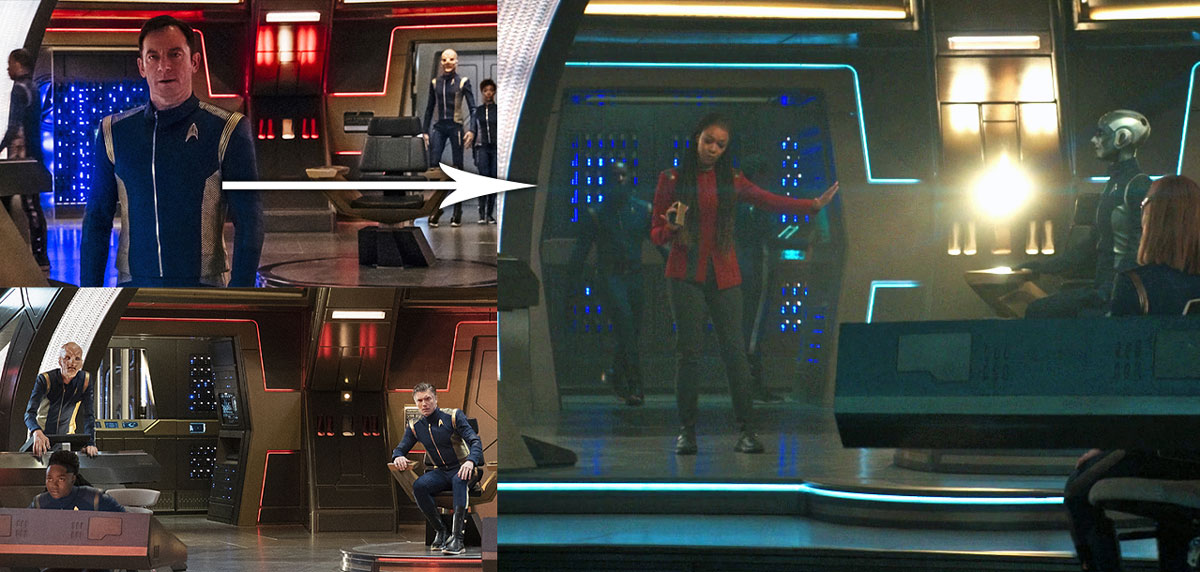
- Retrofit into corridor after Season 2’s set updates, the passage to the left-rear of Discovery’s command chair returns to its Season 1 “blue blinkies” configuration.
- Captain Pike’s broken wood-and-glass conference table returns to the ready room set during the first time jump, a good touch from the set decoration department.
- We’ve seen the San Francisco bay many times in Star Trek history… so just where in the heck was Discovery’s dry dock located?
- A Krenim chronophage — or “time bug” — snared Discovery in a time bubble, from the species behind Star Trek: Voyager’s “Year of Hell.”
- Season 3-era Reno’s drink of choice is a Vesper martini, served ice cold — and she tells Rayner that he can buy her a drink “at Red’s,” the onboard bar and lounge set added to Discovery during its 32nd century upgrades (though not introduced until Season 4).
- While the ready room set was not built for Discovery until Season 2, the second time jump confirms the room existed as part of the ship’s original construction… but in a continuity goof, the 32nd century version of the Starfleet emblem remains on the Discovery ready room floor in each different time period, instead of the old version seen in Seasons 1 and 2.

- Burnham gives a blink-and-you’ll-miss-it nostalgic smile when Stamets hands her a 23rd century Starfleet communicator, retired after the crew upgraded to 32nd tricombadges in Season 3’s “Scavengers.”
- Saurian officer Linus (David Benjamin Tomlinson) appears in the Season 1 time period, indicating he boarded Discovery long before his first actual appearance in Season 2’s “Brothers.”
- Former Discovery cast members Hannah Cheesman and Ronnie Rowe, Jr. return as Airiam and Bryce, Julianne Grossman returns as the original voice of Discovery’s computer. (While Cheesman portrayed Airiam in Season 2, the role was actually portrayed by Sara Mitich in Discovery’s first season.)
- I forgot just how much Airiam moves like C-3PO. Might have toned down that arm placement there in that wide shot if it were me, yikes.
- Discovery’s viewscreen may be an open window to space, but it features blast doors which can be closed as necessary.
- The future time period Burnham and Rayner visit is reminiscent of the alternate future setting in “Calypso,” where Zora and Discovery sat abandoned for nearly 1000 years. Zora even believes she’s having “another dream” when the officers arrive, perhaps hinting that the events of “Calypso” may have been one of Zora’s dreams — as the “Zora-point-of-view” shots mirror moments from that Short Trek tale.
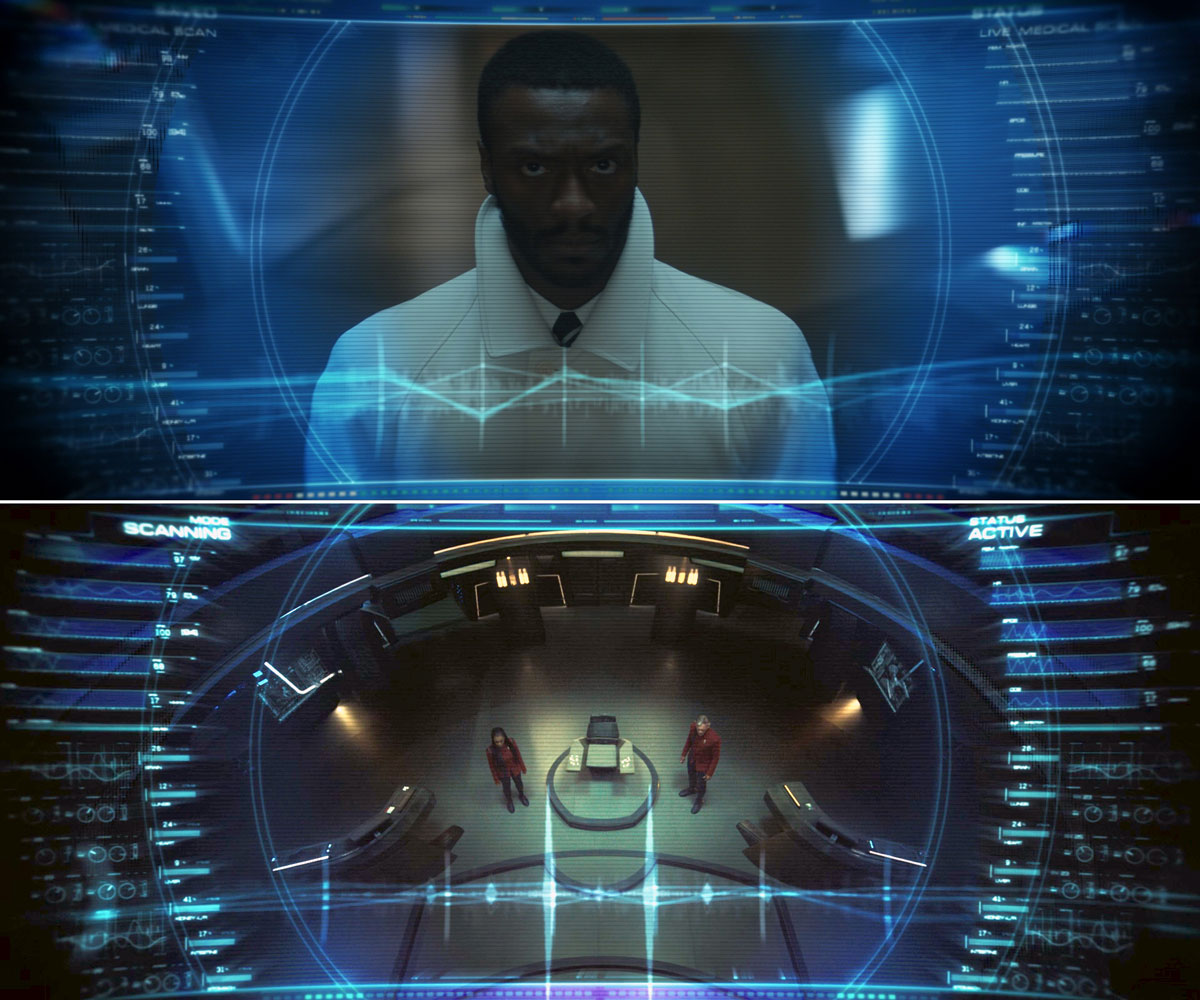
- This episode marks the first time we’ve seen Discovery’s original hull and nacelle configuration since its big 32nd century upgrade in “Scavengers.”
- Even living “outside of time,” it’s curious that Stamets can jump back to a time period before his tardigrade DNA injection occurred.
- Stamets’ tactics for clearing engineering get less and less sophisticated as the episode proceeds — going from making up specific problems with the spore drive containment field to just shouting “I’m grumpy!” It works.
- “Hey Paul, let’s show ‘em how a couple of old dogs still know the best tricks!” Whoever gave Rayner a used copy of a dictionary of idioms from 1962, I thank you for your service.
- Rayner’s hand gets the “Timescape” treatment, aging uncomfortably fast while he squashes the time bug — though thankfully avoiding those awful long fingernails.
- Rayner surmises that Burnham must be the first person in Starfleet to captain a ship she first boarded as a prisoner. He’s probably right, but if we allow for a few technicalities I’d put Seven of Nine in that rare club as well: she’s imprisoned very quickly after boarding Voyager , and while she doesn’t hold a Starfleet rank at the time, she does command that vessel for over a month during the events of “One”.
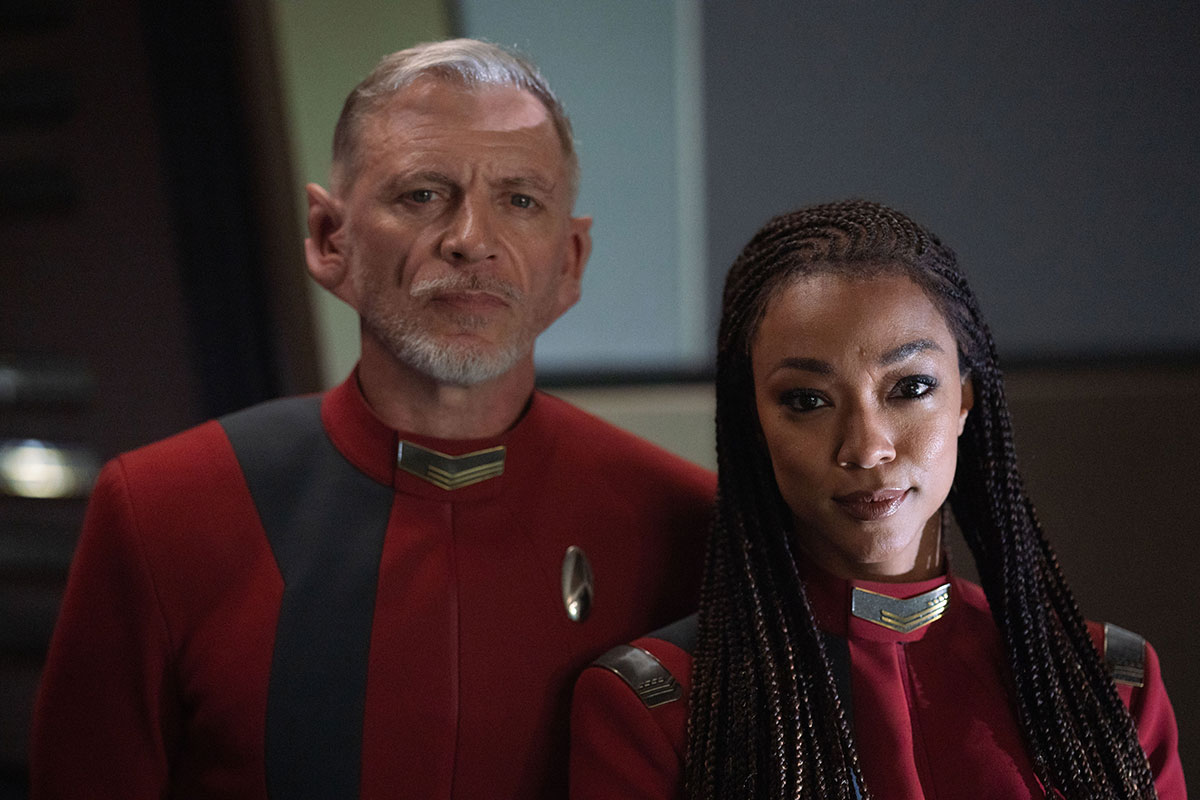
Even with all the time jumping and the temporal-relativity-heavy plot, “Face the Strange” is a straightforward hour of television that confidently knows exactly what it wants to do – both in terms of the story and the characters. There are almost no extraneous moments, but the episode doesn’t feel rushed or overly full. The pacing is great: quick enough that we get to jump through a lot of different time periods, but relaxed enough that there’s room for smaller moments of comedy and character work.
The pacing and placement of the more emotional moments is especially effective, with characters examining and confronting their past and present selves in a way that’s emotionally resonant but also truly moves the story forward both at the episode and season levels.
A frequent frustration I have with Discovery is that the emotional beats and plot beats feel like they’re competing with each other for the same space, but with “Face the Strange” it feels like the show has finally figured out a way to have them work together and compliment one another.
Star Trek: Discovery Season 5 returns with “Mirrors” on Thursday, April 25.
- DSC Season 5
- Face the Strange
- Star Trek: Discovery
Related Stories
New star trek: discovery photos — “mirrors”, interview — sonequa martin-green on burnham’s “face the strange” encounter, star trek: discovery review — “jinaal”, search news archives, new & upcoming releases, featured stories, lost-for-decades original star trek uss enterprise model returned to roddenberry family, star trek: lower decks cancelled; strange new worlds renewed for season 4, our star trek: discovery season 5 spoiler-free review.
TrekCore.com is not endorsed, sponsored or affiliated with Paramount, CBS Studios, or the Star Trek franchise. All Star Trek images, trademarks and logos are owned by CBS Studios Inc. and/or Paramount. All original TrekCore.com content and the WeeklyTrek podcast (c) 2024 Trapezoid Media, LLC. · Terms & Conditions
'Star Trek: Discovery' Season 5's Captain Rayner Ran His Ship Like a Pirate
Callum Keith Rennie also discusses coming into 'Discovery's final season, getting into prosthetics, and how much he has in common with Rayner.
The Big Picture
- Callum Keith Rennie's Captain Rayner brings conflict and depth to Star Trek: Discovery 's final season.
- Rennie discusses his experience on Star Trek: Discovery , praising the supportive cast and crew, despite the initial challenges of joining an established series for its last season.
- In Season 5, Episode 4 "Face the Strange," Burnham and Rayner must work together within a time bubble to save the universe.
As Captain Michael Burnham ( Sonequa Martin-Green ) embarks on one last adventure with her crew, Star Trek: Discovery Season 5 is bringing a few new characters along for the ride. Chief among those newcomers is the blunt, war-worn Captain Rayner. Played by Battlestar Galactica alum Callum Keith Rennie , Rayner is Burnham's new second in command on the Discovery , taking over after Saru ( Doug Jones ) took a different position at Starfleet.
Having lived through The Burn, Rayner doesn't have time for niceties and butts heads with Burnham almost immediately — so naturally, she takes it upon herself to give him a second chance when Starfleet is ready to cut him loose. Last week's episode saw him, rightfully, put in his place a bit as Tilly ( Mary Wiseman ) attempted to help him connect with the crew, much to his chagrin. In Season 5 Episode 4, "Face the Strange," Rayner and Burnham are thrown into a time bubble, forcing them to work together if they ever want to get back to the correct timeline and prevent the universe from being destroyed.
Ahead of the episode, I sat down with Rennie to dig into Rayner's backstory, what we can expect from him in the rest of the season, and what it will take for Rayner to truly connect with the crew of Discovery . During our conversation, we also discussed Rennie's history with sci-fi, what it was like joining Discovery for the show's final season, and what he's taking away from the whole experience.
Star Trek: Discovery
*Availability in US
Not available
Taking place almost a decade before Captain Kirk's Enterprise, the USS Discovery charts a course to uncover new worlds and life forms.
Rennie is no stranger to science fiction, having had roles in such series as The Umbrella Academy , Jessica Jones, and Battlestar Galactica. As Battlestar Galactica was the series that turned me into a sci-fi fan, and perhaps Rennie's most recognizable role, I had to ask him about being a part of such massive and beloved franchises within the genre. "It's amazing," he said. For Rennie, even though Battlestar was also a reboot of a classic series , the show's success was a lot less predictable than the mainstay that is Star Trek . He explained, "Like, say Battlestar , when I started on that I had no idea where that one was gonna go. Discovery was already very established , but I actually didn't let any of that into my [head], because I went, “That's not gonna help.” So, I didn’t. Now, I'm feeling the world of it. Now, I'm sensing what the world of Discovery is and how many people love it, and how it fits. "
Discovery also isn't his first experience with Star Trek , "I watched the original. That was my thing, and that was it," Rennie told me. While he may have missed some of the series' in between, saying, "There's big chunks of time where I just didn't watch a lot of TV, so I missed all of the other stuff," he'll always make time for The Original Series when he comes across it, "even if the old Star Trek comes on, I'll still watch it because that was my Star Trek . Jim Kirk, and all of that. "
While we've gotten a pretty good sense of who Rayner is in these first four episodes, most of his backstory remains a mystery. Rennie revealed that "some backstory comes up in a few episodes." Part of his gruff exterior will be explained as we'll "get a sense of why he's maybe got a chip on his shoulder and has some unprocessed resentments about a bunch of things that maybe have played out in his work in a negative way."
Rennie Calls 'Star Trek: Discovery's Latest Episode "Amazing"
"Face the Strange," is such a classic Star Trek episode, employing the ever-entertaining sci-fi trope of sticking our main characters in a time loop, both to put an obstacle in their path as well as to bring them face to face with some of their own demons. For Rennie, the episode really put the science in science fiction. "It was like, 'Whoa! What's happening? I don't get it.' There's just so much science stuff and talk, so much jumping about to places and history and stuff." But he had high praise for his fellow castmates as well as the crew behind the camera." Lee [Rose] being the director, you're in great hands. Being in scenes with Sonequa, you know that you're gonna be in it , and it was great. I watched it again last night, and there’s just an amazing amount of stuff in there. It was just an amazing episode. "
In this episode, Burnham and Rayner are tossed back in time to the first season of Discovery , bringing them both face to face with the version of Burnham who's fresh off her own demotion in Starfleet . Throughout the episode, it becomes quite clear that Burnham and Rayner have a lot more in common than either of them might have realized. When asked if this experience might put them more on equal footing, Rennie confirmed that "he's learned an understanding of the crew." He went on to point out that we haven't seen the relationship that Rayner had with his own crew.
He explained: "We're not on the Antares talking about his crew, which I think is an important part that we missed, where you go, 'How did I see my people on my particular ship? And how well did I know them?' No one's asking me how well I knew everybody because I did, but if I've only been there a brief time, you're only gonna have facts." He admits that it is important for Rayner to connect past the surface level. "Through that particular episode, you learn and go, 'Yes, it is good to know what people are up to and where they're from,' because in that particular instance, it saved us. So, I learned a thing, and I give a, 'Yes. Got it. Thank you.'"
Rayner Will Have to Shorten the Distance Between Himself and the Discovery Crew
While it doesn't sound like we'll be getting any flashbacks to Rayner's time on the Antares Rennie believes that he'd spent a similar amount of time with that crew as Michael has with hers. "We didn't get to inhabit that, I get to make it up in my own mind," he said. "But for me, it was more like a pirate ship that I had. " While Rayner comes off as the more stubborn, stick-to-the-mission Captain between him and Burnham, Rennie doesn't think he was quite so strict on his own ship. He said:
"That's the way I perceived it. It wasn't some rigid, completely stoic, boss fest, but a little bit of a wild card ship. We're gonna go into things that nobody else wants to go into, or knows how to deal with, but we would. "
While the walls around Rayner are still pretty high, Rennie explained that we will see him "shorten the distance" he's put between himself and the crew of the Discovery. "There's a great bit, there's an episode where Burnham leaves me again to take control of the ship. There's an interaction with everybody in a certain way because they don't like me yet. [Laughs] And I need some help a little bit, but I've created a distance, and I have to shorten that distance between everybody." He went on to say there are plenty of "fun dynamics" to look forward to and Rayner's insistence on keeping everyone at arm's length will likely come back to bite him.
Star Trek has quite a long list of original alien species created for the franchise, and Rayner just happens to be a Kellerun, a race that hasn't been seen since Deep Space Nine . In classic Trek fashion, Kelleruns appear mostly human with the most visible difference being the shape of the ears. As he follows in the footsteps of the likes of Leonard Nimoy and any actor who has ever played a Vulcan or a Romulan, I asked Rennie about getting into prosthetics for the role. "Those guys are great. Rocky [Faulkner] was great, Nicola [Bendrey] was great." While it was certainly an extra step the process was brief enough that it didn't bother him to come to set a bit earlier than usual. "That was probably an hour, and I really didn't think about that enough to go, 'Oh, that's right. I have to get up earlier.' But I think we got it down to an hour and a bit for just the ears because there’s a lot of stuff on them."
Despite the agonizing wait of sitting in front of a mirror for an hour, Rennie noted that Faulkner and Bendrey made the make-up experience as fun as it could possibly have been. He said: "I don't love just sitting there looking at myself for an hour, but there's music and great company and coffee, and it became a really sweet part of the day, and then another sweet part of the day where I download. " It wasn't his first time getting into prosthetics, but his previous experience had been brief. After playing Rayner across an entire season, Rennie admitted by the end, removing the glue actually started to feel like you'd expect pulling costume glue off your ears to feel. "There was a point near the end where the glue-on, glue-off became quite painful for a while."
The Support of the Cast and the Fans Are Highlights of Rennie's 'Star Trek' Experience
While this is Rennie's first season on the show, it's the final bow for Star Trek: Discovery . When asked what he'd be taking away from this experience, he had nothing but high praise for the cast and crew. As a newcomer on a well-established show, jumping into the fifth season had a bit of a learning curve. "I found that coming into the show was difficult for me because it was unlike a show that I'd been on before. It was already very well established." He went on to say:
"I pat myself on the back because I made it through, and there was this wonderful group energy that helped me do that. The good naturedness of the show was something that I maybe haven't worked on. There was a wholehearted goodness about it, which was quite nice, which overlapped into how people treated each other and mutual respect. Also, I kind of blocked out all Star Treks in my mind, so I'm there not thinking of Star Trek history. I'm just doing scene-to-scene and working on this stuff, and then it finishes, and then I forget that there's an incredible vast following of the show that somehow you are now part of it like that. All of that, this is all relatively new to me."
As a new addition to an already established group, I pointed out that it seemed as though Rennie's experience mirrored that of his characters, and he agreed. "I'm excited for people to see the season. And then, coming into it playing, “I don't want to be liked. It doesn't matter if I'm liked. I'm there to do my job, like Rayner, and I'm doing it. And then there's the after-effect of an incredible fan base that seems to be very supportive ."
You can watch our full conversation in the player above, and catch the latest episode of Star Trek: Discovery now on Paramount+.
'Star Trek: Discovery' Season 5 Review: One Hell of a Final Ride
Watch on Paramount+

Hi, what are you looking for?
TREKNEWS.NET | Your daily dose of Star Trek news and opinion
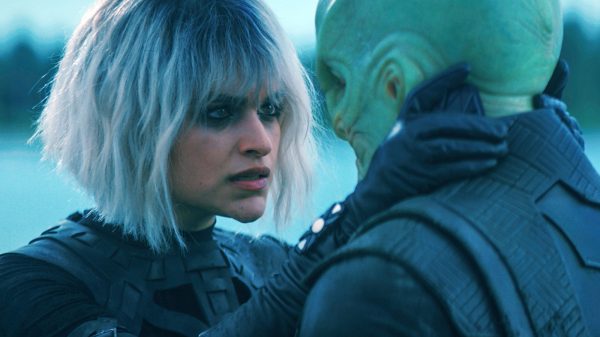
New photos from Star Trek: Discovery Season 5 Episode 4 “Face the Strange”
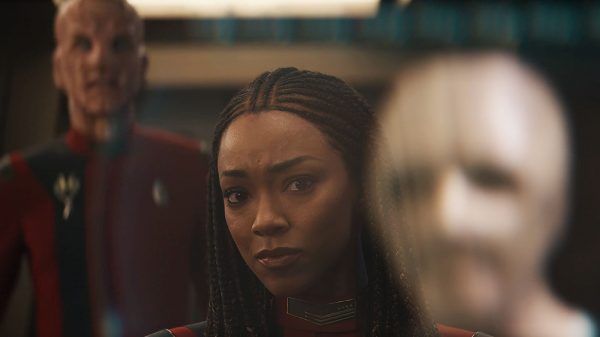
Star Trek: Discovery “Under the Twin Moons” Review: Clues among the moons
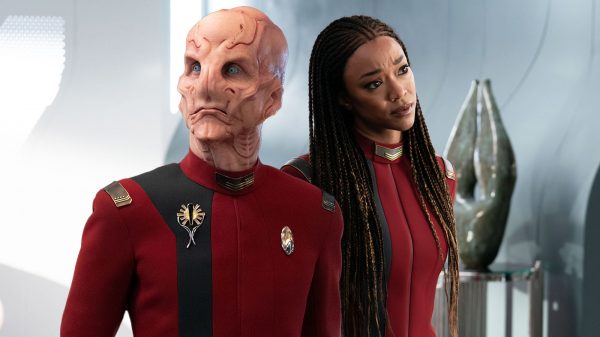
New photos from the first two episodes of Star Trek: Discovery season 5
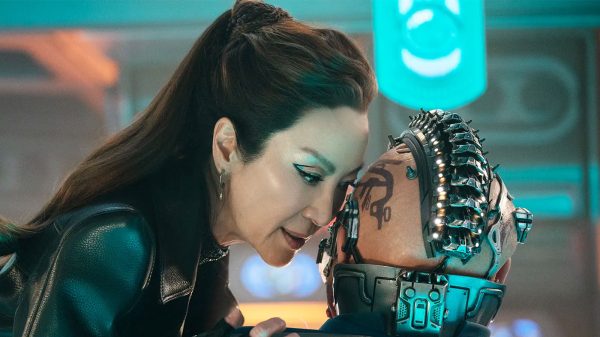
First Photo from Star Trek: Section 31 revealed, legacy character confirmed
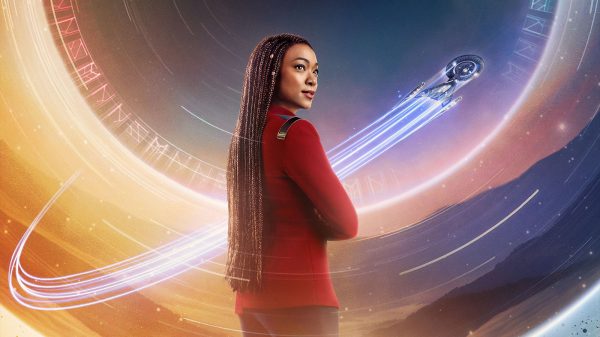
New Star Trek: Discovery posters revealed ahead of final season premiere
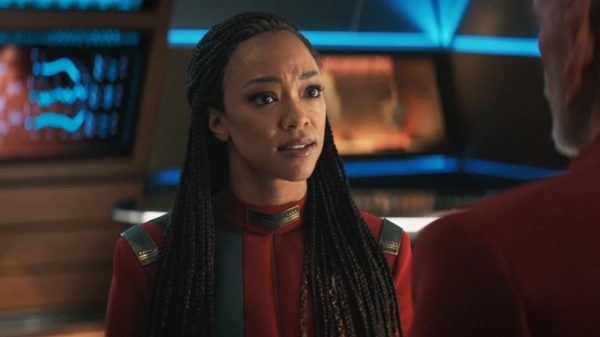
Star Trek: Discovery “Face the Strange” Review: Embarking on a Temporal Odyssey
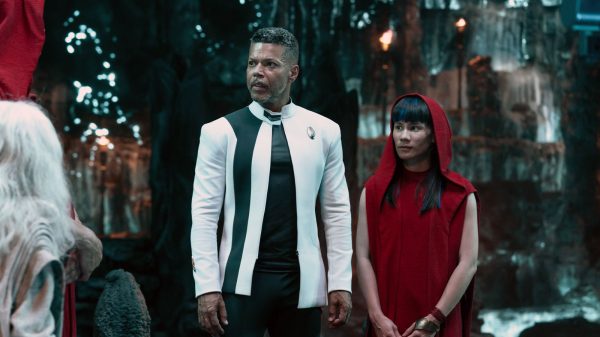
Star Trek: Discovery “Jinaal” Review: One step forward, two steps back
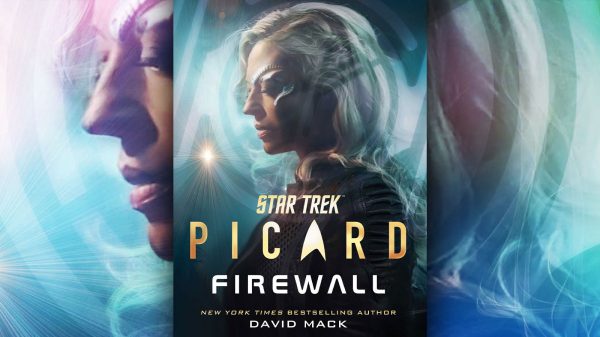
Star Trek: Picard — Firewall Review: The Renaissance of Seven of Nine
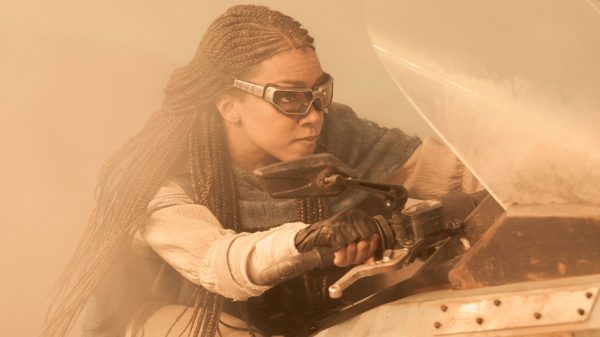
Star Trek: Discovery Season 5 premiere “Red Directive” Review: In Pursuit of Legacies
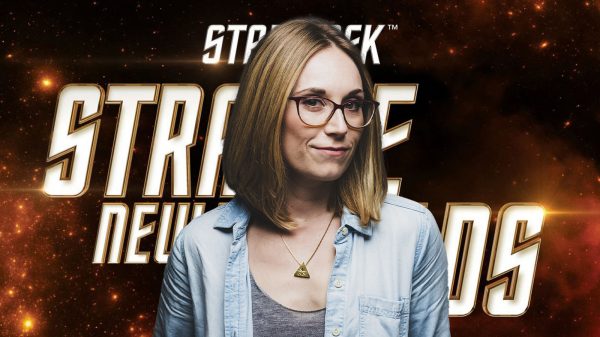
Strange New Worlds director Jordan Canning talks “Charades,” the versatility of the series & Star Trek fandom
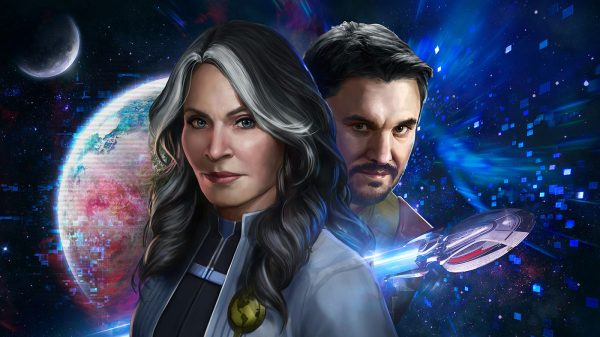
‘Star Trek Online’ lead designer talks the game’s longevity, honoring the franchise, and seeing his work come to life in ‘Picard’

Gates McFadden talks Star Trek: Picard, reuniting with her TNG castmates, InvestiGates, and the Human Condition

Connor Trinneer and Dominic Keating talk ‘Enterprise’, their relationship with Star Trek in 2023 and their first live ‘Shuttlepod Show’
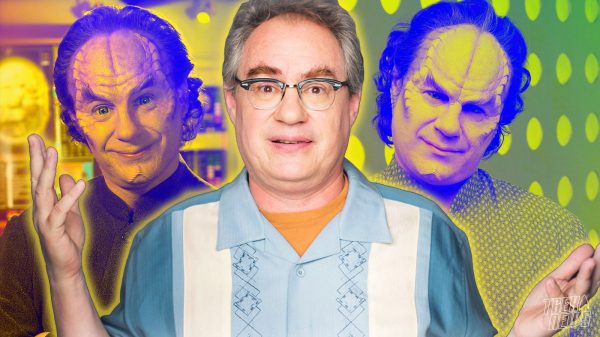
John Billingsley discusses what he’d want in a fifth season of Enterprise, playing Phlox and this weekend’s Trek Talks 2 event

57-Year Mission set to beam 160+ Star Trek guests down to Las Vegas
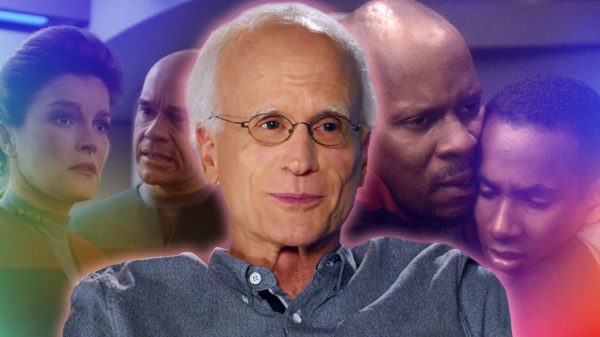
Veteran Star Trek director David Livingston looks back on his legendary career ahead of Trek Talks 2 event
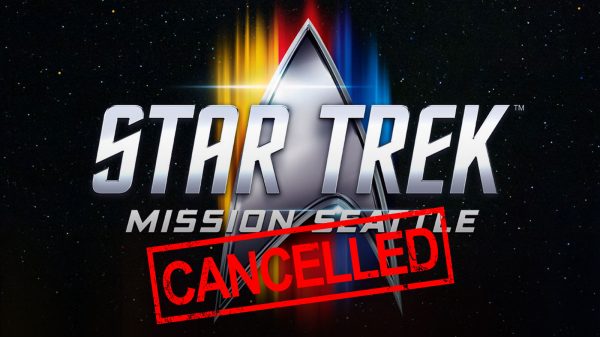
ReedPop’s Star Trek: Mission Seattle convention has been cancelled

56-Year Mission Preview: More than 130 Star Trek guests set to beam down to Las Vegas convention
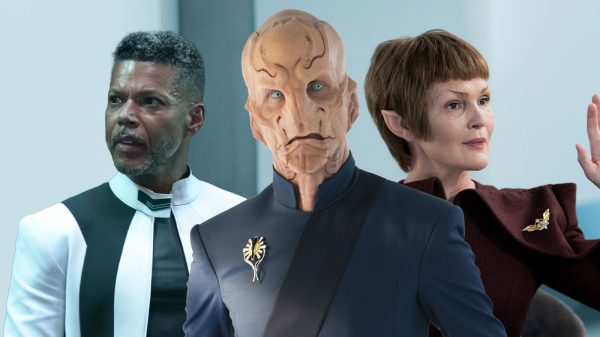
7 new photos from Star Trek: Discovery Season 5 Episode 3 “Jinaal”
![star trek novels reviews 2023: A banner year for Star Trek — here’s why [Op-Ed]](https://treknews.net/wp-content/uploads/2024/01/star-trek-2023-year-in-review-600x337.jpg)
2023: A banner year for Star Trek — here’s why [Op-Ed]
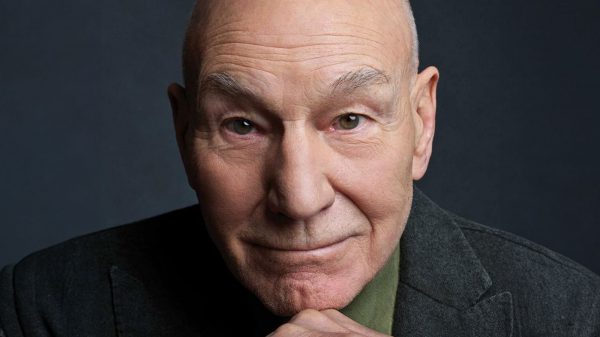
‘Making It So’ Review: Patrick Stewart’s journey from stage to starship
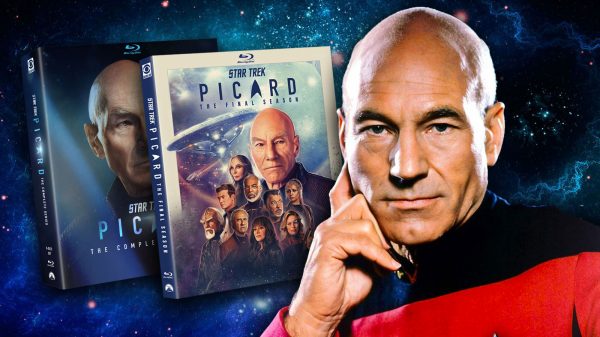
54-Disc Picard Legacy Collection, Star Trek: Picard Season 3, Complete Series Blu-ray box sets announced
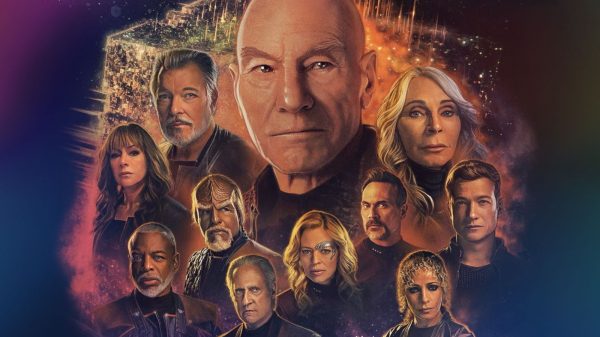
Star Trek: Picard series finale “The Last Generation” Review: A perfect sendoff to an unforgettable crew
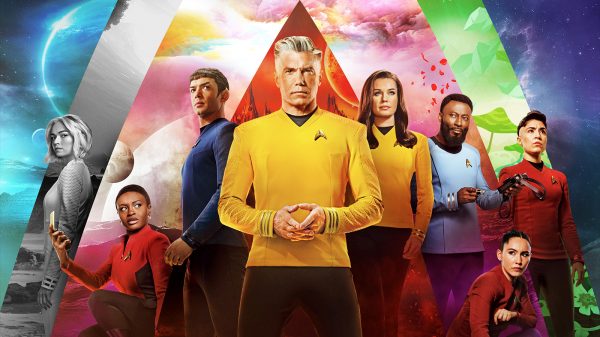
Star Trek: Strange New Worlds arrives on Blu-ray, 4K UHD and DVD this December
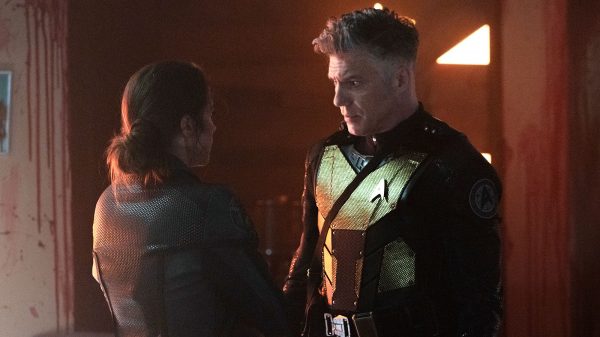
Star Trek: Strange New Worlds “Hegemony” Review: An underwhelming end to the series’ sophomore season
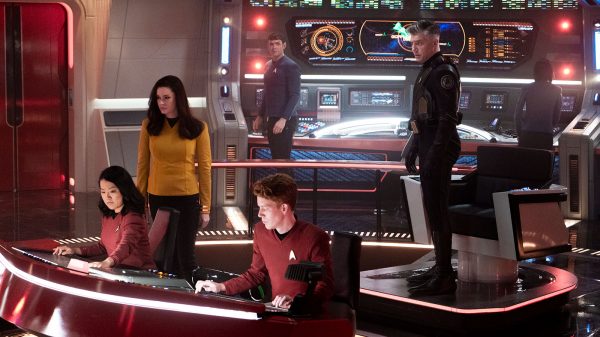
Star Trek: Strange New Worlds season 2 finale “Hegemony” preview + new photos
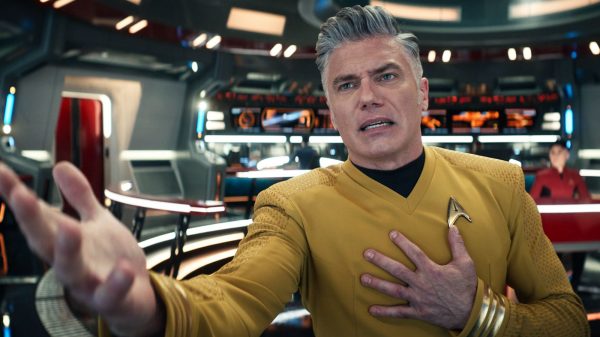
Star Trek: Strange New Worlds 209 “Subspace Rhapsody” Review: All systems stable… but why are we singing?
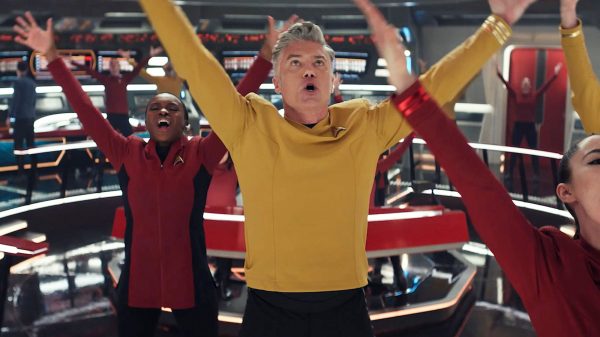
Star Trek: Strange New Worlds “Subspace Rhapsody” preview + new photos
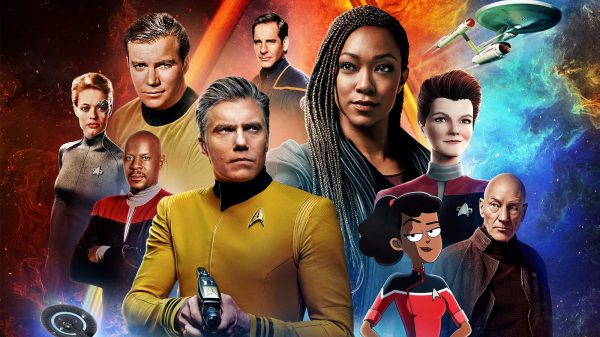
Star Trek Day 2021 to Celebrate 55th Anniversary of the Franchise on September 8 with Live Panels and Reveals

Paramount+ Launches with 1-Month Free Trial, Streaming Every Star Trek Episode
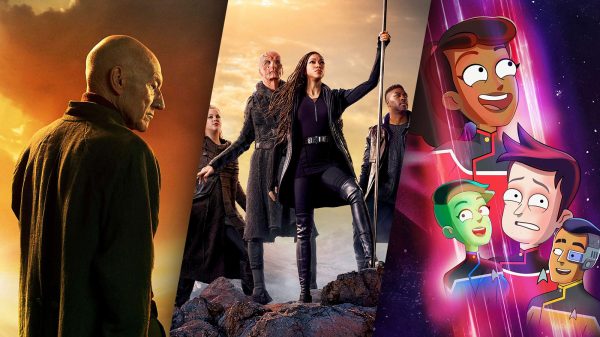
Paramount+ to Officially Launch March 4, Taking Place of CBS All Access
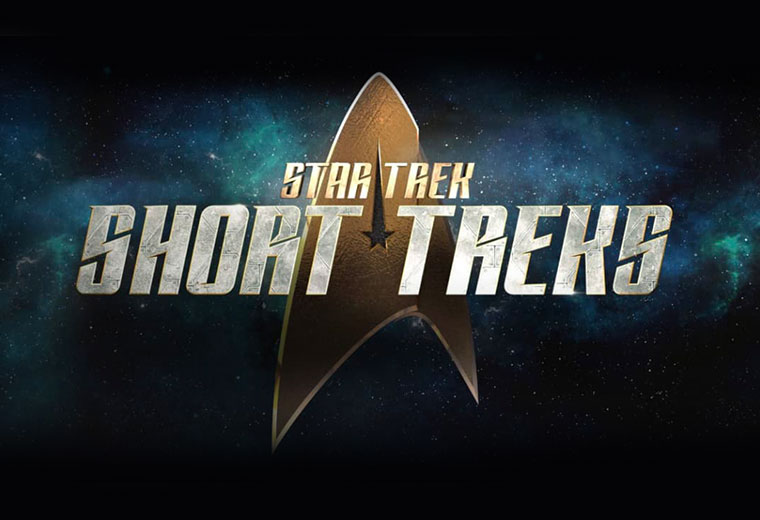
STAR TREK: SHORT TREKS Season 2 Now Streaming For Free (in the U.S.)
![star trek novels reviews [REVIEW] STAR TREK: SHORT TREKS "Children of Mars": All Hands... Battlestations](https://treknews.net/wp-content/uploads/2020/01/review-star-trek-short-treks-children-of-mars.jpg)
[REVIEW] STAR TREK: SHORT TREKS “Children of Mars”: All Hands… Battle Stations
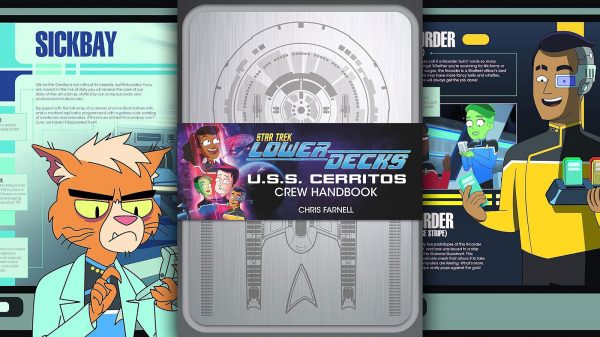
‘U.S.S. Cerritos Crew Handbook’ Review: A must-read Star Trek: Lower Decks fans
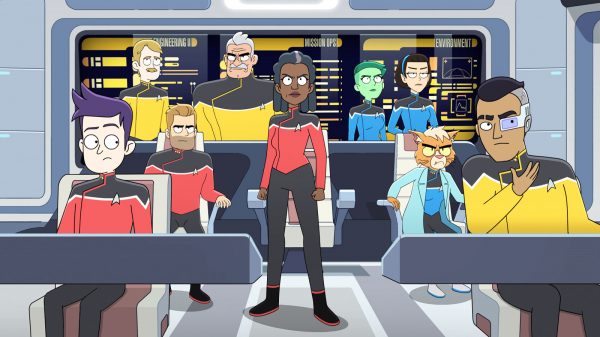
New photos from this week’s Star Trek: Lower Decks season 4 finale
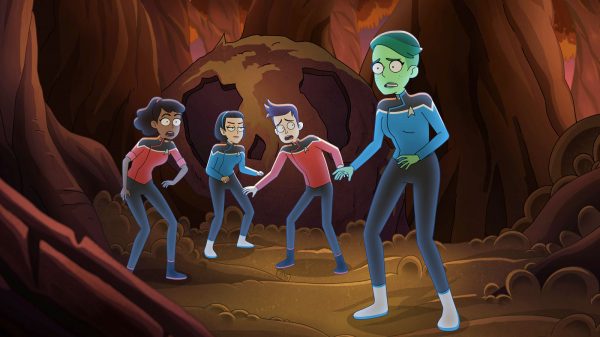
Star Trek: Lower Decks “The Inner Fight” Review: Lost stars and hidden battles
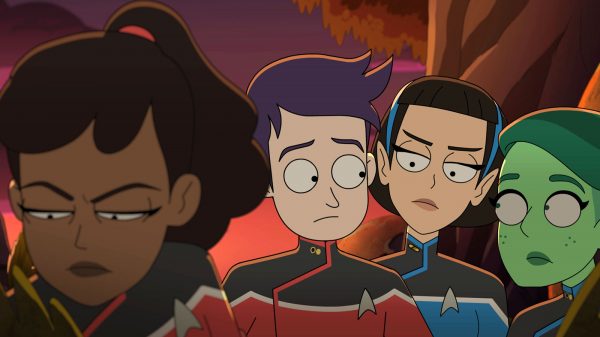
New photos from this week’s episode of Star Trek: Lower Decks
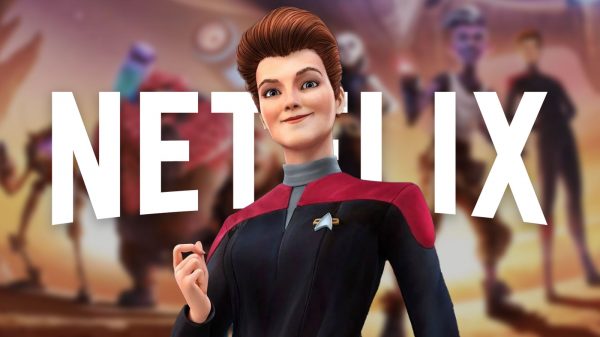
Star Trek: Prodigy begins streaming December 25th on Netflix
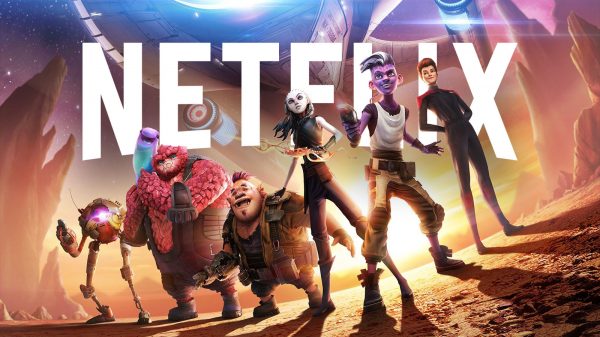
Star Trek: Prodigy lands at Netflix, season 2 coming in 2024
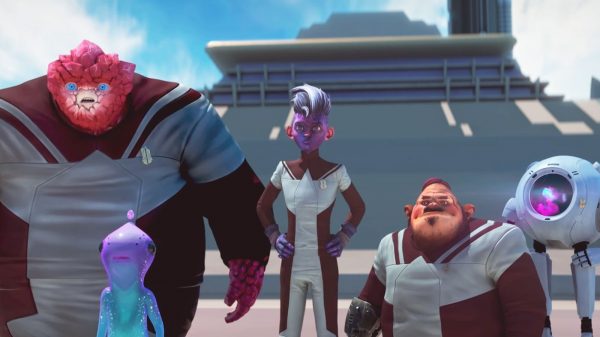
Star Trek: Prodigy Season 2 sneak peek reveals the surprise return of a Voyager castmember
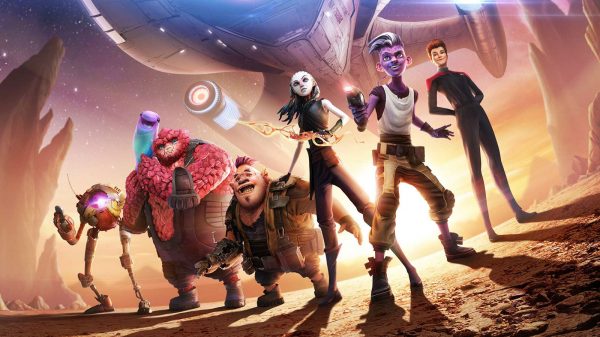
Star Trek: Prodigy canceled, first season to be removed from Paramount+
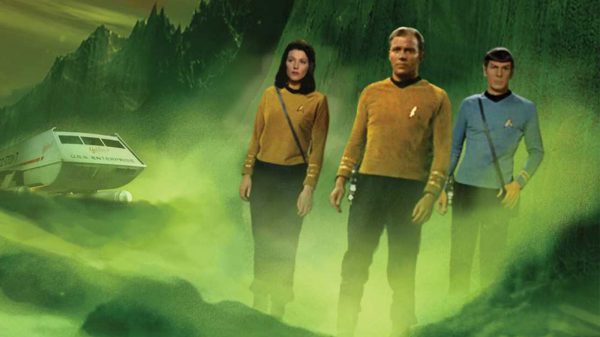
Revisiting “Star Trek: Legacies – Captain to Captain” Retro Review
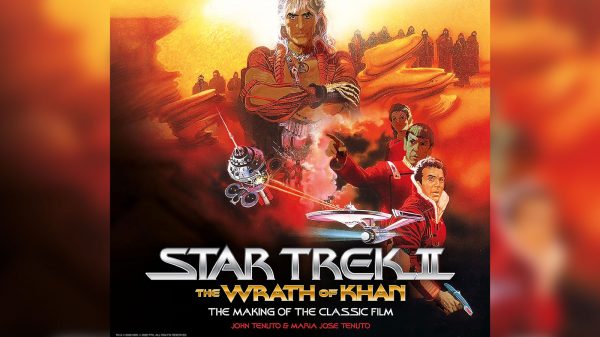
The Wrath of Khan – The Making of the Classic Film Review: A gem for your Star Trek reference collection
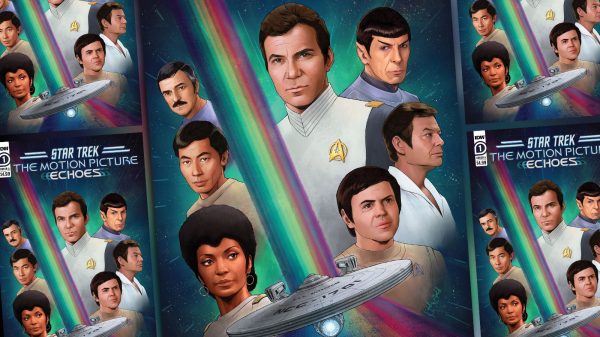
The events of Star Trek: The Motion Picture to continue in new IDW miniseries “Echoes”
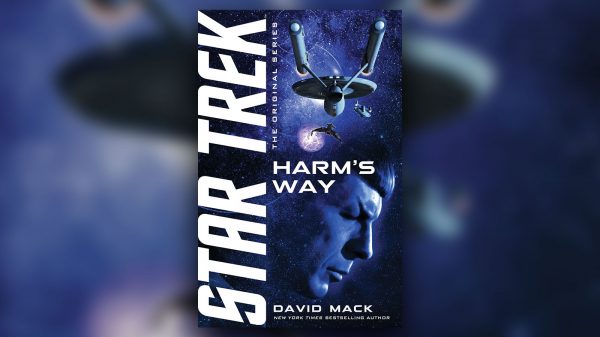
Star Trek: The Original Series “Harm’s Way” Book Review
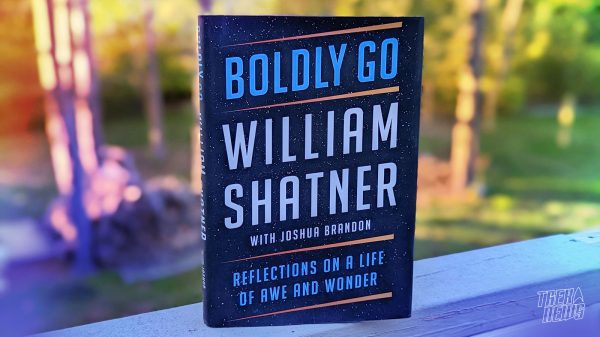
William Shatner’s New Book ‘Boldly Go: Reflections on a Life of Awe and Wonder’ Review: More of a good thing
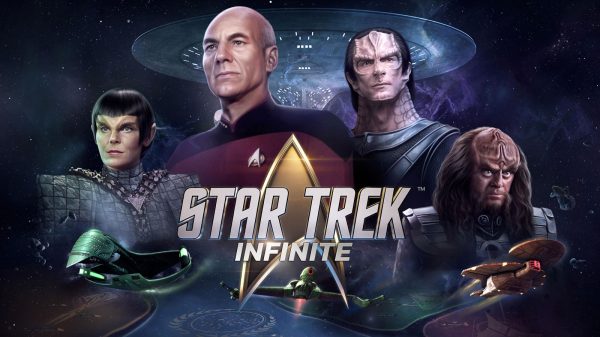
Star Trek: Infinite release date + details on Lower Decks-themed pre-order bonuses
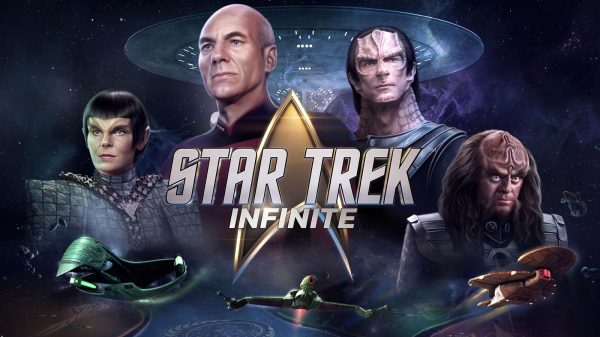
‘Star Trek: Infinite’ strategy game revealed, set to be released this fall
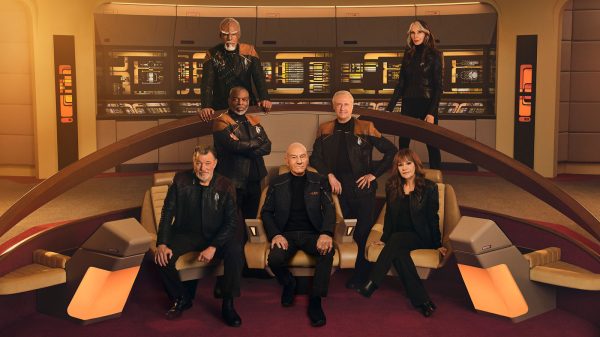
‘The Next Generation’ cast is back on the bridge of the Enterprise-D in new ‘Star Trek: Picard’ photo gallery
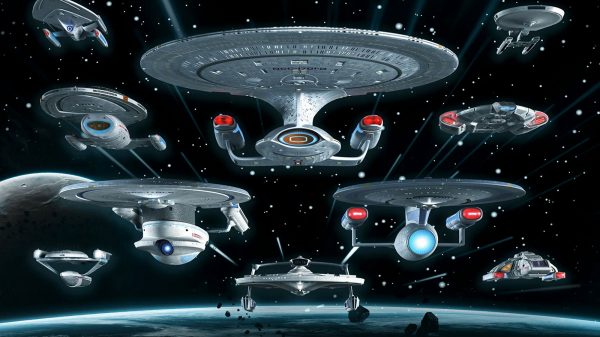
Hero Collector Revisits The Classics in New Starfleet Starships Essentials Collection
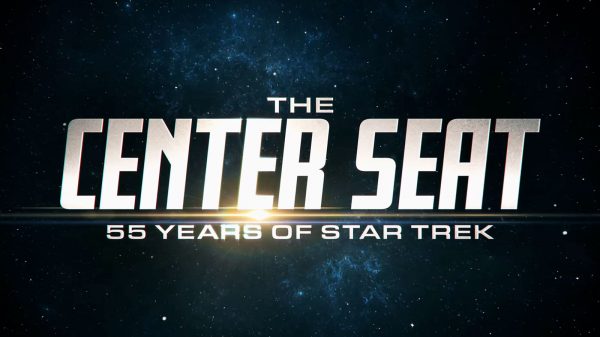
New Star Trek Docuseries ‘The Center Seat’ Announced, Coming This Fall
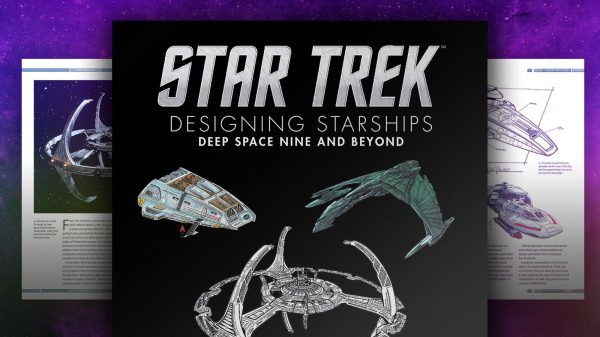
Star Trek Designing Starships: Deep Space Nine & Beyond Review: a Deep Dive Into Shuttlecraft of the Gamma Quadrant
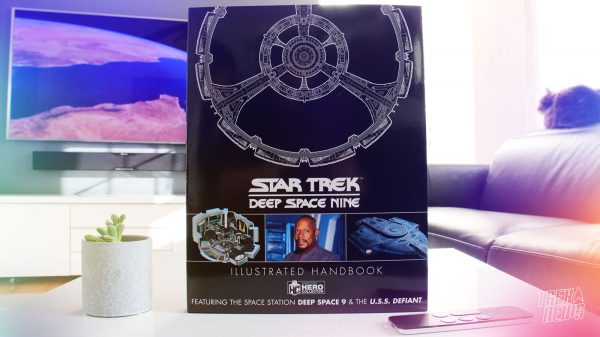
Star Trek: Deep Space Nine Illustrated Handbook Review: Terok Nor Deconstructed in Amazing Detail
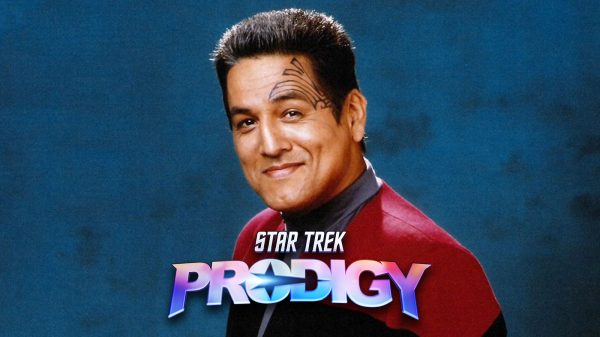
Robert Beltran Is Officially Returning to Star Trek as Chakotay on ‘Prodigy’ + More Casting News
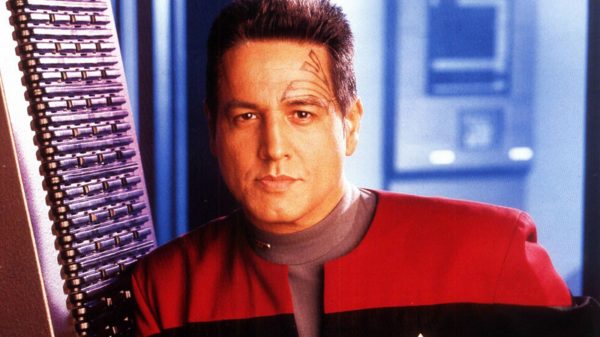
Robert Beltran Says He’s Returning to Star Trek in ‘Prodigy’
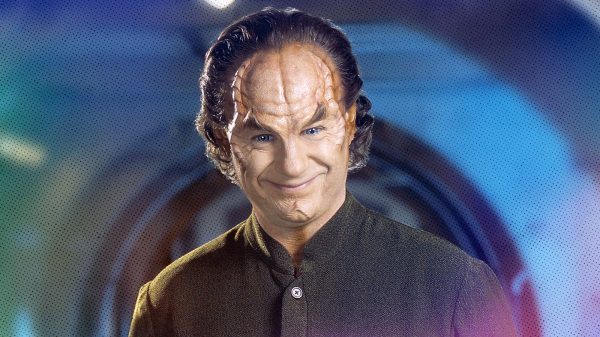
John Billingsley Talks Life Since Star Trek: Enterprise, Going to Space and Turning Down Lunch with Shatner and Nimoy
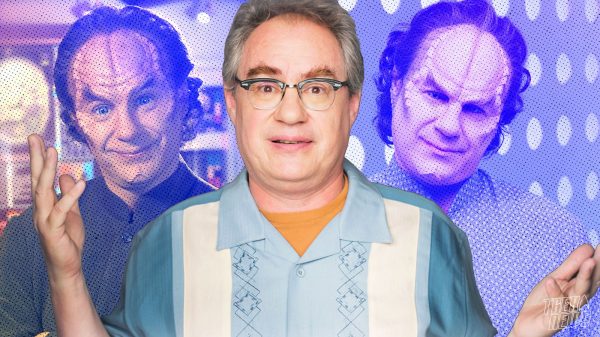
Star Trek: Enterprise Star John Billingsley Talks Charity Work, Upcoming TREK*Talks Event
Preview: Star Trek: Discovery 504 “Face the Strange”
Star Trek: Discovery returns for the fourth installment of the series’ fifth and final season with “Face the Strange” this Thursday, April 18 . The episode is written by Sean Cochran and directed by Lee Rose .
Today, we have a clip along with two new photos from the episode — featuring Eve Harlow as Moll and Elias Toufexis as L’ak.
You can check out the new photos below. Please be aware of some minor spoilers.
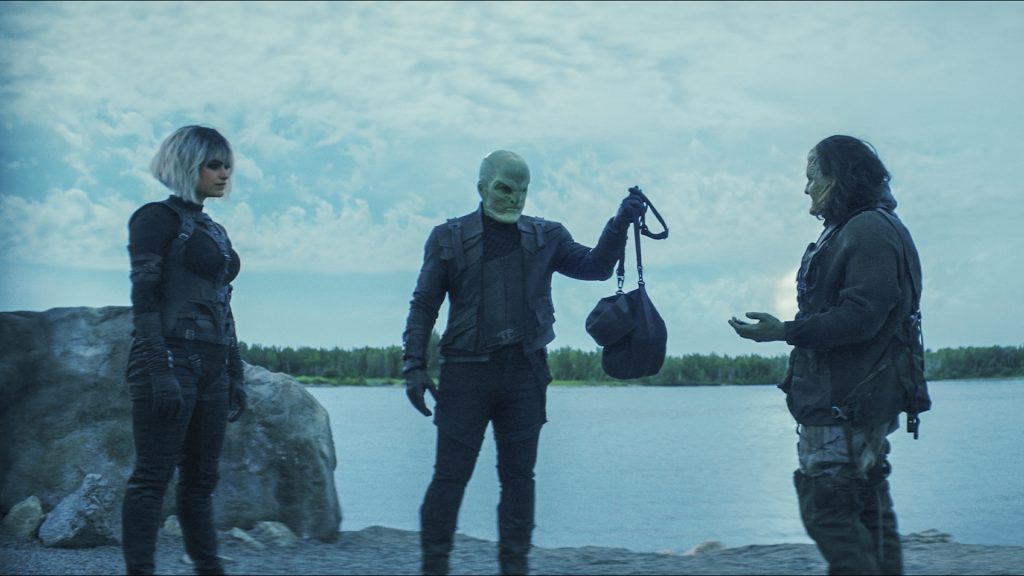
Official description:
On the way to the next clue, the U.S.S. Discovery is sabotaged by a mysterious weapon, leaving Captain Burnham, Rayner, and Stamets as the only crew members who can possibly save the ship in time.
Star Trek: Discovery season 5 castmembers include Sonequa Martin-Green (Captain Michael Burnham), Doug Jones (Saru), Anthony Rapp (Paul Stamets), Mary Wiseman (Sylvia Tilly), Wilson Cruz (Dr. Hugh Culber), David Ajala (Cleveland “Book” Booker), Blu del Barrio (Adira) and Callum Keith Rennie (Rayner). Season five also features recurring guest stars Elias Toufexis (L’ak) and Eve Harlow (Moll).
Stay tuned to TrekNews.net for all the latest news on Star Trek: Discovery , Star Trek: Prodigy , Star Trek: Strange New Worlds , Star Trek: Picard , Star Trek: Lower Decks, and more.
Your email address will not be published. Required fields are marked *
Trending Articles
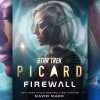
Review: Star Trek: Picard – Firewall Seven of Nine, a heroine who has resurged in popularity thanks to Jeri Ryan’s return to the franchise...
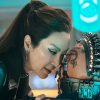
An article celebrating the longevity of the Star Trek franchise has given us our first look at Michelle Yeoh’s upcoming Star Trek: Section 31...
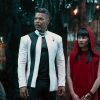
Star Trek: Discovery Season 5 stumbles with “Jinaal” Discovery’s voyage to the ultimate treasure brings Captain Michael Burnham and her crew to Trill, where...
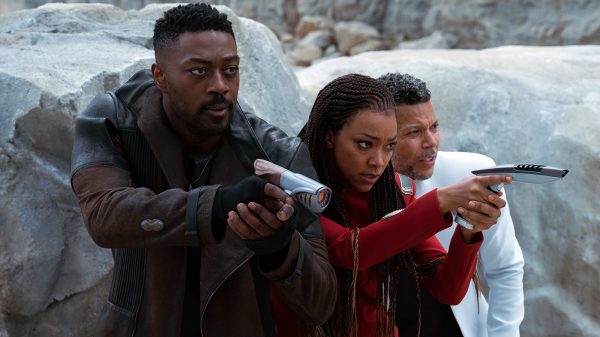
Star Trek: Discovery Season 5 trailer teases Burnham & crew’s final mission
With the launch of the final season of Star Trek: Discovery right around the corner, Paramount+ has released an official trailer for the series’...
- Election 2024
- Entertainment
- Newsletters
- Photography
- Personal Finance
- AP Investigations
- AP Buyline Personal Finance
- AP Buyline Shopping
- Press Releases
- Israel-Hamas War
- Russia-Ukraine War
- Global elections
- Asia Pacific
- Latin America
- Middle East
- Election Results
- Delegate Tracker
- AP & Elections
- Auto Racing
- 2024 Paris Olympic Games
- Movie reviews
- Book reviews
- Personal finance
- Financial Markets
- Business Highlights
- Financial wellness
- Artificial Intelligence
- Social Media
Long-lost first model of the USS Enterprise from ‘Star Trek’ boldly goes home after twisting voyage
The first model of the USS Enterprise is displayed at Heritage Auctions in Los Angeles, April 13, 2024. The model — used in the original “Star Trek” television series — has been returned to Eugene “Rod” Roddenberry, the son of “Star Trek” creator Gene Roddenberry, decades after it went missing in the 1970s. (Josh David Jordan/Heritage Auctions via AP)
Joe Maddalena, executive vice president of Heritage Auctions, left, and Eugene “Rod” Roddenberry, the son of “Star Trek” creator Gene Roddenberry, shake hands over the recently recovered first model of the USS Enterprise at the Heritage Auctions in Los Angeles, April 13, 2024. The model — used in the original “Star Trek” television series — has been returned to Eugene, decades after it went missing in the 1970s. (Josh David Jordan/Heritage Auctions via AP)
Joe Maddalena, executive vice president of Heritage Auctions, left, and Eugene “Rod” Roddenberry, the son of “Star Trek” creator Gene Roddenberry, view the recently recovered first model of the USS Enterprise at Heritage Auctions in Los Angeles, April 13, 2024. The model — used in the original “Star Trek” television series — has been returned to Eugene, decades after it went missing in the 1970s. (Josh David Jordan/Heritage Auctions via AP)
- Copy Link copied
DALLAS (AP) — The first model of the USS Enterprise — used in the opening credits of the original “Star Trek” television series — has boldly gone back home, returning to creator Gene Roddenberry’s son decades after it went missing.
The model’s disappearance sometime in the 1970s had become the subject of lore, so it caused a stir when it popped up on eBay last fall. The sellers quickly took it down, and then contacted Dallas-based Heritage Auctions to authenticate it. Last weekend, the auction house facilitated the model’s return.
Eugene “Rod” Roddenberry, CEO of Roddenberry Entertainment, said he’s thrilled to have the model that had graced the desk of his father, who died in 1991 at age 70.
“This is not going home to adorn my shelves,” Roddenberry said. “This is going to get restored and we’re working on ways to get it out so the public can see it and my hope is that it will land in a museum somewhere.”
AP AUDIO: Long-lost first model of the USS Enterprise from ‘Star Trek’ boldly goes home after twisting voyage.
AP correspondent Margie Szaroleta reports on the return of the original model of the USS Enterprise from the TV show “Star Trek.”
Heritage’s executive vice president, Joe Maddalena, said the auction house was contacted by people who said they’d discovered it a storage unit, and when it was brought into their Beverly Hills office, he and a colleague “instantly knew that it was the real thing.”
They reached out to Roddenberry, who said he appreciates that everyone involved agreed returning the model was the right thing to do. He wouldn’t go into details on the agreement reached but said “I felt it important to reward that and show appreciation for that.”
Maddalena said the model vanished in the 1970s after Gene Roddenberry loaned it to makers of “Star Trek: The Motion Picture,” which was released in 1979.
“No one knew what happened to it,” Rod Roddenberry said.
The 3-foot (0.91-meter) model of the USS Enterprise was used in the show’s original pilot episode as well as the opening credits of the resulting TV series, and was the prototype for the 11-foot (3-meter) version featured in the series’ episodes. The larger model is on display at the Smithsonian’s National Air and Space Museum.
The original “Star Trek” television series, which aired in the late 1960s, kicked off an ever-expanding multiverse of cultural phenomena, with TV and movie spinoffs and conventions where a fanbase of zealous and devoted Trekkies can’t get enough of memorabilia.
This USS Enterprise model would easily sell for more than $1 million at auction, but really “it’s priceless,” Maddalena said.
“It could sell for any amount and I wouldn’t be surprised because of what it is,” he said. “It is truly a cultural icon.”
Roddenberry, who was just a young boy when the model went missing, said he has spotty memories of it, “almost a deja vu.” He said it wasn’t something he’d thought much about until people began contacting him after it appeared on eBay.
“I don’t think I really, fully comprehended at first that this was the first Enterprise ever created,” he said.
He said he has no idea if there was something nefarious behind the disappearance all those decades ago or if it was just mistakenly lost, but it would be interesting to find out more about what happened.
“This piece is incredibly important and it has its own story and this would be a great piece of the story,” Roddenberry said.
Thankfully, he said, the discovery has cleared up one rumor: That it was destroyed because as a young boy, he’d thrown it into a pool.
“Finally I’m vindicated after all these years,” he said with a laugh.

COMMENTS
Simon and Schuster. It's easier to refer to this bulk recommendation as "The Khan Trilogy." The first two novels are formally titled "The Eugenics War: The Rise and Fall of Khan Noonien Singh ...
As of November 2019, approximately 850 novels, short story anthologies, novelizations, and omnibus editions have been published. Star Trek books are often ignored (sometimes rightly so) by review sites like Kirkus Reviews and Publishers Weekly, so you'll have to decide for yourself if a certain book sounds like your cup of Earl Grey tea (hot).
Nonfiction Star Trek Books Federation: The First 150 Years, David A. Goodman. This is the history of the first 150 years of the United Federation of Planets. The Star Trek Encyclopedia, Michael and Denise Okuda. A newly revised, 2-book set is to be released on October 18, 2016 with about 300 pages of new and expanded entries, up to and including Into Darkness.
344 books based on 265 votes: Imzadi by Peter David, Uhura's Song by Janet Kagan, Spock's World by Diane Duane, Yesterday's Son by A.C. Crispin, The Vulc...
The Mirror Universe Series. The Mirror Universe is a dark reflection of the Star Trek universe we know and love, and the source of endless "evil twin" plots. Basically, everything is its opposite. In the Mirror Universe, the tolerant and peace-loving United Federation of Planets is actually the xenophobic and warlike Terran Empire.
Star Trek: Coda: Book III - Oblivion's Gate - David Mack, 2021. This book is one of the most recent entries in the Star Trek literary universe; in fact, in one sense, it's the final one. Yes, you should probably read the first two entries in this amazing trilogy — Moments Asunder and The Ashes of Tomorrow — first, but the third book ...
It is a bit harder to find high-quality books which still cover the core elements of the Star Trek Universe as a whole. The best I can find is Surak's Soul by J.M. Dillard. Giving the limelight to Enterprise's only Vulcan character allows some discussion on the role Vulcans played in Earth's earlier space adventures.
Hello everyone, For those people who have watched the Original Series many times and would like a taste of what other adventures the crew of the Enterprise experienced, a fan-based, crowd-funded group (CBS-approved, provided they do not make money from it) has made additional episodes in the spirit of the Original Series under the title: Star Trek Continues.
The last Star Trek novel of 2022 turns out to be its best - and that's saying something in a year that had an amazing book by Una McCormack (Star Trek Picard: Second Self) and a fun and ...
The first Star Trek: Strange New Worlds novel — The High Country by John Jackson Miller — is one of the best Star Trek novels published in years. Perfectly capturing the Strange New Worlds characters and aesthetic, Jackson Miller weaves a high adventure tale that is a lot of fun, and has a number of surprising connections to the Star Trek canon that deepen and enrich the story as a whole.
Review: Star Trek: Coda - Book 1 "Moments Asunder" If you picture Moments Asunder and by extension the Star Trek: Coda trilogy, to be for the Star Trek literary universe (sometimes called ...
David Mack's Harm's Way is at once a tense submarine cat and mouse drama between two classic Star Trek characters, and also an overly violent gore fest that has a few interesting ideas that are mostly lost among pages and pages of mass death. Running from 2005 to 2012, the Vanguard series of novels from authors David Mack, Dayton Ward, and ...
Star Trek #19 Pleroma Part 1. Wednesday is always new comic day, and this week we have a new addition to IDW's flagship Star Trek comic series, and the beginning of a new story arc!. Star Trek #19 is out today, and in the Pleroma arc, Captain Sisko must deal with an issue that hits very close to home when T'Lir returns to the Theseus.. Check out the various covers below, along with links to ...
With the major characters in Star Trek (as in any long-running series) being mostly immune from a visit by the Grim Reaper, being able to dispose of a couple of major canon characters early on, including one version of Wesley adds to the shock and awe factor of the books. The body count in Book 2 - Ashes of Tomorrow is even higher.
The author's world-building also feels strong, with very few elements that feel out of place in Star Trek. The secondary plot deals with a new deadly contagion spreading through the crew, which was coincidentally timely as I read the novel while the world was in the midst of the Covid-19 lockdown of 2020.
In-depth critical reviews of Star Trek and some other sci-fi series. Includes all episodes of Star Trek: The Original Series, The Animated Series, The Next Generation, Deep Space Nine, Voyager, Enterprise, Discovery, Picard, Lower Decks, Prodigy, and Strange New Worlds. Also, Star Wars, the new Battlestar Galactica, and The Orville.
Review: Star Trek: The Original Series - Harm's Way There are some creative minds who we just implicitly trust when it comes to Star Trek. You can be sure you're in for a decent episode if ...
There have been Star Trek novels almost as long as there's been a show. The earliest books to take place in the Star Trek universe were released as early as 1967, and the trend continues right up ...
Star Trek - A Celebration. Written by Ben Robinson and Ian Spelling. Hardcover | $23.08. Published by Eaglemoss/Hero Collector | 256 Pages. Writing a book about Star Trek: The Original Series ...
This year's second Kelvin Timeline Star Trek novel — David Mack's More Beautiful Than Death — continues to explore Captain Kirk and the crew of the alternate USS Enterprise following the events of the 2009 film.. Like Alan Dean Foster's The Unsettling Stars, released earlier this year, More Beautiful Than Death was originally written a decade ago, shelved, and has now finally seen ...
1. Star Trek: Deep Space Nine (1993-1999) Everett Collection. Placing Star Trek: Deep Space Nine in the top spot is perhaps a contentious decision. However, this series did more than measure up ...
Back to the Stars: Rediscovering Star Trek's Legacy with Captain to Captain - A Retro-Review There are near-countless Star Trek novels out there. Unlike the production of movies, episodes, or ...
In February 1970, Bantam Books published the first original Star Trek novel. James Blish's Spock Must Die! received mixed reviews from critics, but it laid the foundation for many hundreds of ...
In-depth critical reviews of Star Trek and some other sci-fi series. Includes all episodes of Star Trek: The Original Series, The Animated Series, The Next Generation, Deep Space Nine, Voyager, Enterprise, Discovery, Picard, Lower Decks, Prodigy, and Strange New Worlds. Also, Star Wars, the new Battlestar Galactica, and The Orville.
This Star Trek: Discovery review contains spoilers.. Star Trek: Discovery Season 5 Episode 4. Time travel has been a staple of science fiction ever since the genre was invented.
The following contains spoilers from Star Trek: Discovery, Season 5, Episode 4, "Face the Strange," now streaming on Paramount+. Producers said that Season 5 wasn't supposed to end the series, yet this episode is a perfect addition for its final mission. By using time travel as a framing device, the ...
STAR TREK: DISCOVERY Review — "Face the Strange". by Claire Little, Executive Officer (In Charge of Radishes) ˙. April 18, 2024. ˙. 63. ˙. 18. Moll and L'ak's attempts to sabotage Discovery's efforts finally succeed and Burnham, Rayner, and Stamets are sent jumping through time where they have to face their pasts — and their ...
Stream on Paramount+. Taking place almost a decade before Captain Kirk's Enterprise, the USS Discovery charts a course to uncover new worlds and life forms. Release Date. September 24, 2017. Cast ...
Preview: Star Trek: Discovery 504 "Face the Strange" Star Trek: Discovery returns for the fourth installment of the series' fifth and final season with "Face the Strange" this Thursday ...
1 of 8 | . The first model of the USS Enterprise is displayed at Heritage Auctions in Los Angeles, April 13, 2024. The model — used in the original "Star Trek" television series — has been returned to Eugene "Rod" Roddenberry, the son of "Star Trek" creator Gene Roddenberry, decades after it went missing in the 1970s.